BURGESS HILL GIRLS. SIXTH FORM









































The decision a parent or pupil makes over where to spend the last two years of school can have immense implications for that pupil’s entire future. Parents will ask themselves a number of complex and challenging questions: will the setting teach in the right way, provide the right opportunities, incubate the right personal values and ethics, and in short allow my daughter to become everything that she is capable of being? A pupil will have her own questions to add: will I have new opportunities, make new friends, get to study new subjects and explore new activities, and will I be something more, something different and distinct from myself in Year 11? The Sixth Form at Burgess Hill Girls can answer yes to all these questions.
Our students enjoy a friendly environment where academic support in small class sizes is second to none. Independence is championed in every aspect of Sixth Form life: lessons encourage innovative and original thinking; cocurricular activities offer new and exciting opportunities; and our expert Sixth Form tutor team provide outstanding pastoral support and academic guidance throughout the Lower and Upper Sixth. Our academic programme supports over 20 different A level courses, each being highly valued by universities around the world. Our class sizes allow for intensive and exceptionally well-supported lessons, with dedicated and experienced subject experts teaching in every classroom. This ensures that each and every student gains the subject knowledge and analytical skills necessary to achieve the highest grades. We are consistently rated as the leading school in West Sussex, and each year our students leave our Sixth Form to take up places at highly competitive institutions.
Every student in our Sixth Form also completes the Extended Project Qualification. This independent research project is invaluable for enhancing the skills and attributes required for a young person to succeed in life. As well as its
tangible value to universities, who can be more generous to those completing it, it instils the resilience, independence and analytical skills that are essential for later success. We offer a dedicated classroom-based programme to support the project and give our students one-to-one support throughout to ensure it is completed to the highest possible standards. We achieved 82% A*-B, and 62% A*-A.
Our Sixth Formers are actively encouraged to think about their future careers. University remains by far our most popular destination for leavers but we are seeing an increasing number embarking on school leaver programmes; in recent years, students have successfully gained positions at KPMG and GlaxoSmithKline. Our Sixth Form team provides excellent guidance and advice and prides itself on finding the right course and the right university for each student or indeed the right role in the right business sector.
Key to a healthy learning attitude and a healthy mind is a healthy approach to activity. Outside of lessons, our students enjoy broad and varied enrichment opportunities alongside the compulsory, self-selecting physical education programme.
Through our innovative BOLD Programme, our sixth formers are encouraged across every area to be hardworking, curious, innovative, ambitious, and forward-thinking. They explore their subjects with passion, develop a level of intellectual excellence and confidence, and take every opportunity to expand on their experiences. They are, in every way and through every means, Bold Girls.
Mr Iain Regan Smith, Head of Sixth Form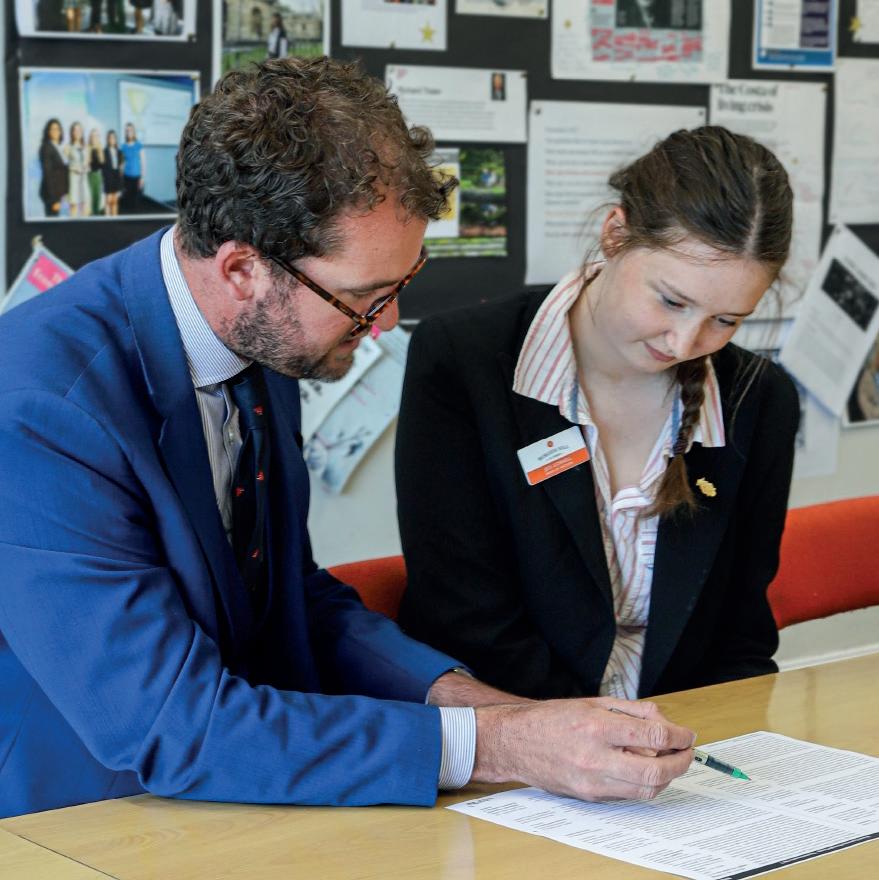
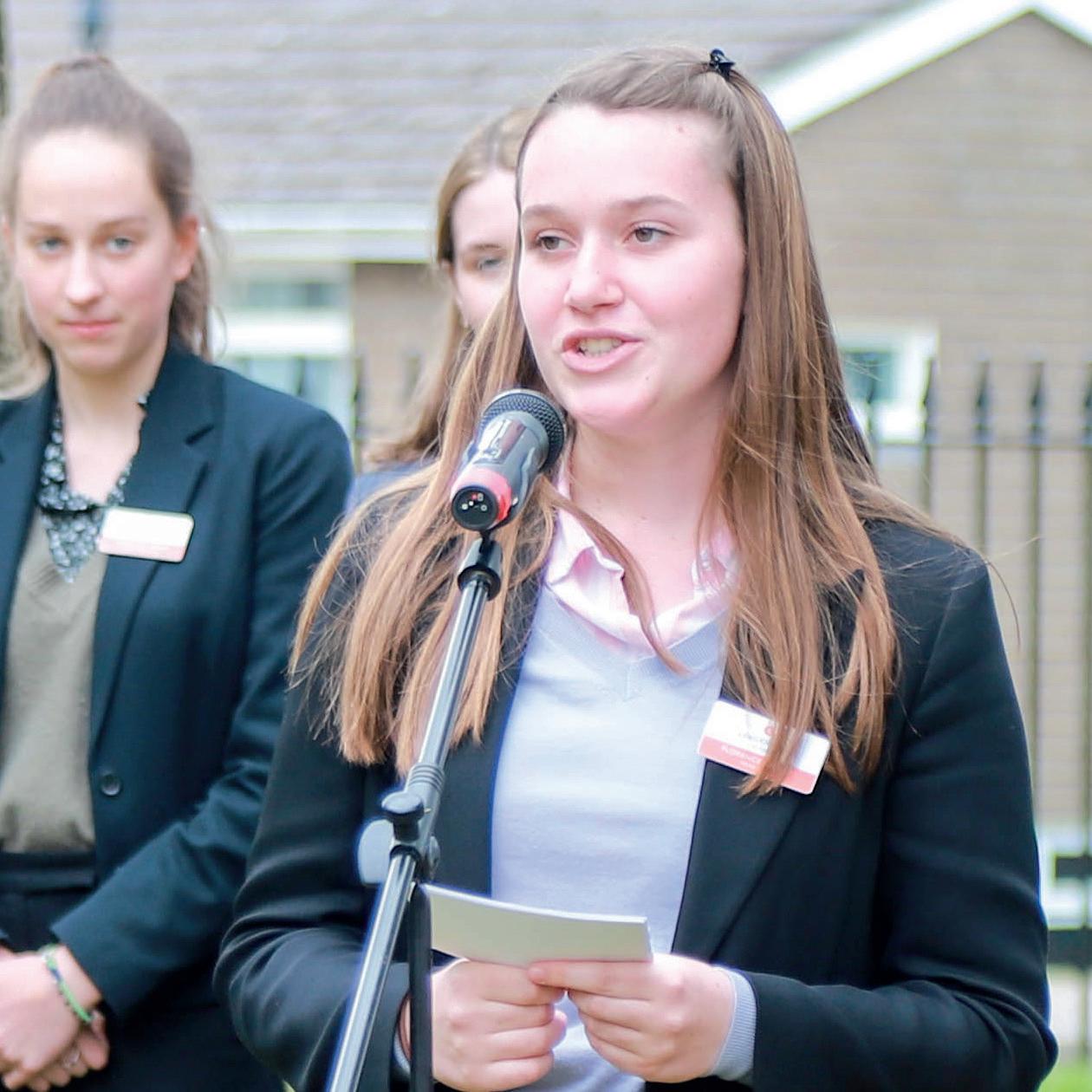

Burgess Hill Girls Sixth Form empowers you to push your boundaries and seize opportunities, inspires you to be a leader, and allows you to discover the knowledge and skills with which to build your future. No matter what you are looking for – from community and opportunity to academic excellence, leadership experience and independence –Burgess Hill Girls offers it all.
The challenges of navigating online learning in the face of a global pandemic emphasised to us all the importance of community and the relationships built between pupils, teachers and staff – and these relationships are at the heart of everything we do at Burgess Hill Girls. With our small class sizes, your teachers and peers truly get to know you as an individual, and there is always a teacher, your personal tutor or the Head of Sixth Form available to listen to you and give you individual attention and advice. This is especially important now, as you make the decisions that will determine the shape of your future – and while these decisions may seem daunting at the moment, our pupils and teachers are all here to support and encourage you.
They will also challenge you; I have enjoyed moving from intensive considerations of hydrocarbons in Chemistry to thorough analysis of poems in English, knowing that in each lesson I was working at the very highest of levels with exciting, informed and dedicated students. A major benefit of our sixth form is that it teaches only A levels, the highly demanding academic qualifications built to support university applications, and our results are excellent. Every year, Burgess Hill girls use this academic credibility to join the most competitive universities in Britain and around the world.
In addition, our all-girls environment helps all of us to dispel any stereotypes that might be attached to subjects. We are empowered to pursue excellence equally in the humanities
and the sciences, with Bold Girls serving as successful role models in the careers we seek to join.

Being an all-through, all-girls school, we can also foster a close-knit wider community. Not only do we offer countless opportunities to form friendships with girls from a range of age groups and interests, but your position as a sixth former will also allow you to take on meaningful positions of leadership. These could be formalised roles such as a school officer or less formal roles in areas of personal interest, including directing interhouse performing arts or running a co-curricular club.
While there will be many serious moments during your time at sixth form, there is also plenty of opportunity for fun and laughter. The diverse environment generated by a unique blend of day and boarding students allows lifelong friendships to be formed – be it bonding over tea in the common room between studying, playing football on the astro in the pouring rain, or getting dressed up to attend prom together. Burgess Hill Girls gives you a place to belong.
I could never put into words all that Burgess Hill Girls has done for me or what it could do for you. All I can do is encourage you to give every opportunity a go at Burgess Hill Girls. While you may not excel at everything you try, every experience during your time at the school will help you grow and discover who you want to be in the future. At Burgess Hill Girls your personal journey will be championed and celebrated, wherever it may lead.
Florence Stapley, Former Head GirlEvery school has the responsibility to ensure that their students are as prepared as possible for the lives they will lead after leaving. Our exceptional performance in GCSEs and A levels ensures that our sixth formers have a range of opportunities and options for the next stage of their education and career, and that they are equipped and empowered to choose their own paths. Through the broader skills support Burgess Hill Girls Sixth Form provides, we can ensure they are thoroughly prepared for the range of challenges the future will bring. In a world with numerous higher education qualifications, our girls can further mark themselves out in their profession as highly capable and resilient leaders.
Discussions over the nature of schooling and the types of skills schools should instil have been launched anew in response to the developing ‘fourth industrial revolution’ – where communications technology and increasing connectivity will overhaul the nature of the workplace.
Skills such as creativity, originality and initiative, critical thinking, persuasion and negotiation will retain or increase their value, as will attention to detail, resilience, flexibility and complex problem-solving. Additionally, emotional intelligence, leadership and social influence will only become more important in the workplace. These challenges require schools to reformulate their own curriculum, so that students can meet the demands of the future.
With the recent modifications to A levels, and the resulting changes to the exam expectations in Lower Sixth, we have taken the opportunity to develop our own model of what a complete Sixth Form curriculum should be.
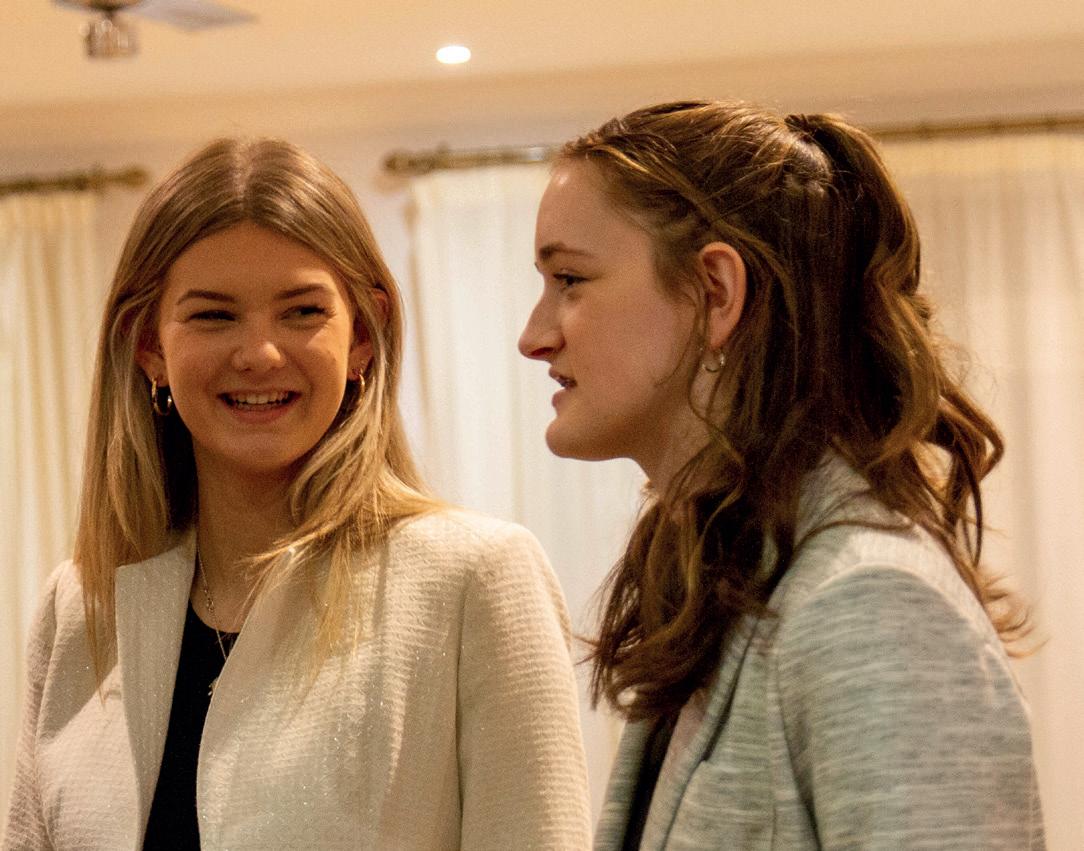
The BOLD Programme is how we prepare our sixth formers for the evolving and ever-changing demands of the world. This programme will equip our girls with the skills necessary for them to thrive in their professional and personal lives. It will ensure that our girls leave Burgess Hill Girls equipped with not only exceptional academic qualifications, but with the social, interpersonal and leadership skills required to excel in every capacity in their future.
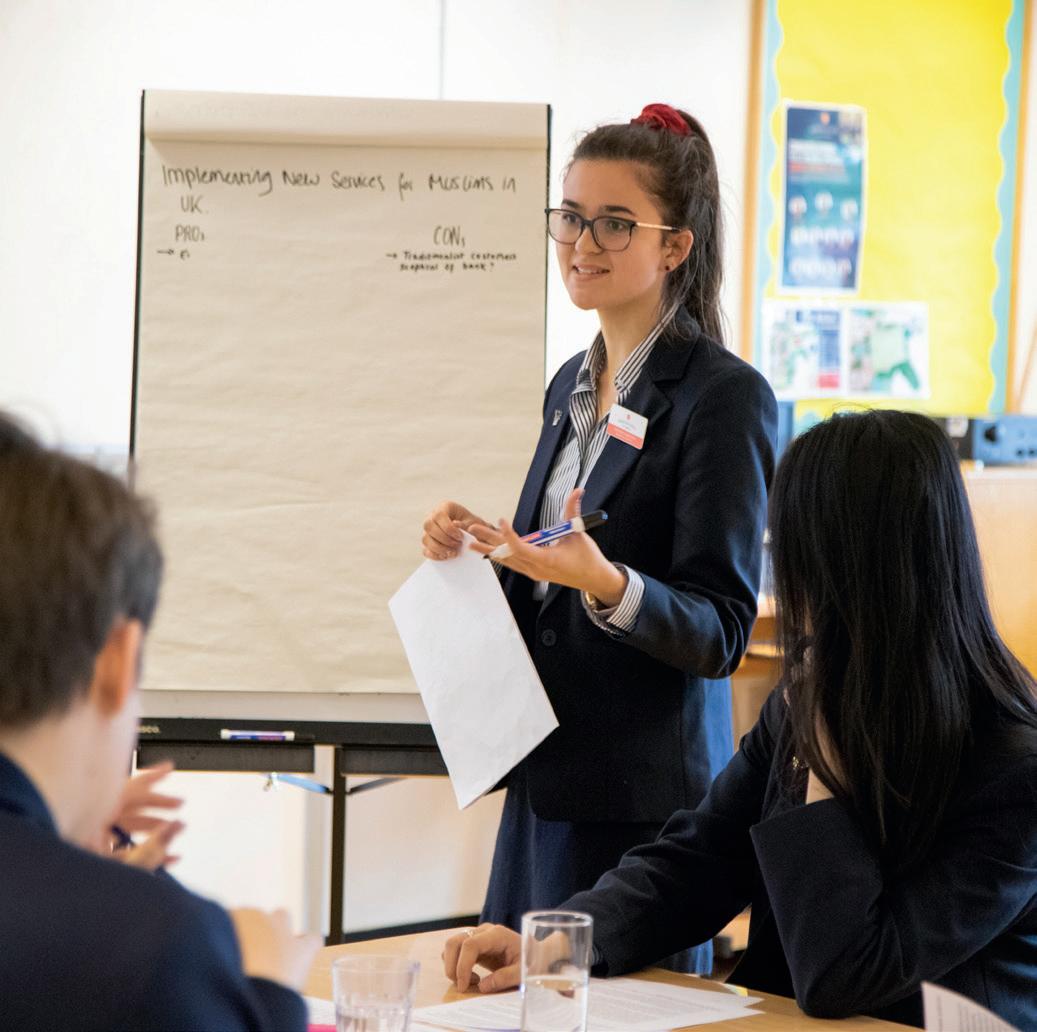
Our core academic offer ensures that girls can study three of the most valuable A levels to ensure they meet the demands of the most competitive academic degrees. Through the Extended Project, girls have the time and space to think innovatively and independently.
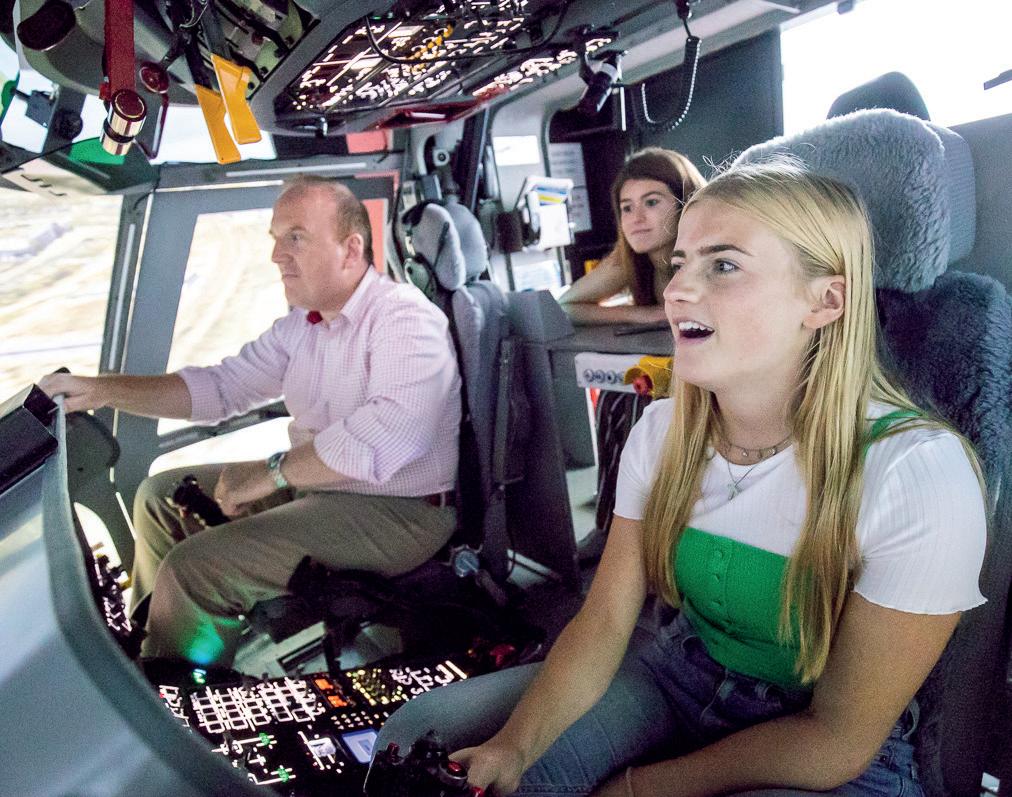

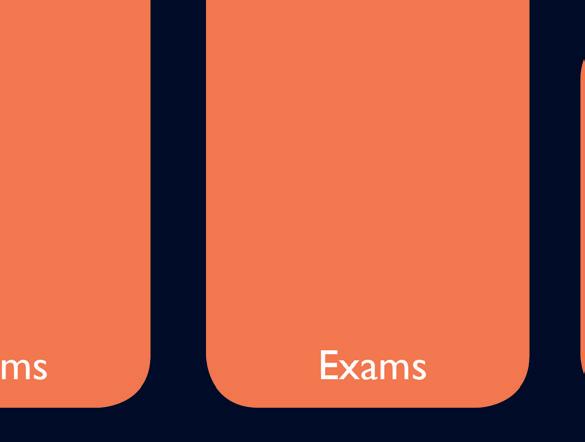
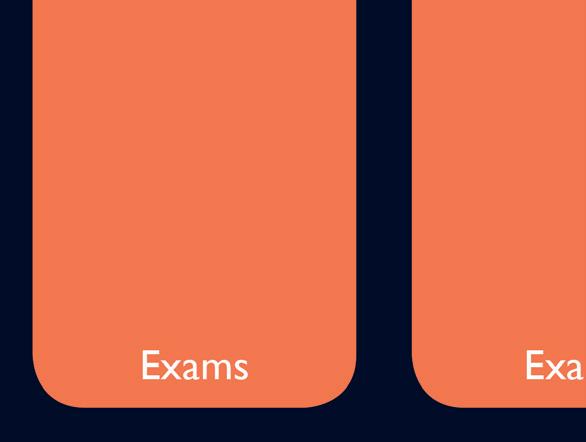
Around this, through tutorial sessions, assemblies, classroom-based training and with the provision of outside speakers and trainers, we will deliver a programme focused around four key themes:



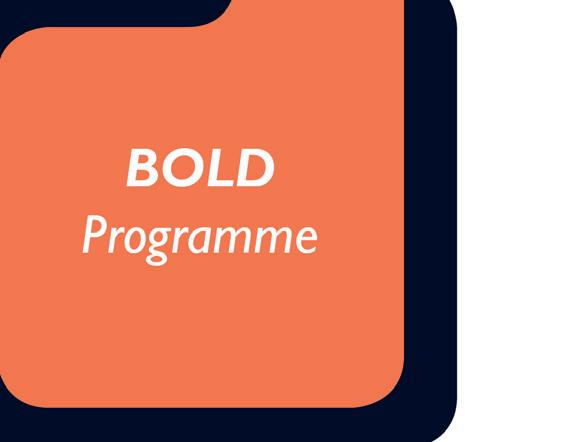
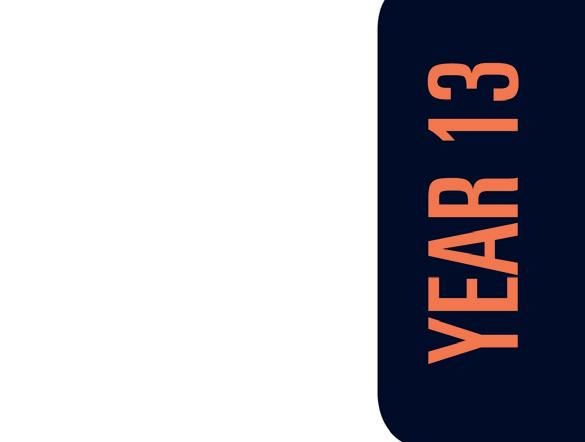
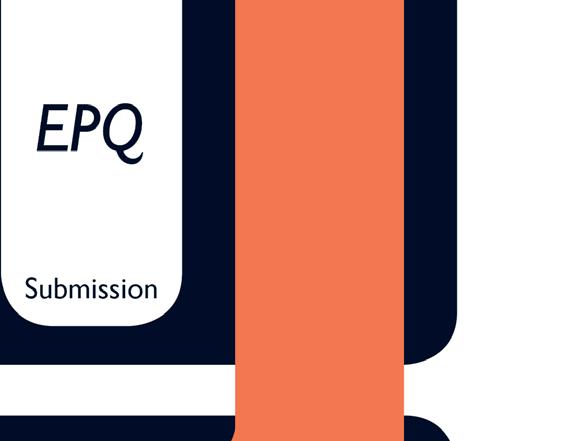
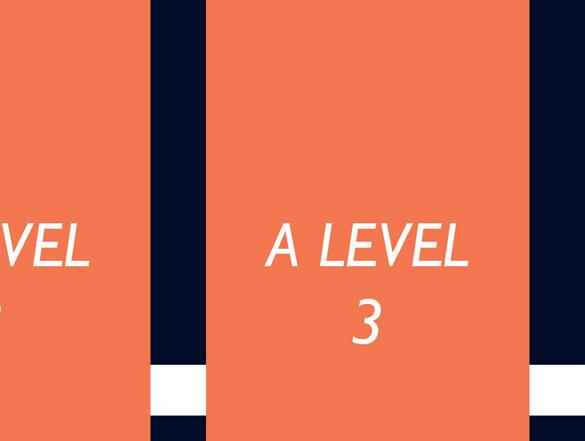
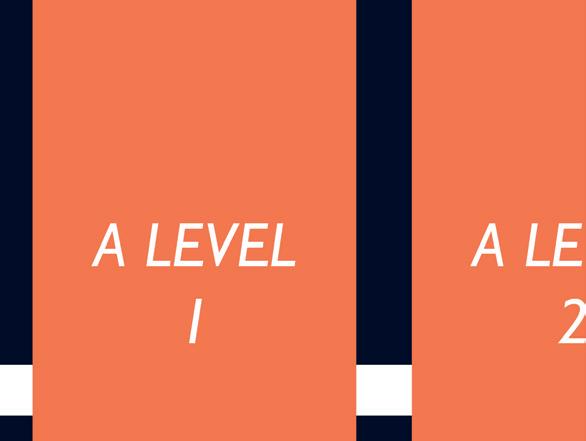





Going Beyond:
By going beyond, Burgess Hill Girls Sixth Formers engage in informed and evidenced super-curricular activities, from reading and research to work experience and immersive opportunities. Tutors will advise and guide girls through this additional engagement, ensuring that girls take the lead in their own learning, developing their initiative and exploring their own interests to the fullest.
Exploring Opportunities:
Exploring opportunities covers the necessary research and engagement that give the Sixth Form girls the best understanding of the world beyond school, and how they will take their place in it. From thorough and comprehensive training on UCAS, to time given over to university visits and course research, our girls will be fully informed on all options that follow their A levels.
Taking Leadership:
Taking leadership involves our girls taking on opportunities to develop and practise leadership skills in preparation for life beyond school. It also includes the dedicated Leadership Training residential trip to Scotland in the weeks after GCSE exams.

“Busy girls do best!”
Mrs Lewis - Director of Sport
Personal development covers the opportunities available in the Sixth Form for girls to enhance their personal attributes. Included in it are the Sixth Form VIVAs, which will allow for regular student evaluation against professionally and academically informed criteria, allowing students to receive valuable feedback on their capacity for self-reflection and critical thinking.

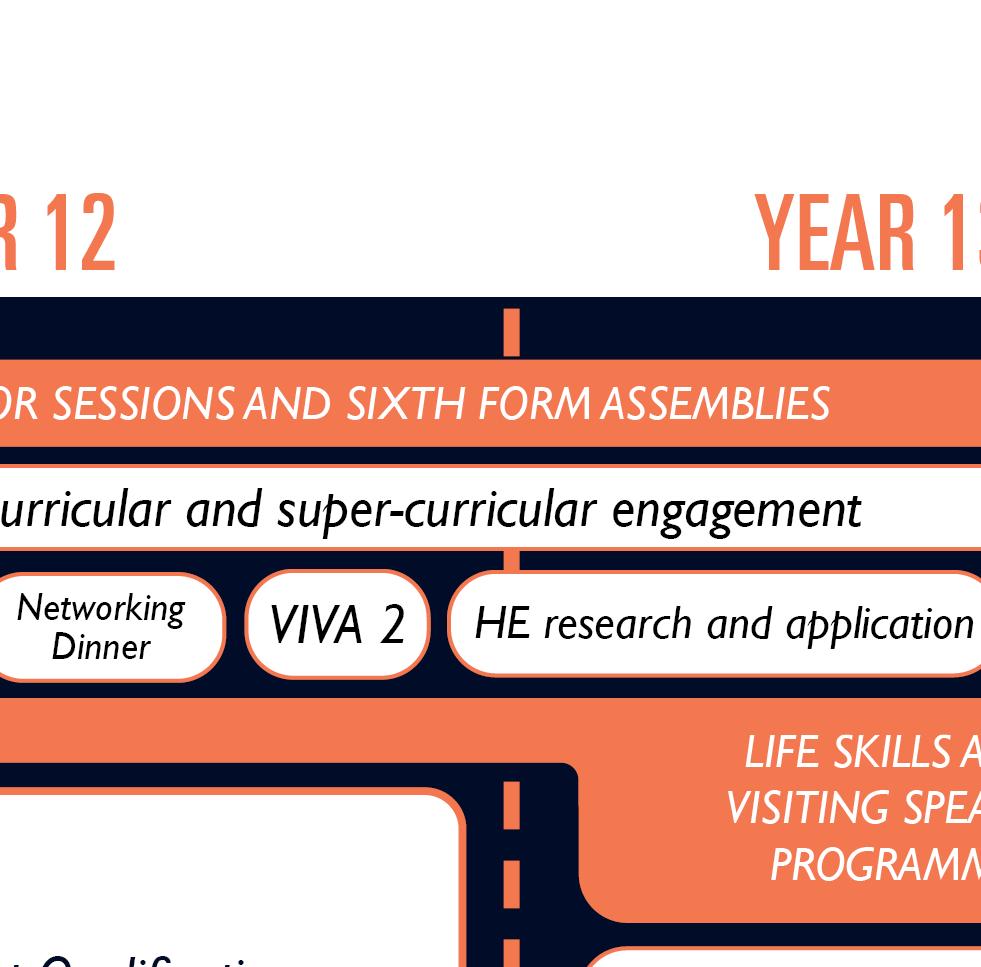
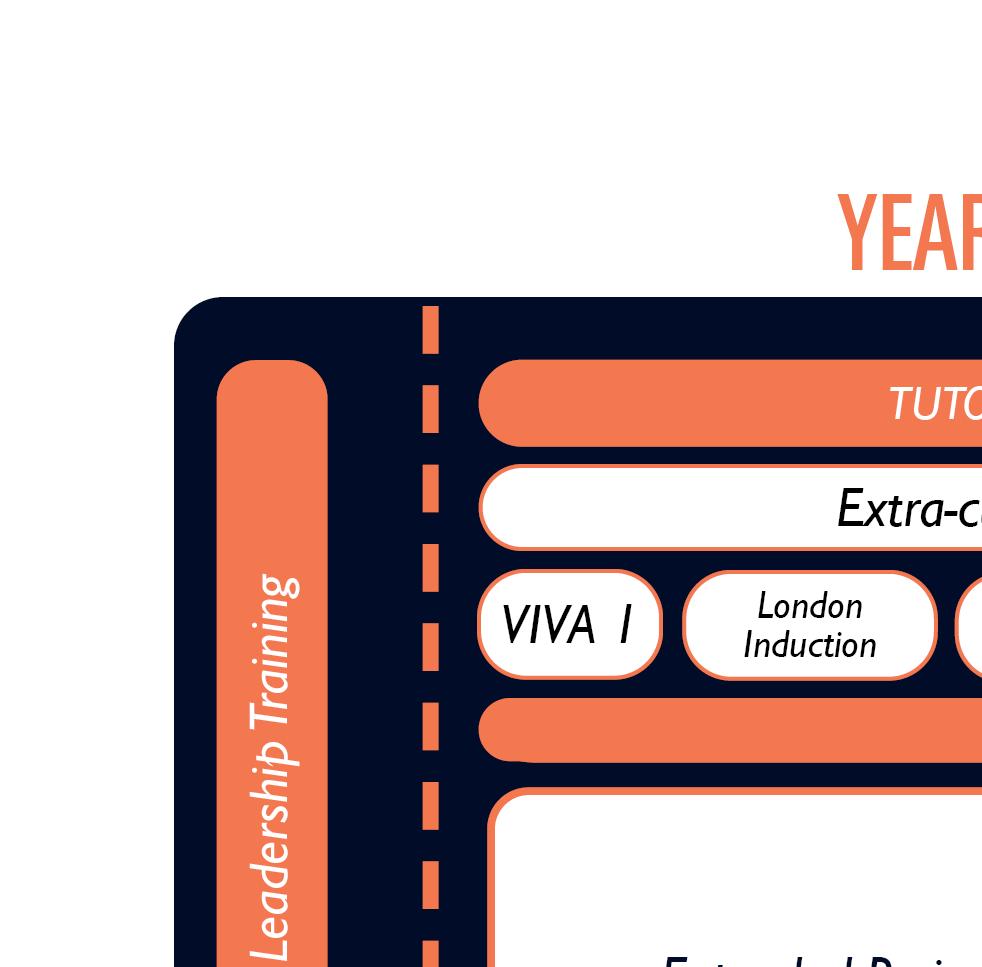
The Programme also involves an induction trip to London, and the ‘BOLD Abroad’ residential trip to Washington DC in Year 12. In the first week of the Easter holiday, girls will visit this global city and undertake activities and events that will build their global mind-set, broaden their horizons, enhance their varied subject expertise and develop their cultural, social and political literacy.

Through this Programme, our sixth formers will leave this school with the knowledge, the skills and the personal attributes that will ensure they can take on and excel in every opportunity that follows. Each will have become, in every way, a Bold Girl.

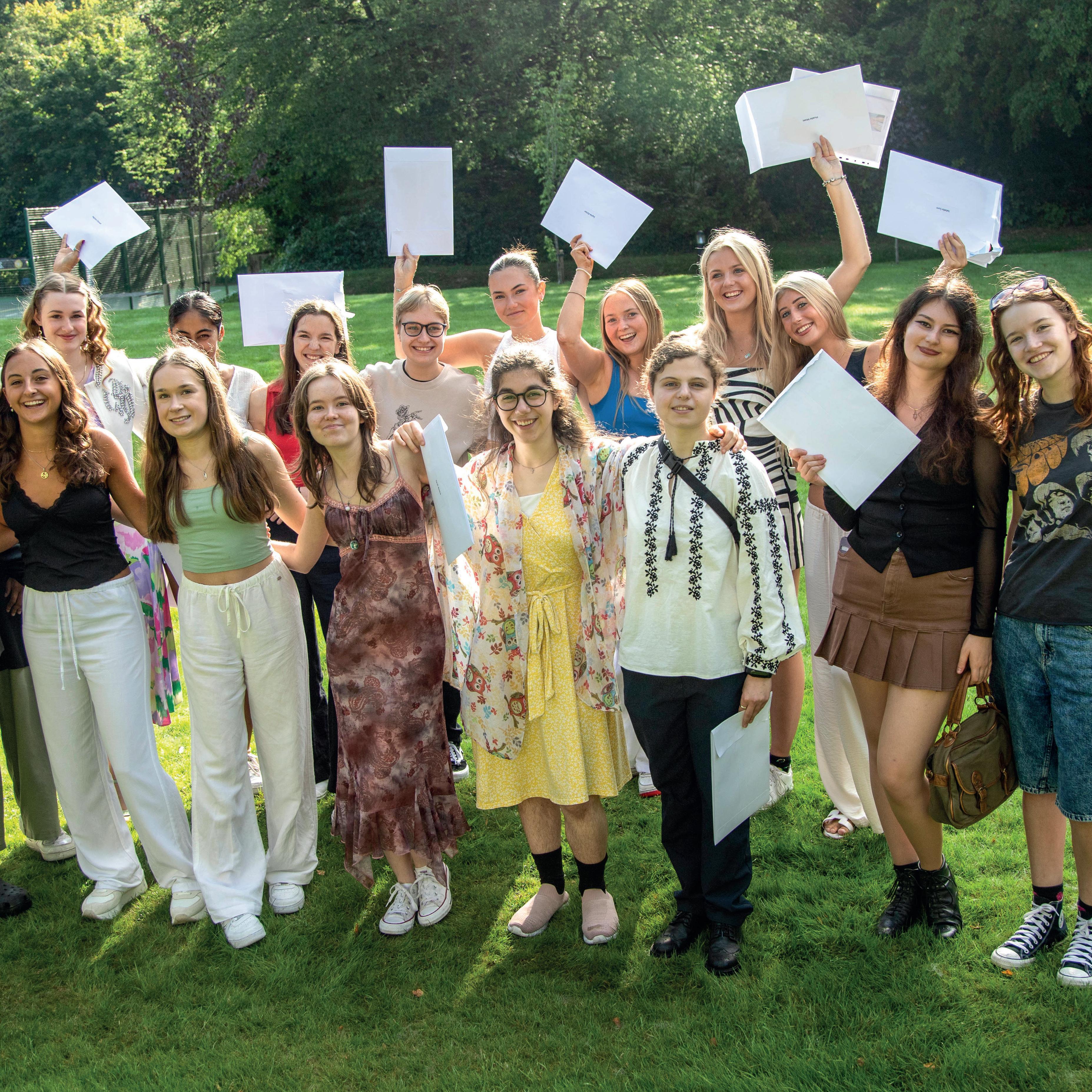
At Burgess Hill Girls, we believe in the immense value of single-sex education for girls. In our single-sex Sixth Form, we can champion the specific and wide-ranging benefits such an institution can have for our students.
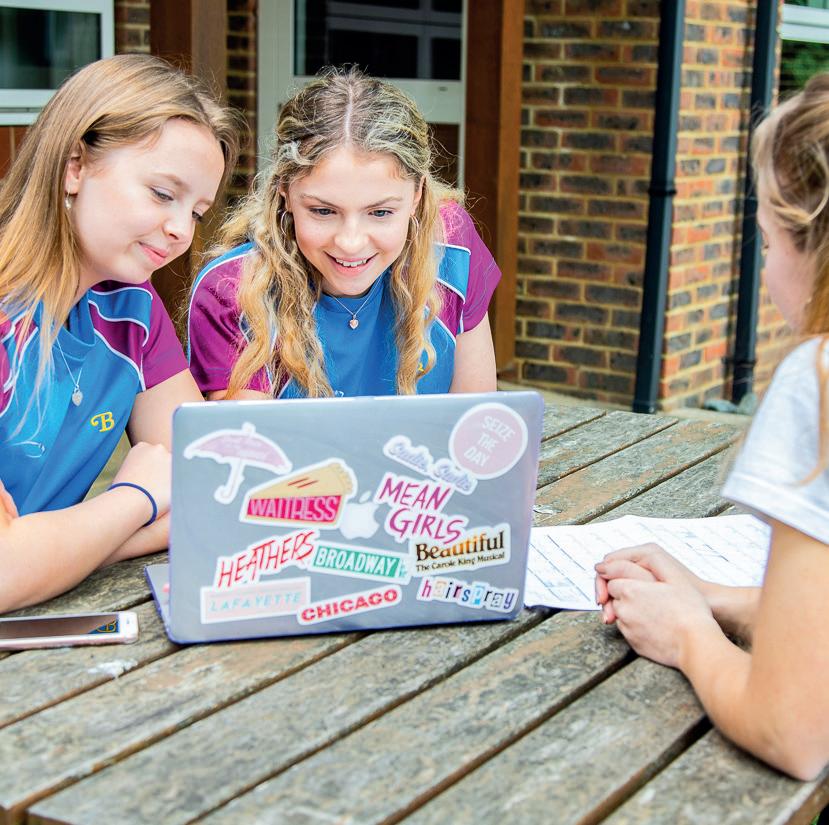


There are profound benefits of single-sex education for girls at Sixth Form, both in the breadth of subjects taken and in terms of academic performance. We know that in single-sex schools girls are more likely to choose subjects that they might shy away from in mixed settings, and achieve highly in those subjects when taught alongside other girls. Subject uptake for A levels at Burgess Hill Girls shows this, with a strong cohort of girls taking a wide variety of subjects, with a noteworthy strength in the Sciences and Mathematics.
The evidence is also clear on how girls achieve better results in their public examinations across all subjects in single-sex schools. This is of especial importance when it comes to A levels, ensuring girls excel as they should in all subjects, giving them access to the opportunities they deserve. Our teachers are highly skilled and deeply experienced at teaching girls, and our tutors at supporting them, encouraging our students to work to the very highest of standards, as well as to balance their work ethic with vibrant opportunities outside the classroom.
We have the means to build on the boundless curiosity of girls at every possible opportunity. Every student is encouraged to take on roles and responsibilities outside the classroom and embrace every opportunity, building the ambition and confidence that secures success in the next stage of their life. We build an environment of acceptance, resilience, leadership and ambition, where girls can build the skills and attributes necessary for success beyond Sixth Form. Our consistently outstanding results and the quality and variety of destinations our students go on to after leaving us prove the value of what we do.
In a girls-only sixth form, we can engage fully with the social currents that surround the girls in our care. We have created a dedicated and bespoke programme of support and guidance tailored specifically to the needs of young women. We build the skills necessary for girls to unleash their abilities and cover the topics relevant for them to gain a full and informed understanding of their place in the world and how they can change it.
We know that our students benefit enormously from the opportunities afforded by single-sex schools, and we are proud to celebrate the possibilities such a sixth form can provide for young women.
Our Sixth Form understands the immense demands and sometimes overwhelming challenges faced by young women between ages 16 and 18, and we pride ourselves on providing excellent pastoral care. We have a highly skilled team of experienced, specially chosen tutors who offer bespoke one-to-one support throughout the Lower and Upper Sixth. Tutors are the key component in championing and encouraging our students and closely monitor wellbeing and academic performance through careful and considerate tutoring with timely and sensitive intervention. Tutors see their tutees every day, and are the first point of contact between parents and the School. At any time the tutor has the best all-round understanding of each student’s wellbeing.

Tutors support the exceptional academic education provided by our subject teachers with dedicated guidance that builds confidence, resilience and independence.
Our main aim is to establish the right balance between independence and dependence for our students. Throughout their A levels, our girls gain in confidence when they are able to confront issues and solve problems themselves.
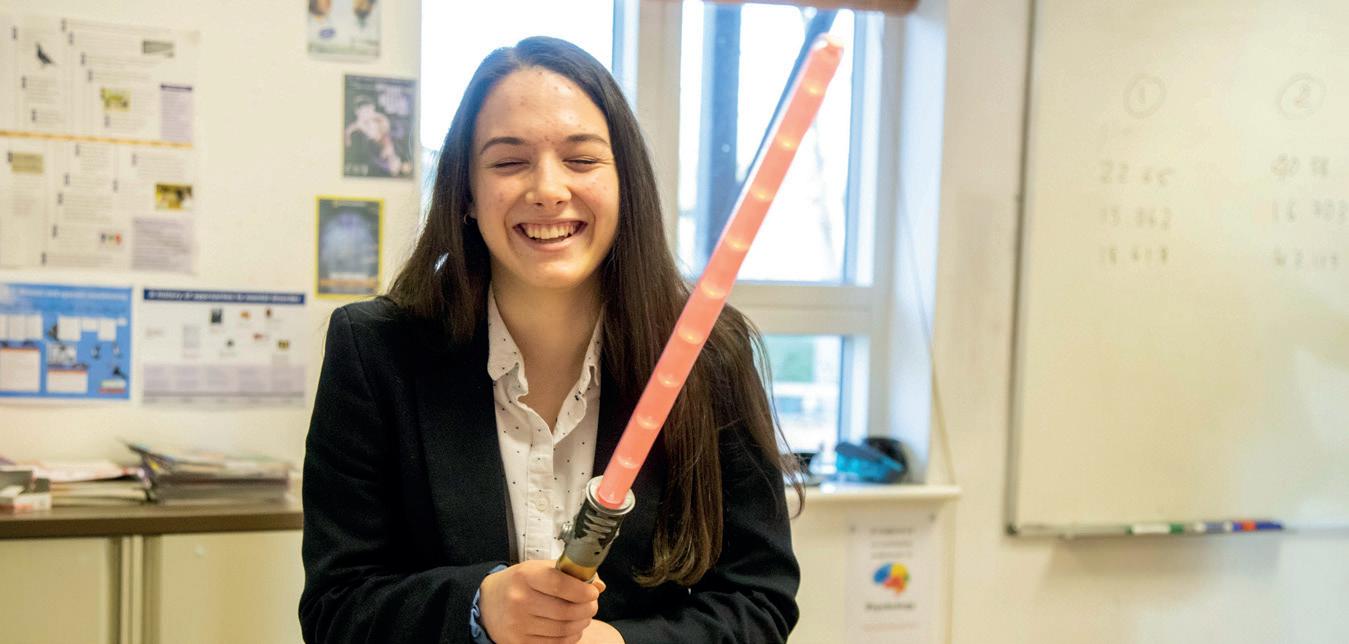
Tutor groups within the Sixth Form contain no more than ten students; groups are small enough to allow students and tutors to get to know each other well. With small class sizes and tutor groups, our community is very close-knit; students share in each other’s successes and support one another on a daily basis. The girls and our tutors are supported by the Sixth Form pastoral team, comprising the Head of Sixth Form and Deputy Head of Sixth Form, as well as by the School’s wider pastoral network, which includes the School’s Head, Assistant Head Pastoral and Boarding, the on-site School Nurse and School Counsellor. The School also provides access to an independent listener for any student who wishes to talk to an independent adult about personal challenges or concerns at school, and a native speaker for those whose first language is not English. Tutors maintain a detailed overview of academic progress and general wellbeing and work closely with the Head of Sixth Form to ensure that parents, teachers and students are fully informed and working well together at all times.
The sixth formers are encouraged to support their own wellbeing with effective management of classwork and other pursuits within Cedar Lodge, our dedicated Sixth Form centre. The Head and Deputy Head of Sixth Form are on hand to offer support and guidance whenever it is required. Students are also encouraged to take ownership over their own space in the Sixth Form – the Lower and Upper Sixth common rooms are shared spaces for socialising, relaxing and working. Each has a kitchen, shared working areas, and space for casual conversations.
The Extended Project Qualification is an independent research project of an A level standard completed by all Burgess Hill Girls sixth formers. As well as being enormously rewarding and of immense educational value, the EPQ is warmly welcomed by the universities and can determine whether offers are made, or lead to more generous grade requirements. This is because the project shows a student’s willingness to take on an independent academic challenge and provides evidence of their commitment to a course of higher education.
For the student, completing the project extends and deepens their knowledge of a topic of interest and can help them confirm their intentions for higher education or training. There may be a topic a student is really interested in but they have had no opportunity to pursue further. Maybe they know what they want to study at university and the EPQ would be a great way to research into it and show their knowledge at interview – for example, architecture, law, or speech and language therapy. Beyond the value for applications, students develop transferable skills such as essay construction, analysis and evaluation of raw data that might not be a key element of their A level subjects, but will be of invaluable later in life.
The EPQ is all about the process of putting together a piece of academic work. Students can choose to write a 5,000 word essay, make an artefact supported by a shorter essay or put on a performance and write up an analysis of the work.
Regardless of their choice, the structure will have the same three parts:
First, a production log documented electronically on the ‘Project Q’ website. This is written over the course of six months and records a student’s progress as they develop their project. It will act as a record of their decision making, time management and reflection.
Second, the essay or artefact itself. Most titles take the form of a question and the students respond to that question, backing their arguments up with evidence from academic research. Selection and evaluation of the quality of their chosen research is one of the key skills they will develop.
Finally, a presentation is completed after the essay has been written. It is presented to an audience of the student’s choice but must include their supervisor. The aim is to give an overview of the project to a non-specialist audience explaining what was researched and what was concluded.
To support students to achieve the highest grades, Burgess Hill Girls gives EPQ students 30 hours of tuition in key skills such as selection of resources, time management, analysis of data, referencing, as well as one-to-one meetings with an allocated supervisor.
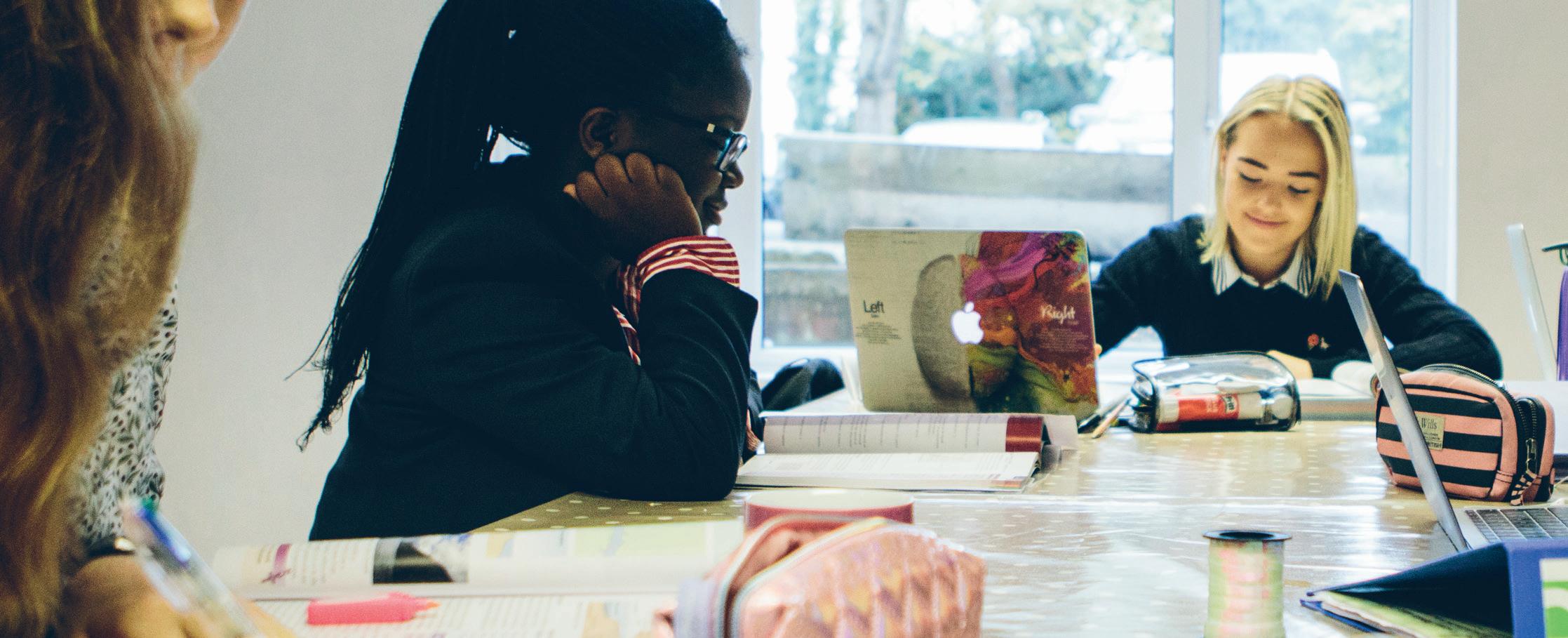
“From 2018-2023, 95% of students have secured A/A* in the EPQ”
Mrs Scopes - Deputy Head of Sixth Form
Our higher education team consists of the Head of Sixth Form, Deputy Head of Sixth Form and Head of Futures, who lead and support the Sixth Form Tutors.
We offer detailed guidance and advice to our students, assisting them with their research into suitable academic and career opportunities. University course searches are enabled through the excellent services of UCAS, Which? and Unifrog.
Sixth Form tutors meet annually to review the changes within the higher education and employment sectors. Appropriate training is given to staff joining the team which allows them to assist effectively with personal statements, references, choice of university and course or apprenticeship or gap year applications.
Vocational cocurricular clubs - including LawSoc and MedSoc - provide specific support and insight into the professions and offer leadership opportunities for interested sixth formers.
Whilst most Burgess Hill Girls apply to university, our Sixth Form team is very keen for students to consider all post-16 options, exploring school leaver programmes and apprenticeships. In recent years, this has led to Upper Sixth students joining prestigious organisations such as GSK and KPMG. Information is also readily available on relevant undergraduate scholarships, for instance the Institute of Mechanical Engineers.
Students are kept informed with open day and university taster course opportunities and are actively encouraged to spend part of the summer holidays in the Lower Sixth, or earlier if possible, involved in activities and work experience which will enhance any applications they will make in their second year.
The Networking Dinner provides an excellent opportunity for the Lower Sixth to meet and network in a semi-formal context with professionals in fields which closely match the expressed interests of the students.
Our assistance with personal statements and references is second to none and our help often lasts beyond the Sixth Form. As a relatively small and close-knit community, we are able to dedicate a significant amount of time per student to very specific and personally tailored higher education support.
We have strong links with local, national and international organisations. A partnership with British Airways and the work experience carried out with the Army and Ricardo in Shoreham are recent examples of this in practice.
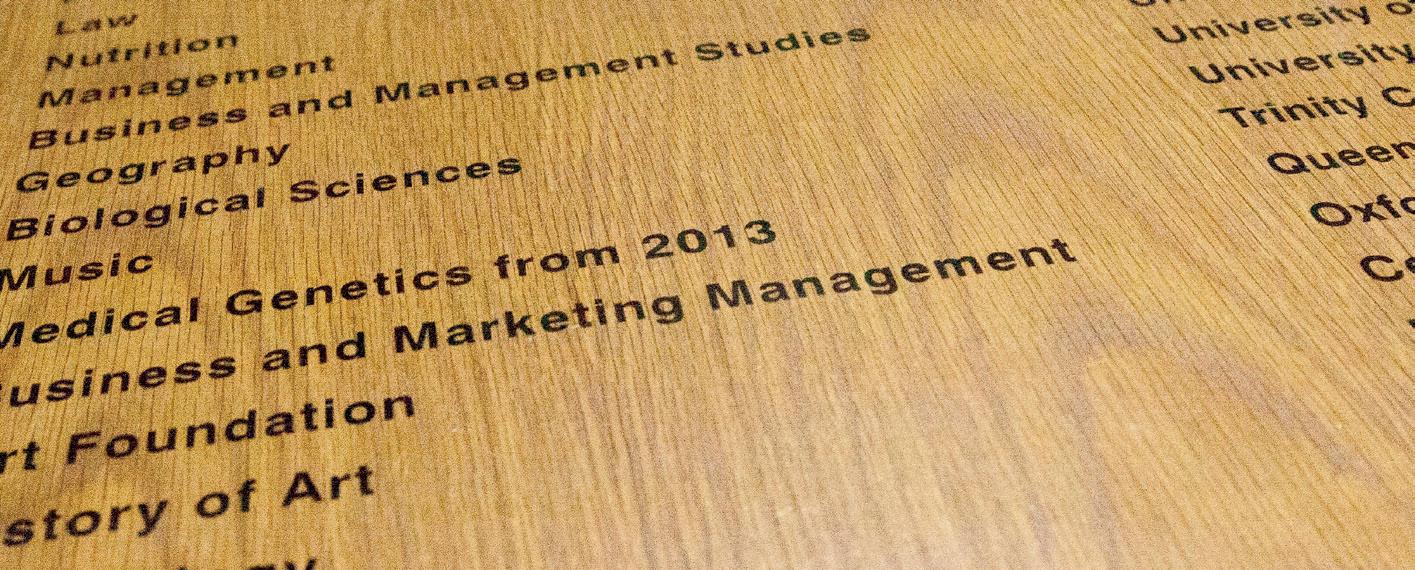
“In 2023, 84% of the Upper Sixth got into their first choice of university.”
Mrs Scopes - Deputy Head of Sixth Form
A level // Futures // Burgess Hill Girls

A levels provide new academic challenges and new areas to explore both within and beyond the taught curriculum. At Burgess Hill Girls Sixth Form, students know that what is covered in lessons and through class and independent study is essential to success, but insufficient for those who want to achieve excellence and full academic mastery. Supercurricular activities take students’ understanding of the regular curriculum further.
Super-curricular engagement is a key feature of our Sixth Form. Reading and additional study is encouraged from the start, with departments sharing with students extended reading lists and ideas about lectures, online resources, and work experience. Students are also supported in competing in various subject Olympiads, engaging with our STEM programme, the Astronomy Club, Young Enterprise, Target 2.0, and numerous subject discussion groups that take place at lunchtimes and after school. These opportunities can bring an A level student to the very frontier of their subject, improving both their performance in subject examinations and in higher education applications.
The School emphasises the value of co-curricular activities and opportunities that extend student experiences outside of their regular curriculum. In the Sixth Form, girls organise a huge array of opportunities to enliven their days and weeks. These help them develop new capabilities, build their leadership skills, take greater responsibility for their time, and enrich their lives and the lives of others.
Opportunities exist through competitions, organised activities in music, drama, and art, engaging with the mentoring programme for younger girls, organising MedSoc and the LawSoc, and joining our thriving Debating Society.
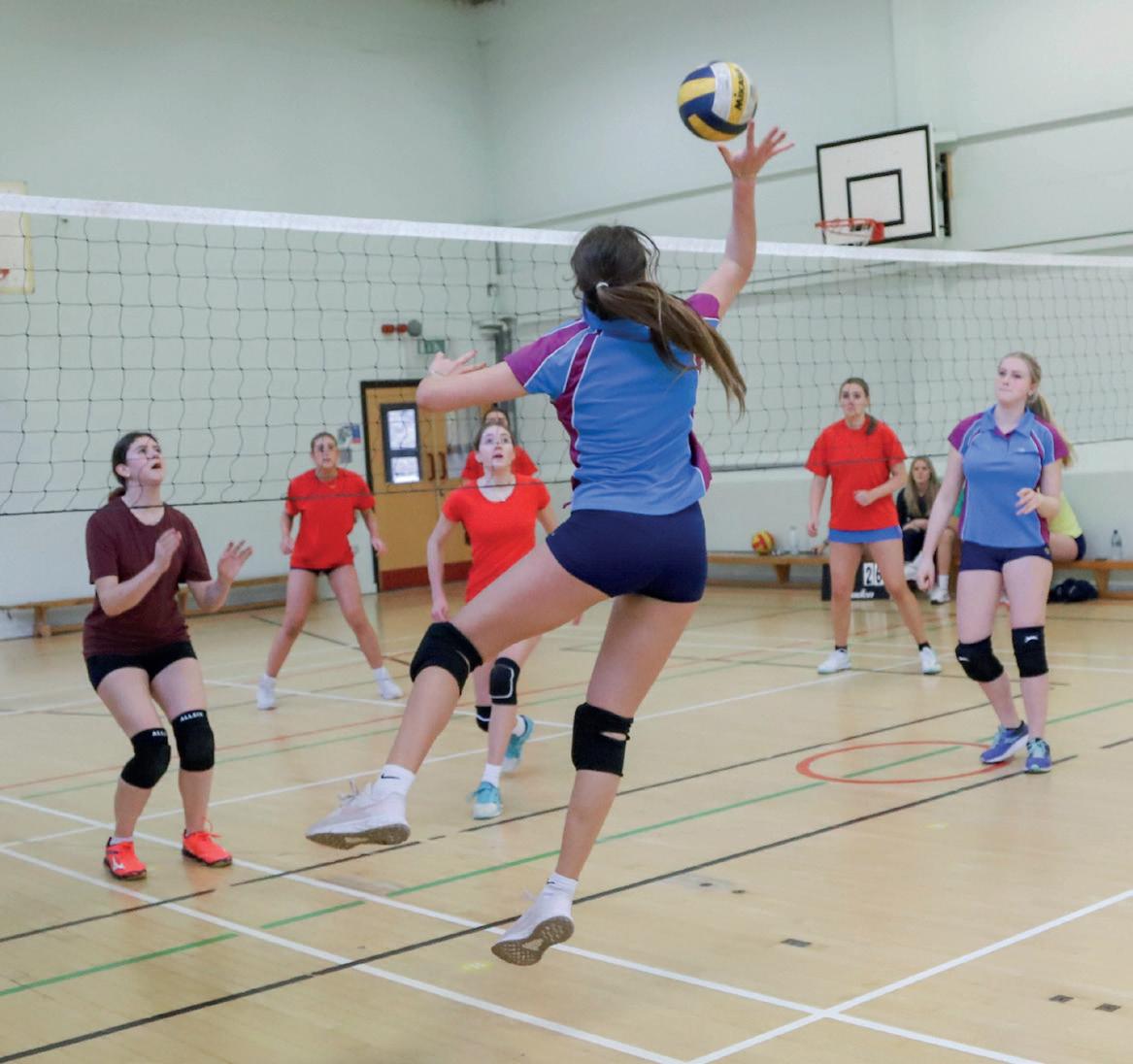
A healthy mind can be supported through sustaining physical health and regular activity. Our Sixth Form curriculum includes two compulsory PE lessons for all girls every week. In addition to this, girls can use our dedicated fitness suite during independent study periods, join our many sports clubs, represent the School’s competitive sports teams, coach younger girls in their PE lessons, and through join our cardio and strength and conditioning classes.
Our sixth formers appreciate the enormous value of travel, taking many subject-related trips as well as organising expeditions, such as the recent Nepal Trip. Forthcoming opportunities for overseas travel include a 2020 expedition to either Asia or Latin America, an expedition to Iceland, trips to Germany, France, Spain and a dedicated trip for our competitive skiers in the winter. The BOLD Programme also contains its own dedicated trips.

The A level Fine Art course requires students to express their creative ideas using imagination and feelings to respond to given themes or topics. The A level Fine Art course is a mixture of new and familiar media and techniques. The emphasis is on individual development, with every student working on their own personal outcomes. Although the course is Fine Art-based, there are opportunities to work outside this parameter using photography, print and fibre art.
The course provides engaging and innovative creative learning experiences, where art and design practice is meaningfully integrated with theoretical knowledge and understanding. Students have opportunities to develop a broad foundation of critical, practical and theoretical skills, which offer a holistic understanding of a range of practices and contexts in the visual arts, crafts and design fields. This culminates in greater specialism and achievement in the second A level year.
The course encourages learners to:
• Develop intellectual, creative and intuitive capabilities

• Investigate, analytical, experimental, practical, technical and expressive skills
• Cultivate aesthetic understanding and critical judgement
• Practise independence of mind in developing, refining and communicating ideas, intentions and personal outcomes
• Experience working with different media
• Explore the interrelationship between art, craft and design and maintain an awareness of context in which they operate
• Build their knowledge and experience of real world contexts and creative industries
Each artist has her own personal working space in the Sixth Form studio. The studio and media suite is equipped with touch screen PCs, graphic tablets, digital cameras, a kiln, drawing, painting and 3D facilities, printmaking and fibre art facilities, animation and Adobe creative software packages. The department also has its own dedicated gallery space.
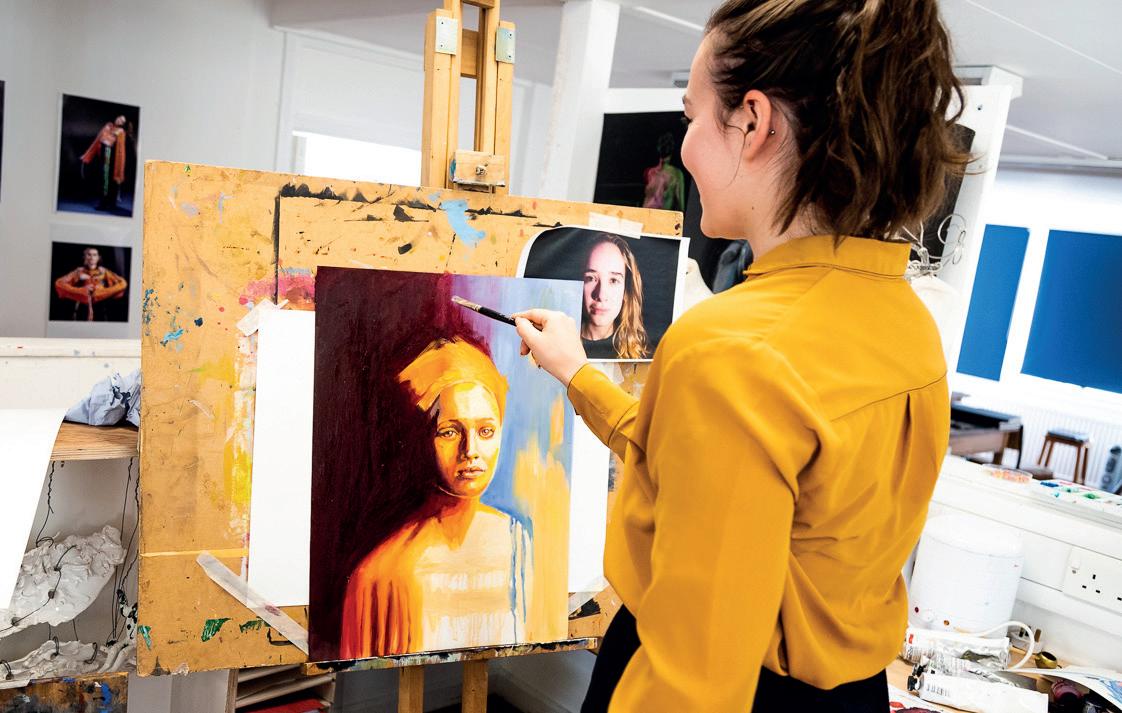
The department also provides wider opportunities:
• Life drawing
• Printmaking workshops with Brighton University
• Visits from professional artists, architects and designers
• An external exhibition in a Brighton Gallery

• Portfolio development, interview practice and support with creating digital portfolios
• Help with career advice, picking courses and with writing personal statements
• Highly individualised reference writing based on teachers’ in-depth knowledge of each student’s work
THE PERSONAL INVESTIGATION CONSISTS OF TWO INTEGRATED CONSTITUENT PARTS:
• A major in-depth critical, practical and theoretical investigative project/portfolio and outcomes based on themes and subject matters that have personal significance.
• An extended written element of 1000 words, which may contain images and texts and must clearly relate to practical and theoretical work using an appropriate working vocabulary and specialist terminology.
THE EXTERNALLY SET ASSIGNMENT CONSISTS OF TWO PARTS:
Preparatory study period
• Responses are developed during the preparatory study period. They take the form of critical, practical and theoretical preparatory work and supporting studies which inform the resolution of ideas and a 15 hour period of sustained focus work under supervised conditions.
• The resolution of ideas completed during the designated 15 hours shows how planning relates to the outcome.
WJEC EDUQAS A LEVEL FINE ART
(Course code: A651QS)
COMPONENT 1: PORTFOLIO AND WRITTEN ELEMENT


• 120 marks
• 60% of A level
COMPONENT 2: PRACTICAL 15 HOURS
• 80 marks
• 40% of A level
All students gained their first place choice for Higher Education including the world’s top ranked institutions, such as Central St Martins, De Montfort for Game Art, Camberwell School of Art – Graphic Design, Bath University and UAL – Architecture, London College of Fashion – Fashion.
“For me, the best thing about taking A level Art is having my own workspace so that I can come back to projects whenever it suits me. Th e facilities are fantastic and the teaching is inspirational and individually focused. ”
If you are curious about how businesses operate and behave, about how products are developed and tailored for the market, and how the decisions of individuals across the economy interact, Business A level may be for you. If you would like to consider potential futures in business, finance, management and accountancy, Business can provide an exceptional foundation.
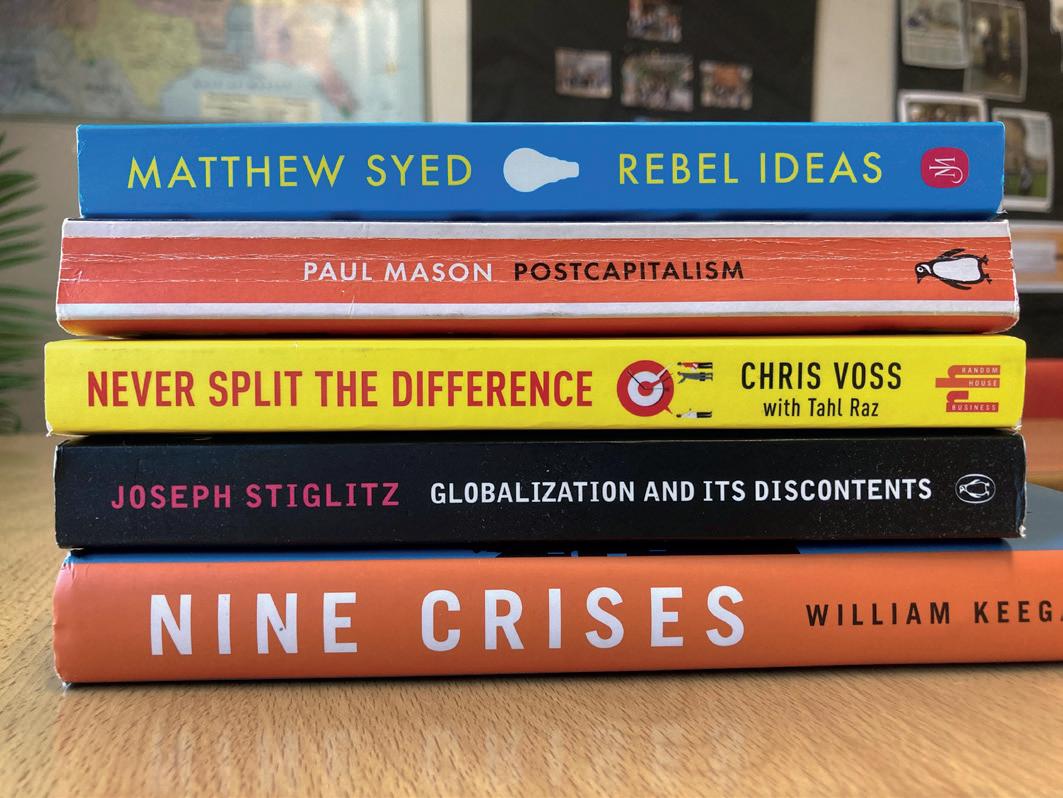
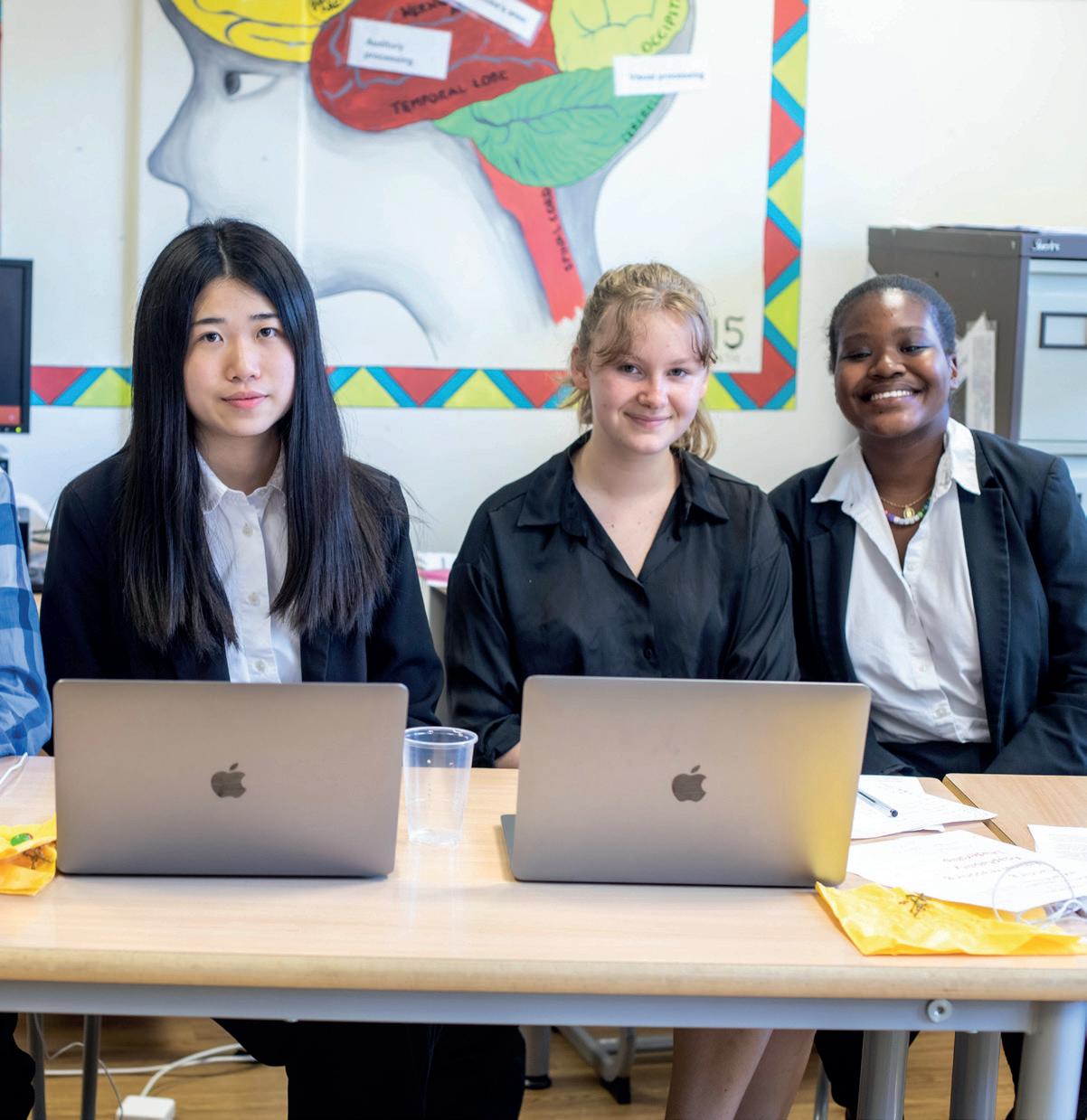
Through the study of A level Business, you will have the chance to engage with the world of business through the context of current business developments and real business situations. The subject will teach you how management, leadership and decision-making can improve performance in marketing, operational, financial and human resources. In studying the interrelated nature of business activities, you will understand in full how decisions and actions taken by businesses and government affect businesses, be they large or small, UK or international, and in different sectors such as service or manufacturing.
We teach the Pearson Edexcel A level in Business. It is structured into four themes and consists of three exam papers. You will be introduced to business in themes 1 and 2 through building knowledge of core business concepts and applying them to business contexts to develop a broad understanding of how businesses work. Breadth and depth of knowledge and understanding, with applications to a wider range of contexts and more complex business information, are developed in Themes 3 and 4, requiring students to take a more strategic view of business opportunities and issues. Students of Business A level are encouraged to use an enquiring, critical and thoughtful approach to the study of business, to understand that business behaviour can be studied from a range of perspectives and to challenge assumptions.
SCHEME OF ASSESSMENT
FOUR TEACHING MODULES:

THEME 1: Marketing and people
THEME 2: Managing business activities
THEME 3: Business decisions and strategy
THEME 4: Global business
ADVANCED GCE IN BUSINESS
(Course code: 9BS0)
PAPER 1: Marketing, people and global business
PAPER 2: Business activities, decisions and strategy
PAPER 3: Investigating business in a competitive environment
Students of Business go on to study a range of degrees at university, including business, management, marketing, human resources, accounting, finance and economics. Business can also support applications in huge range of other subjects.
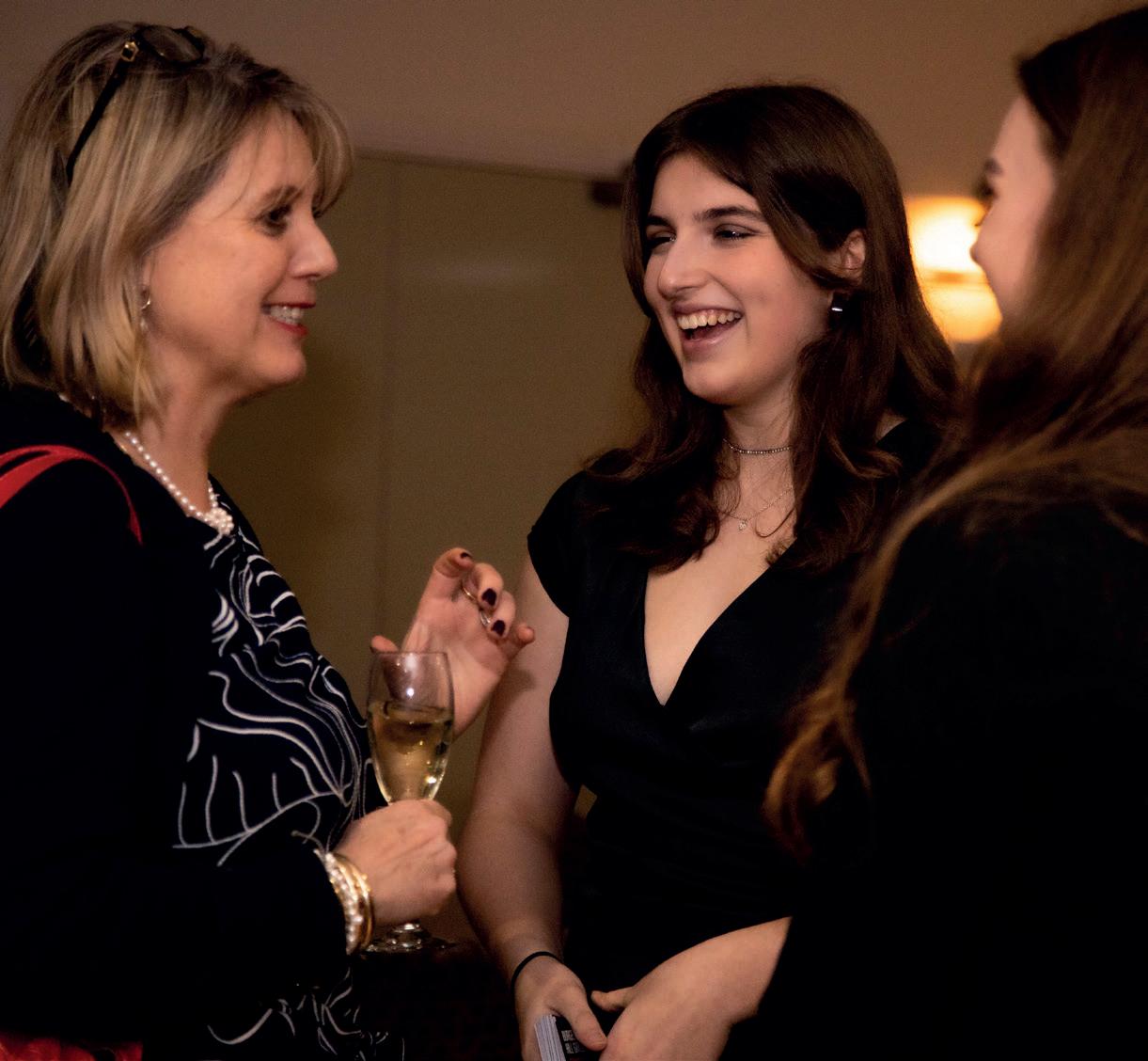

Biology represents every aspect of life; how do living things work, what makes them similar or unique and how can biological developments influence life now and in the future. At A level, Biology delves deeper and more extensively into the human body, the life of plants, biological processes and the interaction of living things and the environment. It traces the path of Biology through its evolutionary history while bringing students’ knowledge right up to date with the most recent advances in biotechnology and genetic engineering. The course challenges students, with an emphasis on application of ideas and an ability to link concepts.
There is a significant mathematical requirement alongside the need to retain a breadth and depth of facts and ideas while making links between topics throughout the course. The specification offers a broad biological education with a consolidation of knowledge as the course progresses. There is a core of practical work with a number of required investigative tasks forming the award of the Practical Endorsement.
As an A level student of Biology, students should expect to be involved in discovering many interesting new ideas and concepts through lessons and practical work but also to pursue their own particular interests through independent

review and study. There will also be opportunities to get involved in debates and discussions generated from the emotive topics that will be encountered on the course.
There are cross-curricular links with many complementary subjects, including Mathematics, the other sciences, Psychology, Geography and PE. Biology is also able to develop many transferable skills such as logical reasoning, practical investigation and data analysis. Biology continues to be seen favourably by universities for entry to all types of higher education courses. Past students have gone on to study degree courses as diverse as medicine, veterinary sciences and physiotherapy to history, art and music. Careers in biological fields are ever-expanding with the continued progression of biotechnology and genetics, as well as an increase in environmental assessment and its implications for industry.
Biology holds interest for all of us, owing to its relevance and importance in the world around us. Study of the subject at A level will stretch students academically, expand their understanding and pose as many questions as it will answer.
“Biology is relevant, dynamic, diverse and full of opportunities. Why wouldn’t you be interested in finding out more?”
Mrs Vatcher - Head of Biology
SIX TEACHING MODULES:


1. Development of practical skills in Biology
2. Foundations in Biology
3. Exchange and Transport
4. Biodiversity, Evolution and Disease
5. Communication, Homeostasis and Energy
6. Genetics, Evolution and Ecosystems
(Course code: H420)
PAPER 3: WRITTEN EXAM
2 HOURS 15 MIN
• 100 marks
• 37% of A level
PAPER 2: WRITTEN EXAM
2 HOURS 15 MIN
• 100 marks
• 37% of A level
PAPER 1: WRITTEN EXAM
1 HOUR 30 MIN
• 70 marks
• 26% of A level
NON-EXAMINED ASSESSMENT: Practical endorsement in Biology
“Biology is a challenge but I really enjoy that. Th ere is a good mix of practical and theory with a lot of detail about the human body. I particularly enjoy the discussions we have and the questions that come up. I have loved the practical work, especially dissecting a fi sh and a heart.” Emma
Students of Biology move on to study and work in many disciplines, not only scientific ones. These may include medicine or veterinary, biotechnology and environmental sciences, as well as unrelated fields.

Chemistry is everywhere in the world around us, from the food we eat, the water we drink, clothing, medicines and much more. It is sometimes referred to as the central science as it finds connections between other scientific subjects. A level Chemistry gives students an exciting insight into the contemporary world of chemistry. It covers the key concepts of chemistry with practical skills integrated throughout the course. It can give students a full and clear comprehension of these processes, and the means to consider employment or further study that builds on that understanding to consider and develop new ways to use chemistry. The combination of academic challenge and practical focus makes the subject hugely rewarding.
Chemistry is an excellent foundation for a large number of university degrees. It is essential for studying veterinary science, medicine, pharmacy and dentistry but also relevant for the biological sciences, physics, mathematics, pharmacology, analytical chemistry, engineering, teaching and other health care subjects. Chemistry can also complement a number of arts subjects.
Beyond those seeking to succeed in Chemistry specifically and the sciences generally, the skills learned in Chemistry A level are highly regarded by law and accountancy firms as
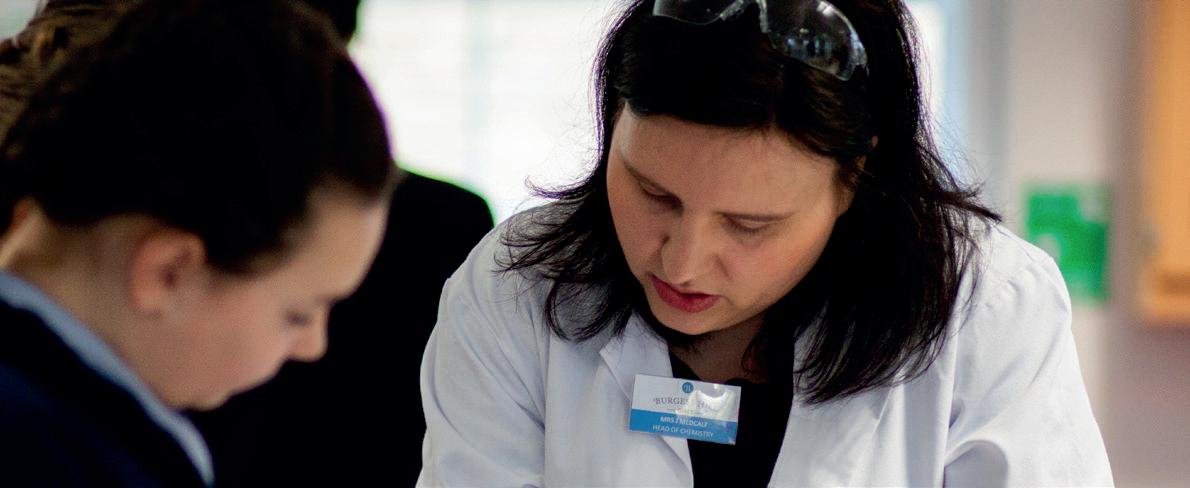
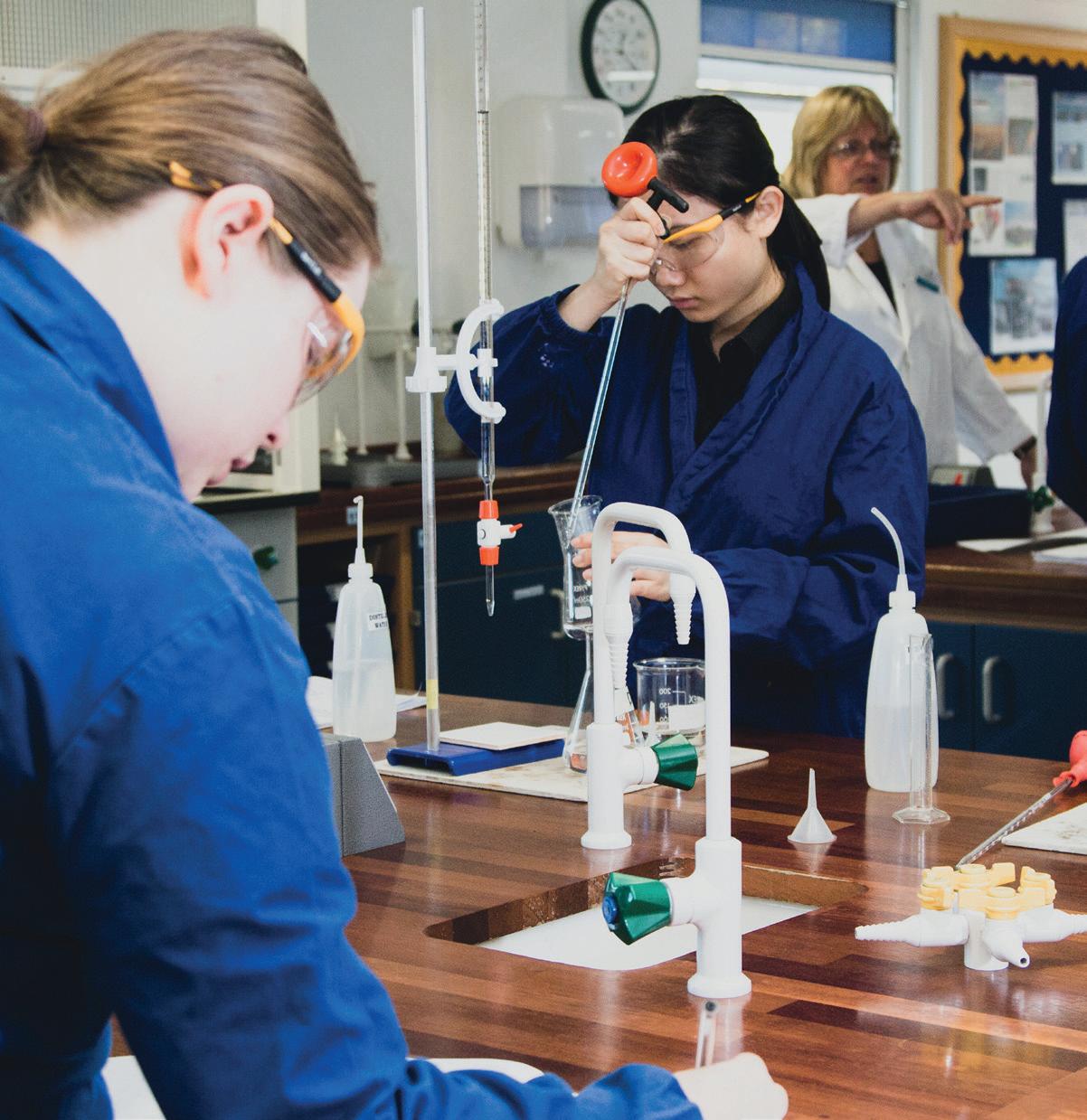
well as the financial services industry. Chemistry requires the application of practical skills such as planning, making risk assessments, manipulating apparatus, deriving conclusions from results and evaluating their accuracy, precision and reliability. Chemistry also involves using the mathematical skills of rearranging equations and using logarithms and exponentials. Through completing regular practicals and manipulating data, these skills are all developed throughout the two-year course.
“Chemistry is an intellectually stimulating and fascinating subject. The teachers really get to know you and are always there to offer support and help - especially during exam season. I was able challenge my understanding further by taking part in the Young Analyst Competition and the Chemistry Olympiad.”
SIX TEACHING MODULES:
1. Development of practical skills in chemistry
2. Foundations in chemistry
3. Periodic table and energy
4. Core organic chemistry
5. Physical chemistry and transition elements
6. Organic chemistry and analysis
OCR A LEVEL CHEMISTRY
(Course code H432)
PAPER 1: WRITTEN EXAM
• 37% of A level
PAPER 2: WRITTEN EXAM
• 37% of A level
PAPER 3: WRITTEN EXAM
• 26% of A level
NEA (NON EXAM ASSESSMENT)
• Practical endrosement
Some of the areas where Chemists are to be found include:
• All areas of industry, from the oil, chemical and pharmaceutical companies to a host of smaller enterprises producing new and specialist products
• Public health and environmental protection
• Research in universities, government institutes, industry and private agencies
• Teaching at all levels
• Patent agencies


• Scientific journalism
• Forensic science
• Numerous other occupations which make direct use of scientific knowledge
ENRICHMENT
Chemistry mentors to younger students
Cambridge Chemistry Challenge Chemistry Olympiad

An A level in Classical Civilisation opens up the wonders of the Classical world without requiring students to understand an ancient language. It is wide ranging in its scope and provides give students a broad skill base necessary for future success. Comparing ancient and modern societies is fascinating and through this students gain a deeper insight into culture. As one of the most well-documented and diverse ancient cultures, the Roman Empire, at the time of its greatest influence, included places as diverse and colourful as Britain in the north, Egypt in the south, modern day Iraq, Turkey and Syria in the East and the Iberian Peninsula and Morocco in the West. Recognised even today as a pinnacle of intellectual thought and discovery, ancient Athens gave birth to democracy and sparked a cultural revolution of art and drama. Through Classical Civilisation, our girls can access the lives, minds and philosophical thought of men and women who lived over two and half thousand years ago.
At A level, there are three principle areas of study: the World of the Hero; Greek Theatre and Politics of the Late Republic. We explore what heroism means in the ancient world, experience epic battles and read some of the most influential and engaging literature ever written or composed. Studying the Odyssey and the Aeneid, we compare what heroism means to different societies and cultures. Greek Tragedy gives us the enthralling opportunity to ponder life’s most important questions through the medium of Greek drama and struggle with murder, mania, religious extremism and what it means to be human. The scandalous (and very rude) Greek comedy will offer some light relief. Finally, we
study Politics of the Late Republic, combining the study of historical events and political ideas in order to delve into the breakdown of key relationships between Caesar, Cicero and Cato. The jockeying for power between these men eventually led to the destruction of the Roman Republic. The courses explore both literary and material culture.
Classical Civilisation is recognised as a very academic subject, which will provide students with a wide array of key skills. It also offers a huge variety of subject areas including philosophy, science, rhetoric, sophistry, architecture, history and some of the best and most influential literature ever written. The Classics Department has a history of excellent results, and offers a vibrant selection of extra-curricular activities.
An A level in Classical Civilisation is a good complement for humanities or creative subjects. It is also a good choice for scientists who want to demonstrate skills in other areas too. Students will develop excellent communication skills, analytical and evaluative skills, the ability to synthesise a large amount of material and the ability to argue coherently and, crucially, to think outside the box.
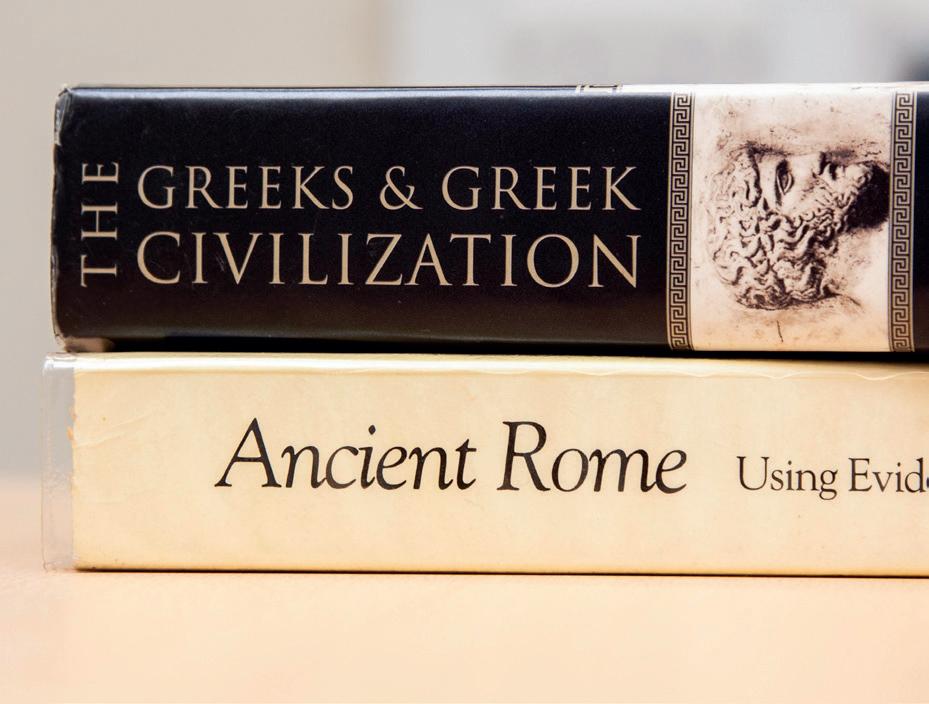
“I’ve come to appreciate how heavily the classical world has influenced modern society, which has had a huge impact on how I perceive our own world. Plus the lessons could not be more fun!” Sophie
Assessment is by examination only. There is no coursework.
There are three papers:
PAPER 1: The World of the Hero (40%)
PAPER 2: Culture and the Arts (30%)
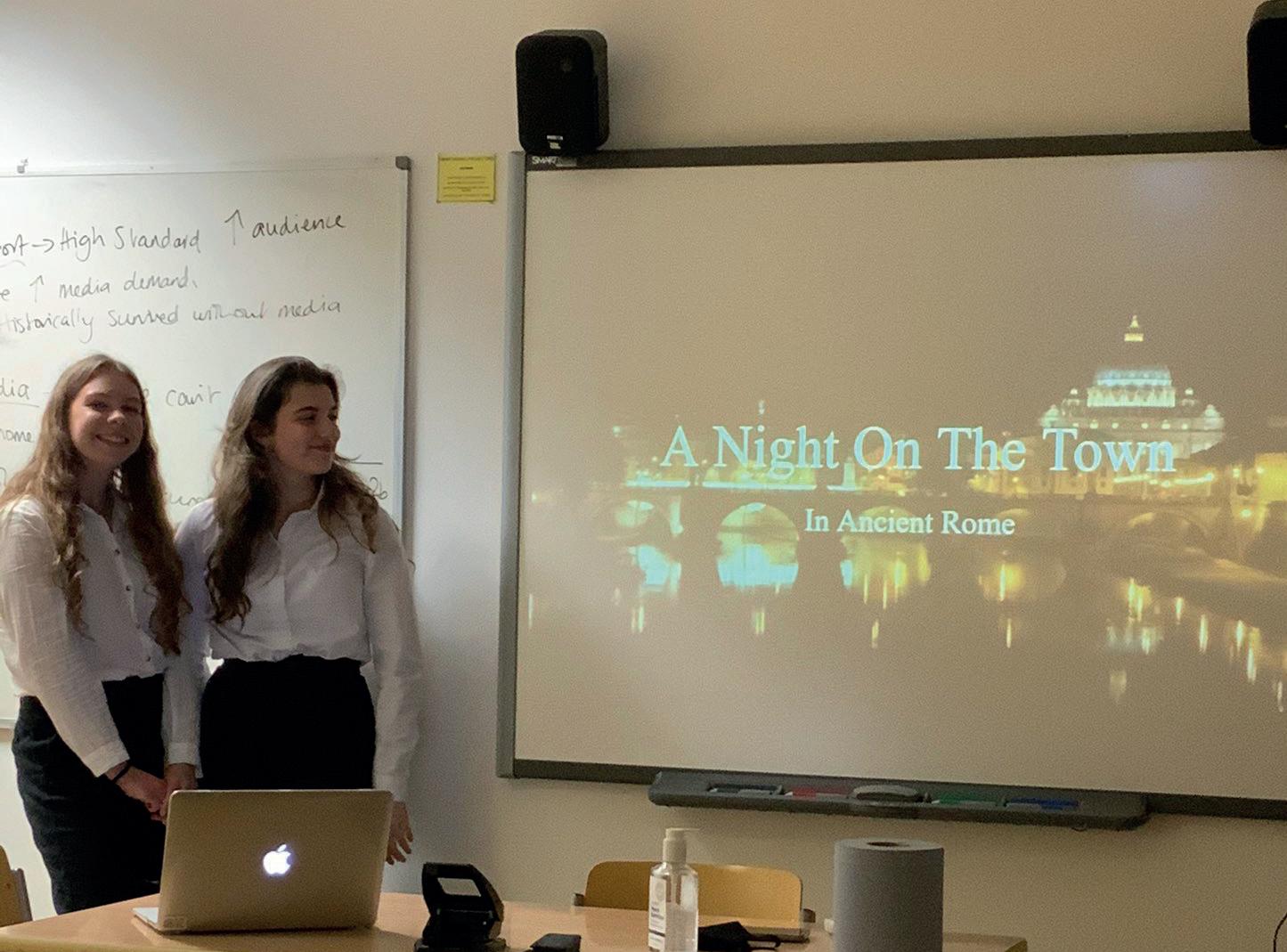
PAPER 3: Beliefs and Ideas (30%)
Over the course, students will be assessed through essays, presentations, source analysis, practice questions and other suitable tasks.

“Th e greatest pull of studying the ancient world is that it encompasses so many subjects all combined into one, from Drama and Literature, to Art and Architecture, to History and Politics and so much more”
(Course code H408)

PAPER 1: WRITTEN EXAM
2 HOURS 20 MINUTES
• 100 marks
• 40% of A level
PAPER 2: WRITTEN EXAM
1 HOUR 45 MINUTES
• 75 marks
• 30% of A level
PAPER 3: WRITTEN EXAM
1 HOUR 45 MINUTES
• 75 marks
• 30% of A level
Students will learn to form coherent, supported arguments and to evaluate complex information from a variety of sources. It is a useful basis for a wide range of degree courses.
Visiting Lecturers
Computer technology is part of just about everything that touches our lives, from the cars we drive, to the films we watch, to the ways businesses and governments work. We are all users of computer technology.
But how do our smartphones and laptops work? How is it possible to share messages, photos, music and videos from one side of the planet to the other within a few seconds? How can technology be programmed to play games, understand speech, drive cars and control power stations? Studying Computer Science can answer these questions and many more by ‘lifting the lid’ on technology to explore a hidden world of electronics and code. And, in a field often dominated by the latest gadgets and applications, Computer Science also explores the underlying principles and techniques which have underpinned a constantly changing technological landscape for many years.
As well as explaining how technology works, Computer Science also develops other capabilities in understanding and solving problems. Designing, developing and testing applications and hardware devices can be a challenging, creative and highly rewarding experience. Learning how to think algorithmically, together with the computational thinking skills of decomposition and abstraction help build a powerful problem-solving toolkit that can be put to use in a wide range of areas.
At A level, key components of modern computer systems are explored in depth, looking at both the hardware and software that combine to make a complete system. The storage and management of data, an increasingly significant feature of computing applications, is also studied and programming skills are developed, alongside the study of
important techniques such as pattern recognition, searching and sorting. Other areas of study include communications and the internet, and the issue of cyber security is covered in detail.
Creating software is a significant part of the course and, in the final year, students showcase their programming skills by analysing, designing, coding, testing and evaluating a substantial programming task.
Studying computing and computer technology is also good preparation for a future where technology will continue to dominate nearly every profession. There can be little doubt that knowledge and skills in this field will continue to be highly sought after by future employers.
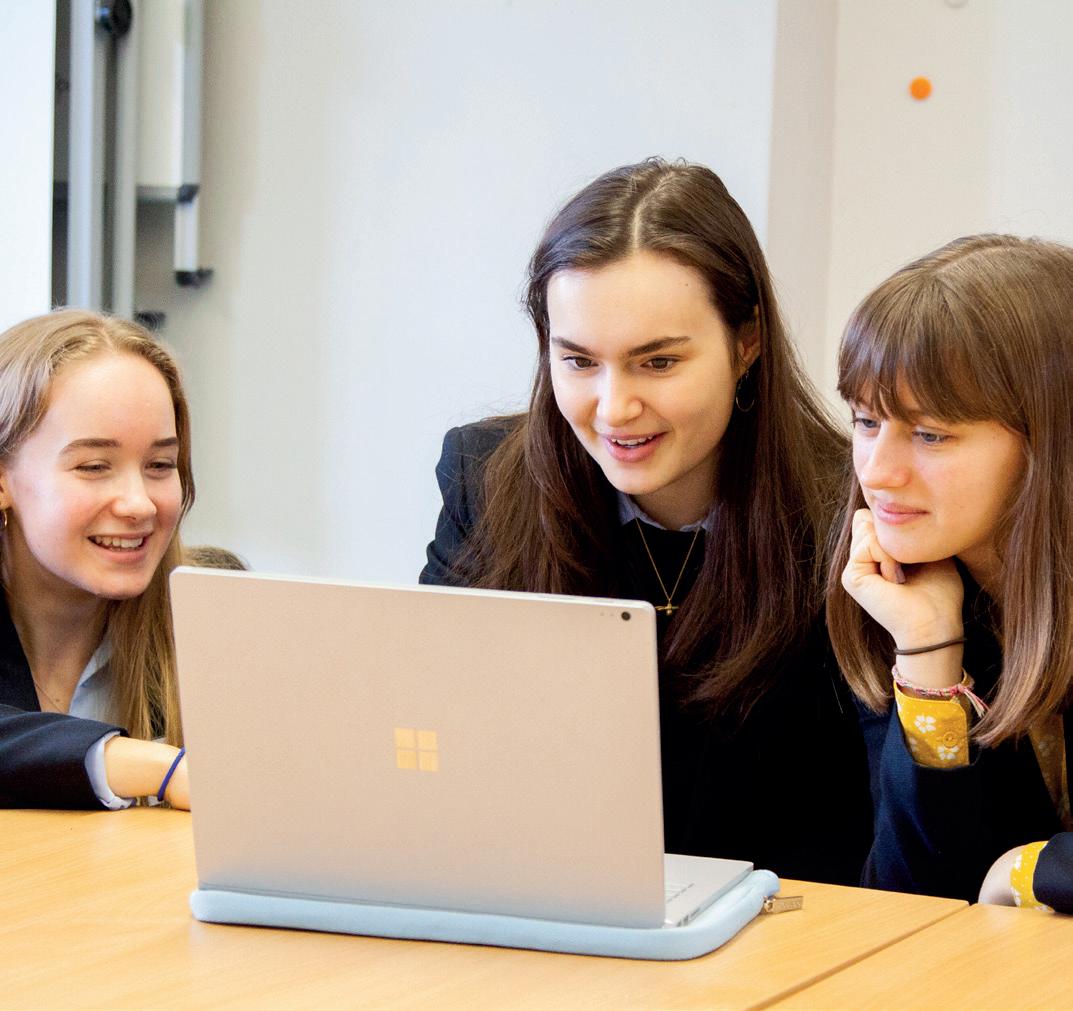
OCR A LEVEL COMPUTER SCIENCE
(Course code H446)


PAPER 1: WRITTEN EXAM: 2 HOUR 30 MINUTES
• 40% of A level
PAPER 2: WRITTEN EXAM: 1 HOUR 45 MINUTES
• 40% of A level
NEA (NON-EXAM ASSESSMENT)
• 20% of A level
PAPER 1: Computer Systems
PAPER 2: Algorithms and Programming
PAPER 3: Programming Project
“Computer science is much more than just a set of facts about the latest gadget or app, it is about how to be a better thinker. Often creative and always highly satisfying, learning to understand and solve problems lies at its centre.”

A level // Computer Science // Burgess Hill Girls ENRICHMENT
Trips to Computer Science talks and conferences
Dedicated speakers from the Tech world
Design and Technology is a practical as well as knowledge based subject. Students will learn practical skills, technical and design principles. Theory will include; materials, manufacturing, sustainable design and project management. Application of their knowledge and skill through the iterative design process will allow each student to develop and modify designs, and ultimately make high quality prototypes that can solve real world problems.
Students identify market needs and opportunities for new products, initiate and develop design solutions, consider their own and others’ needs, wants, aspirations and values. They develop a deep understanding of how a product can be developed through the stages of prototyping, realisation and commercial manufacture. Students are encouraged to be creative and innovative, developing the confidence to produce design solutions and develop design briefs with a client. They are encouraged to take design risks, showing innovation and enterprise whilst considering their role as responsible designers and citizens. Working collaboratively as well as independently, students are encouraged to develop and refine ideas, responding to feedback from users, peers and expert practitioners. Through focused research and the exploration of design opportunities, students develop the capacity to think creatively, innovatively and critically at each stage of the iterative design process.
A level Product Design integrates and applies understanding and knowledge from other subject areas too, with a particular focus on science and mathematics, and can also draw on influences from students’ other subject choices and interests. The use of computer aided design and manufacture aids in creating high quality outcomes. Our 3D printer, laser cutter, vinyl cutter and engraving machines support the traditional wood, metal and polymer processes. Use of electronics and microcontrollers is also encouraged.
The course gives particularly clear insight into the creative, engineering and manufacturing industries. It equips students with design skills for the future, so they are able to recognise design needs and constraints. They will develop an understanding of how design is influenced and yet can also impact current global issues. They will also develop intellectual curiosity about the design and manufacture of products and systems, including their impact on daily life and the wider world.
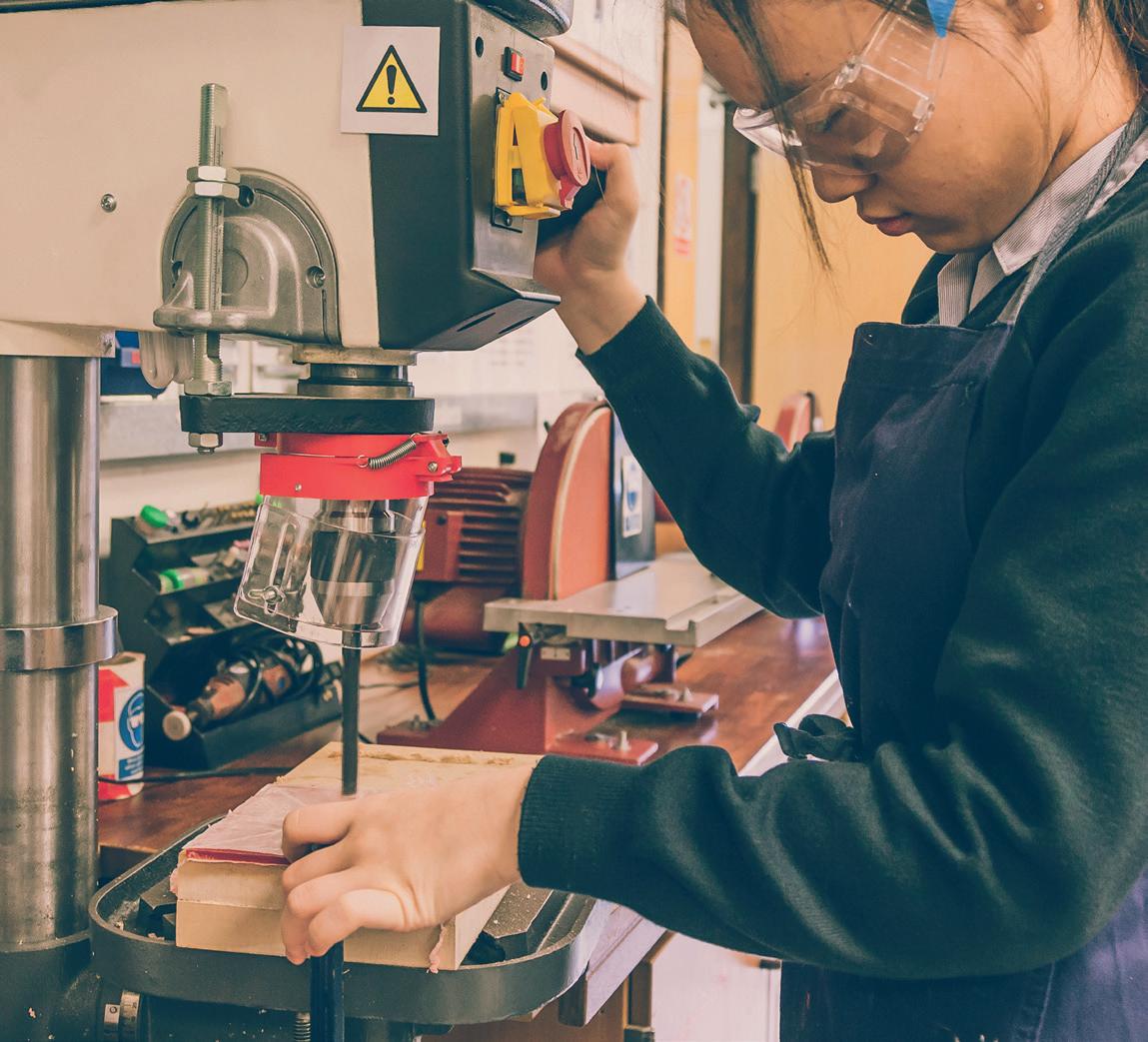
PAPER 1: Technical Principles
PAPER 2: Design and Make Principles
PAPER 3: A practical application of technical principles, designing and making principles
AQA A LEVEL DESIGN AND TECHNOLOGY: PRODUCT DESIGN
(Course code: 7552)
PAPER 1: WRITTEN EXAM: 2 HOUR 30 MINUTES
• 120 marks
• 30% of A level
PAPER 2: WRITTEN EXAM: 1 HOUR 30 MINUTES
• 80 marks
• 20% of A level
NEA (NON-EXAM ASSESSMENT) 65 SUPERVISED

HOURS
• 100 marks
• 50% of A level
“I enjoy the satisfaction of responding to a design brief from a client with a problem to be solved, taking a project from concept to realisation and making something unique from my own ideas. ”

An A level in Product Design prepares students for a number of different higher education pathways and professions, such as industrial design, electronic, mechanical and general engineering, architecture, computing and coding, set design, graphic design, product design, curating, product buying and forecasting and countless others.
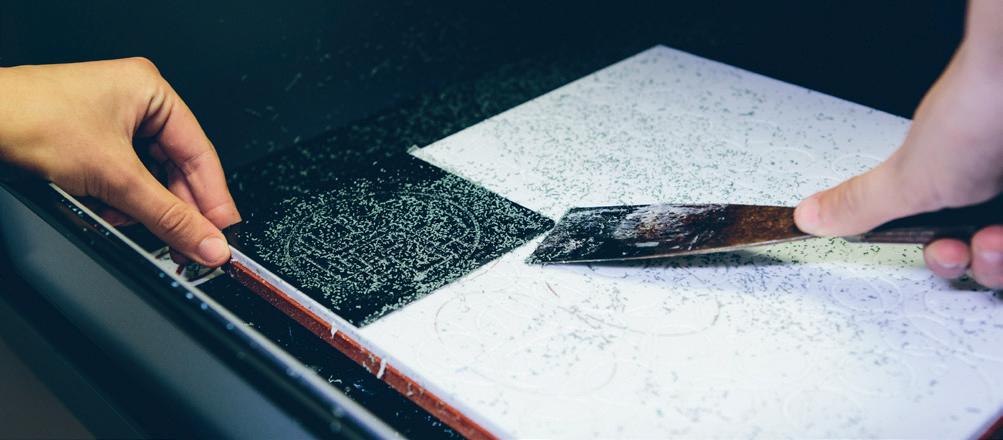
Elizabeth
It is widely recognised that the varied disciplines of Drama – analysis, evaluation, performance, devising, spontaneity, collaborative work and presentation – as well as the opportunities for nurturing artistic expression, provide a strong platform of employable skills for many careers and vocational areas. The emphasis on versatility that the A level course fosters, makes students attractive to employers and universities alike. Former students currently enjoy highly successful careers in law, medicine, teaching, acting, production, film and television.
An A level in Drama and Theatre does not limit career choices to an arts-based area. Indeed, A level Drama and Theatre provides the ideal training for any position requiring quick thinking, resilience, creativity, team work and organisation.
The course will suit students with an interest in theatre, including those interested in theatre technology. A level Drama and Theatre builds on the skills and techniques encountered at GCSE. However, whilst having studied the subject at GCSE would be an advantage, it is by no means essential. The course emphasises learning through practical exploration; in the written paper, students have to write about their practical work.
Drama and Theatre complements many other subjects available at A level, in particular, History, Classical Civilisation, Psychology, English Literature, Art, Music and languages.
Drama and Theatre A level is accepted by universities for a wide range of different courses. The AQA course is highly regarded by outside agencies and universities as being both of great academic and practical performance value alike.
Theatre visits and workshops are a requirement of the syllabus and students join several visits a term to venues both locally (Chichester and Brighton) and in London, as well as research trips to the National Theatre Archive. We also welcome theatre companies to the school to work with students, such as the award winning ‘Paper Birds’ and the world renowned ‘Frantic Assembly’.
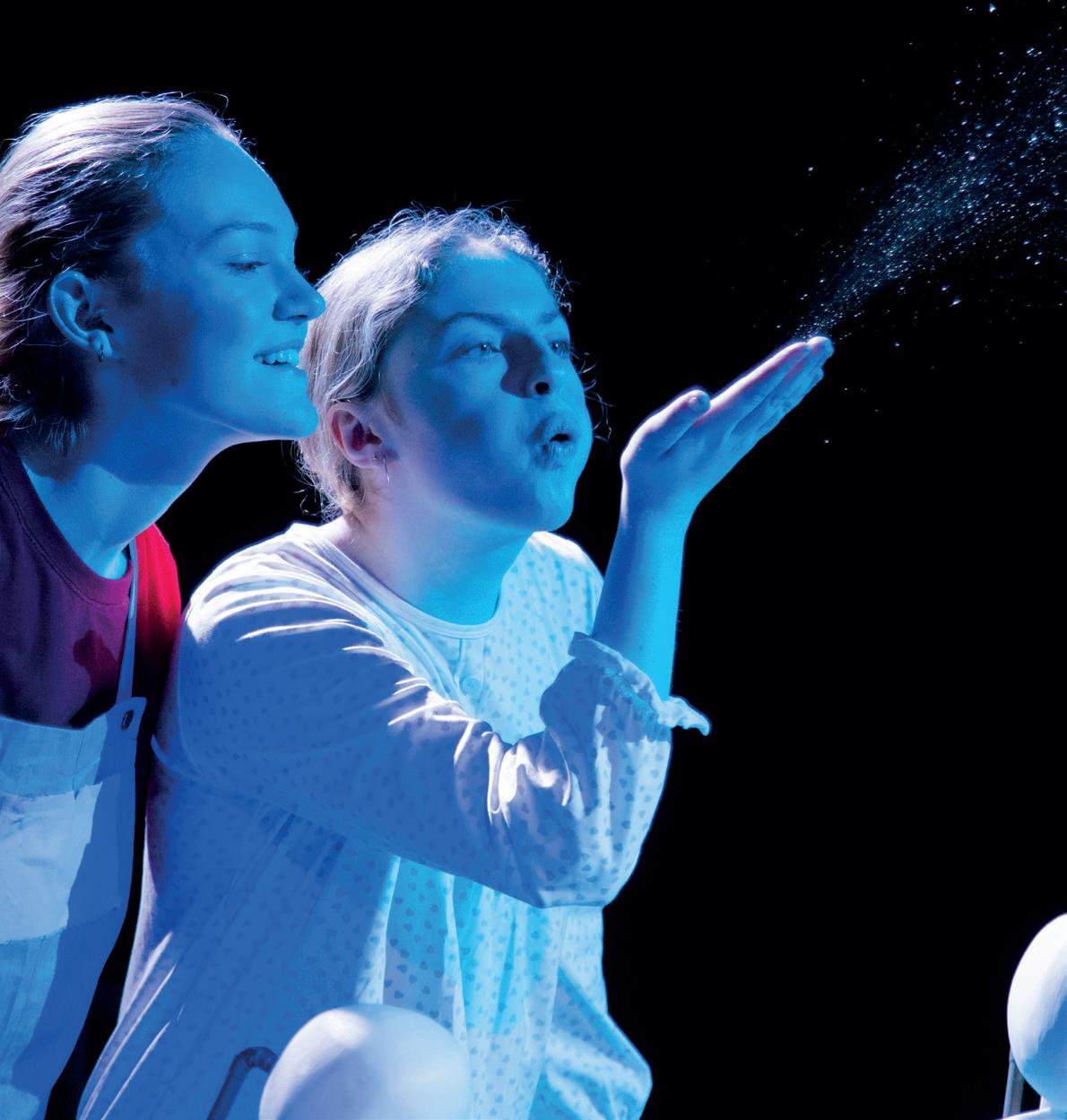
“Drama brings me the most joy. It is demanding and at times hard work, but I’m doing it because I love it.”
COMPONENT 1: Drama and Theatre
• Study of two set plays (currently Our Country’s Good and Hedda Gabler ) and Analysis and Evaluation of the work of Live Theatre
COMPONENT 2: Creating Original Drama
• Process of creating devised drama and performance of devised drama
• Devised piece influenced by the work of one prescribed practitioner (e.g. Frantic Assembly, Artaud or Kneehigh)
• Notebook and devised performance
COMPONENT 3: Making Theatre
• Practical exploration and interpretation of three extracts each taken from a different play. Methodology of a prescribed practitioner must be applied to the final assessed piece
• Final performance and reflective report
AQA A LEVEL DRAMA & THEATRE
(Course code 7262)
COMPONENT 1: WRITTEN PAPER
3 HOURS
• 80 marks
• 40% of A level
COMPONENT 2: PRACTICAL
• 60 marks
• 30% of A level
• Marked by teachers
• Moderated by AQA
COMPONENT 3: PRACTICAL

• 60 marks
• 30% of A level
• Marked by teachers
• Moderated by AQA
Universities offer broader programmes of study than Drama schools. Students are given more choice, choosing the modules they study, to having the flexibility to take a joint honours degree. The latter allows students to combine Drama and Theatre with other subjects such as film, design, or English. Drama schools offer a focused and practical approach to training, while universities provide a more broad and academic approach to study.
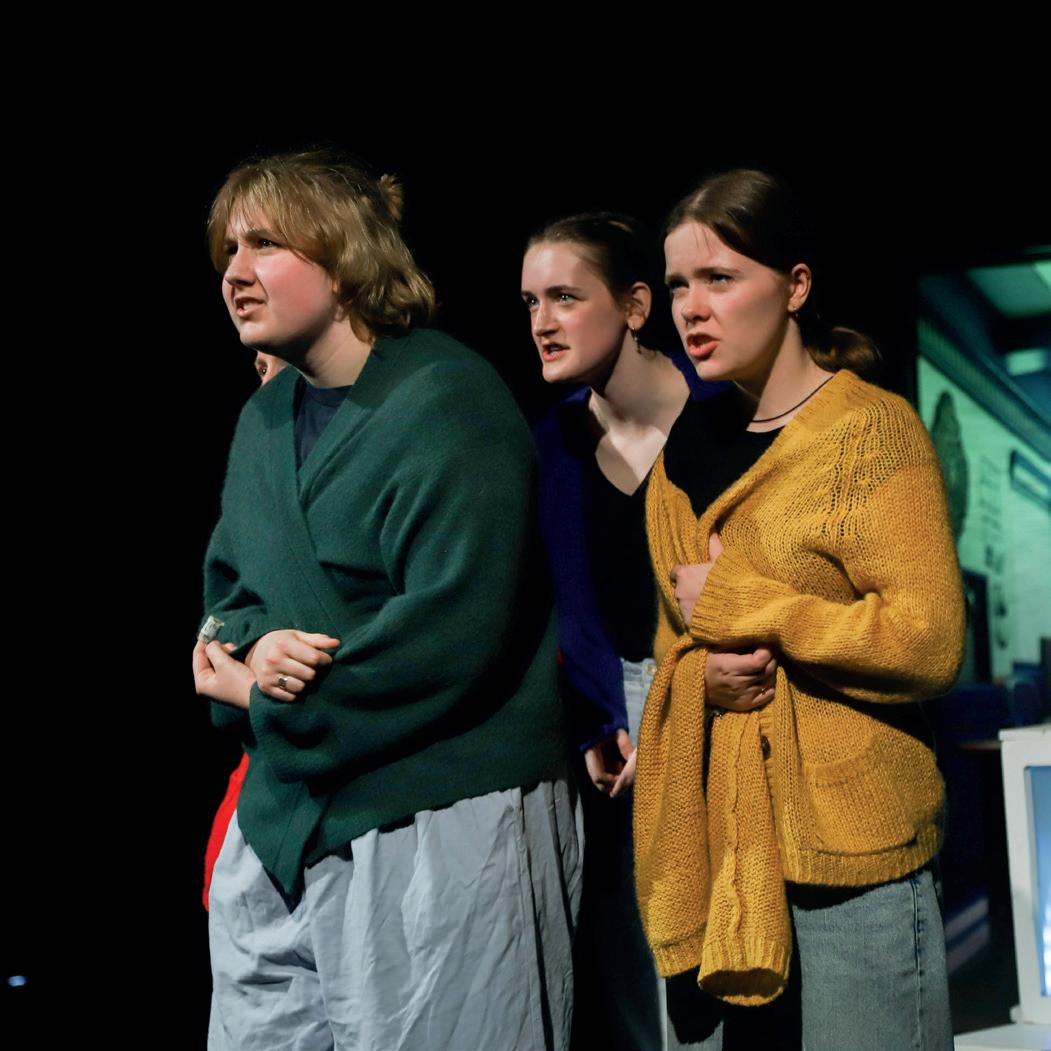
Interhouse Performing Arts, Productions
Directing/Organising Year 7&8 Drama Clubs
Theatre Trips - local and overseas

Economics is more relevant now than ever before. In the last decade, the global economy has been blighted by an historic financial crisis, and national economies have been tested to their limits in response. Austerity in Britain and sovereign debt crises abroad have heightened the tension and, since the 2016 referendum, Britain is also negotiating the most complex arrangement in its history – its removal from the EU, a highly integrated economic and political organisation. In Europe and America, central tenets of free market economics are challenged by populist policy-makers concerned with rising rates of inequality or dwindling living standards. Meanwhile, at the international stage, globalisation has experienced a crisis of confidence, with America electing a President partly committed to dismantling an economic system created by the United States. There is simply no better way to understand the full implications of this situation, as well as the causes for it and the potential solutions to it, than by studying Economics at A level.
Through microeconomics, students are given the opportunity to examine whether consumer behaviour is indeed rational, questioning the central assumption of centuries of economic thinking, and reflect on new considerations from psychology and sociology on the need to consider the non-rational sources of human behaviour. Business activity is analysed closely, giving students the chance to consider contemporary events from an informed position, for
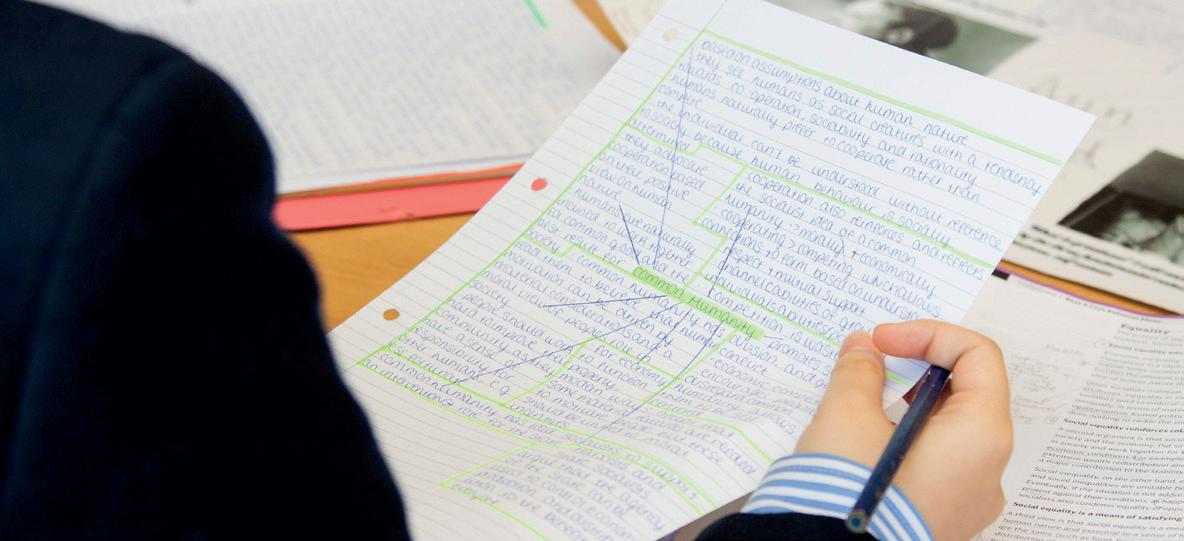
example, by asking whether the proposed merger between Sainsbury’s and Asda will benefit consumers, or how the continuing dominance of online behemoths undermines fair competition online.
Economics A level is highly regarded by universities and employers because a good economist can analyse and interpret data, write discursive and evaluative essays and draw on wider knowledge of current issues and debates to inform their critical thinking. Our students quickly begin to think like economists, assessing different sides of an argument and using a wide variety of economic models and methods of enquiry to analyse economic issues. By the end of the A level, students are able to fully appreciate and understand the economic issues which dominate the news, and will be able to consider and discuss economic affairs and theories with confidence. They will also become confident with using statistical information as evidence in building written answers, which will support them in the study of related subjects at university. The Economics department makes use of a wide variety of the most up to date teaching resources to support students. Girls become resilient and confident learners, readily engaging with current affairs and economic sources online to add to their understanding, while teachers support them with bespoke learning materials and carefully tailored feedback.
Economists do not have all the answers but they have the most interesting questions and at the heart of many of these are the more philosophical challenges, such as the extent to which human happiness can be achieved through material wealth. Economics is everywhere and influences everything we do and everything that happens to us. With A level Economics, students can better understand the operation of national and international economics, and more confidently comprehend how the world around them works.
EDEXCEL A LEVEL IN ECONOMICS, SPECIFICATION A
(Course code: 9ECO)

PAPER 1: WRITTEN EXAM
2 HOURS
• 35% of A level
PAPER 2: WRITTEN EXAM
2 HOURS
• 35% of A level
PAPER 3: WRITTEN EXAM
2 HOURS
SYNOPTIC
• 30% of A level
“Economics A level covers a wide range of skills whilst keeping you up to date with global aff airs. It’s so easy to fi nd new examples or relevant debates every single day in the news.”

Many of our students go on to study economics and related subjects at leading universities. A degree in Economics can take students into careers as diverse as journalism, banking, politics and the Civil Service or the charities sector.
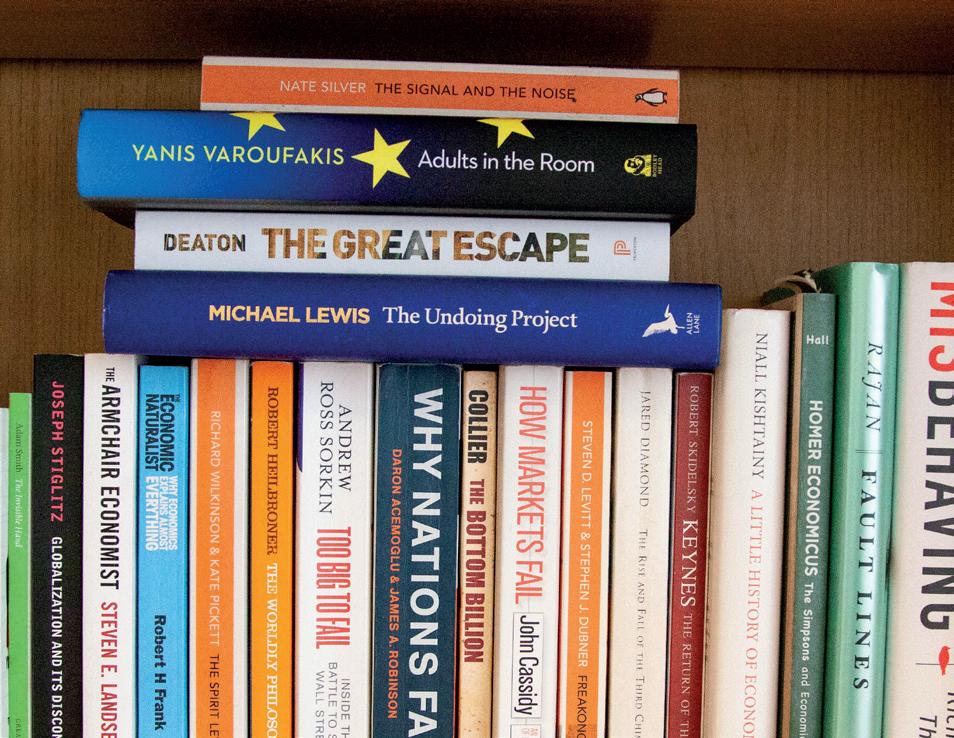
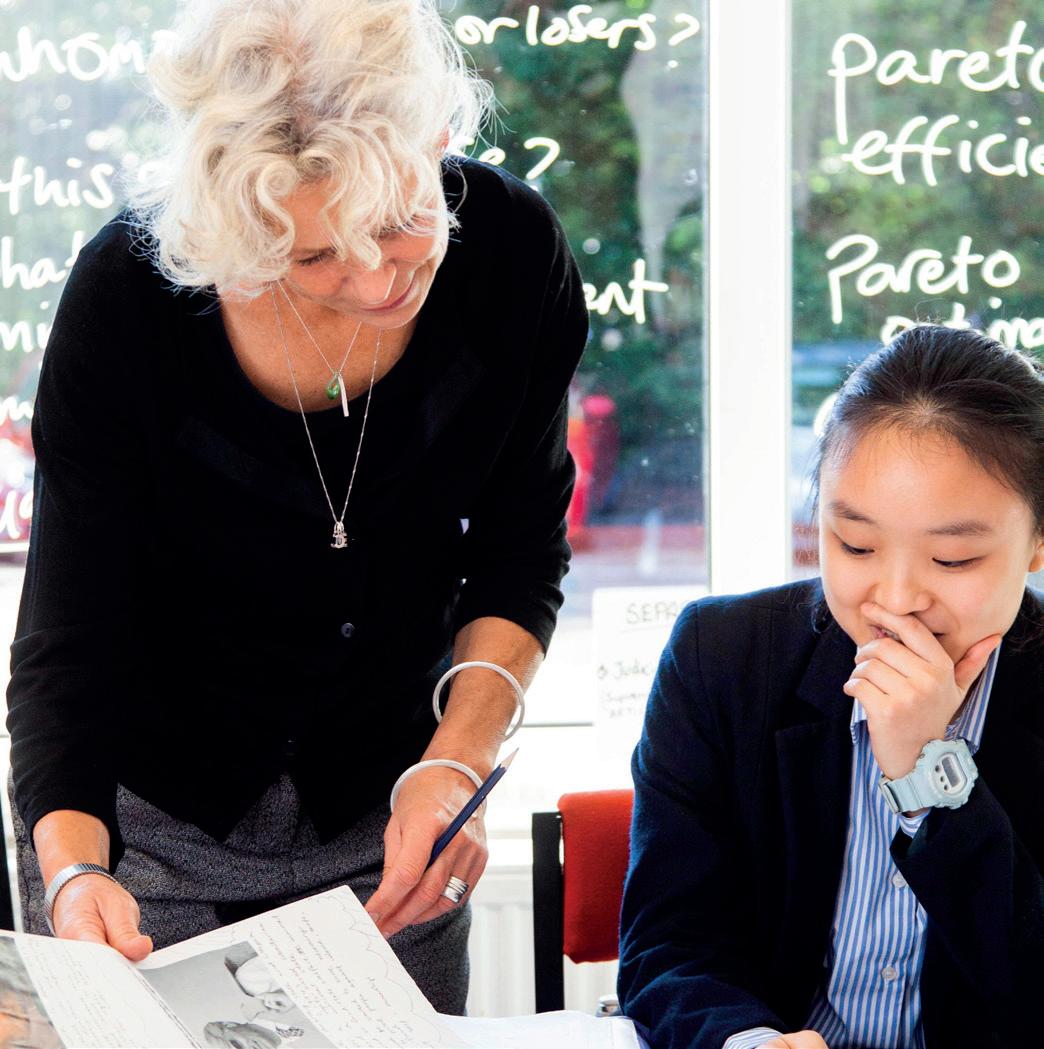
The study of literature can be a life-enhancing and civilising branch of academic enquiry that develops our appreciation of history, culture, philosophy and human behaviour. Analysing and responding to themes, characters and perspectives in texts requires students to define their own moral and ethical viewpoints.

The principal aim of the A level course is to develop students’ interest in and enjoyment of literature so that they become confident, independent and reflective readers. The course encourages engagement with a wide range of literary texts which will challenge students and take them beyond the scope of their reading experience. Some of the texts are set texts prescribed by the exam board and others students will select for themselves. The course encourages students to engage critically and creatively with texts and ways of responding to them and to undertake independent and sustained studies to deepen their appreciation and understanding of English Literature, including its changing traditions. Students can expect to read a wide range of literary texts from across the canon of English Literature, from the Victorian novel and Shakespeare’s plays to a study of 21st century poetry.
A level English Literature students are encouraged to think critically and objectively about the themes they encounter and the ways in which writers shape readers’ responses to them. Successful students are those who can write elegantly, articulating their understanding with sensitivity, sophistication, precision and accuracy.
English Literature A level can complement almost anything. However, it sits naturally with other humanities subjects such as History, RS and modern foreign languages, but also with creative subjects such as Drama and Art. English Literature A level can also be a useful accompaniment to a more scientific A level profile indicating breadth and clarity of thought.
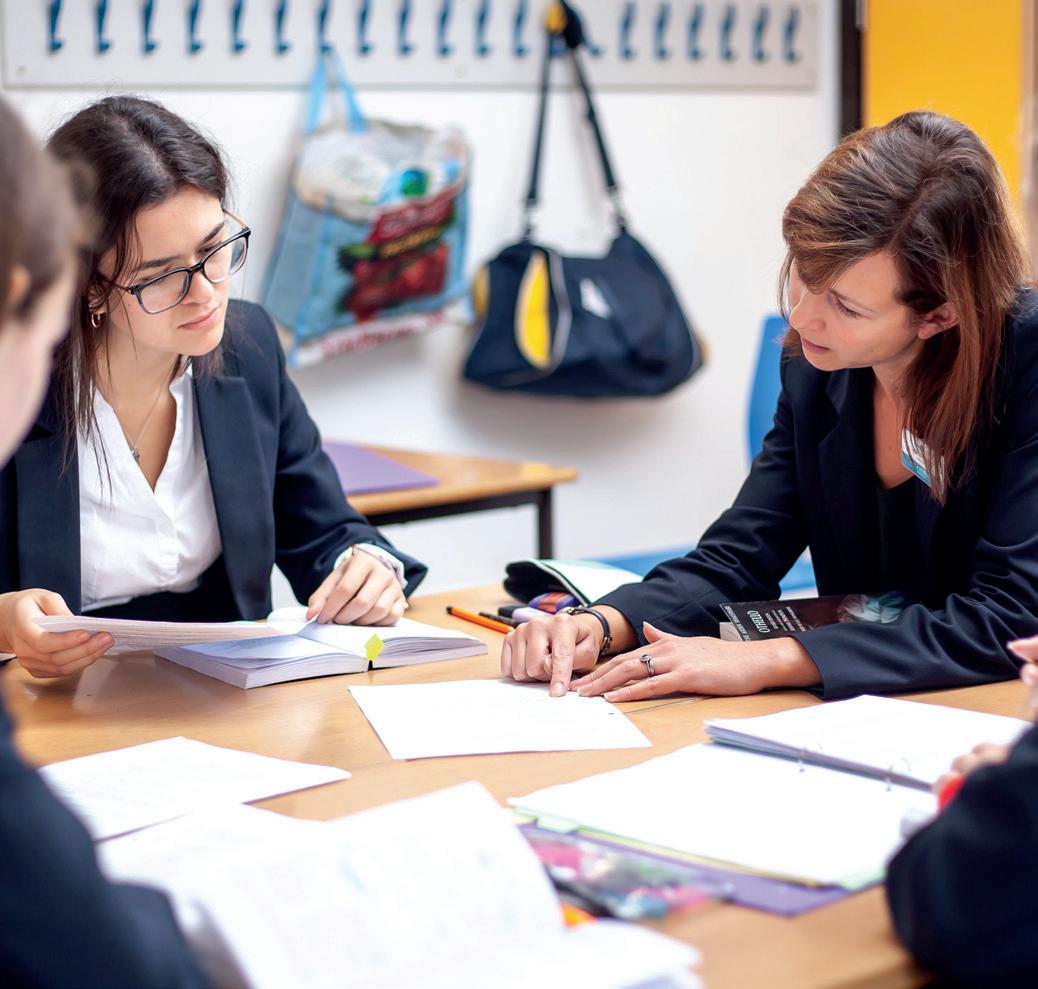
“English Literature gave me a greater understanding of humanity and the past through the study of the stories we tell each other. It gave me a love of reading that will last a lifetime.” Cathryn
Students explore the use of literary and dramatic devices and the shaping of meanings in the two chosen plays. Plays include:
Hamlet , King Lear or Othello by William Shakespeare
The Duchess of Malfi by John Webster
Dr Faustus by Christopher Marlowe
A Streetcar Named Desire by Tennessee Williams
This is comparative study of prose through two thematically linked texts from different contexts. Novels include:

Frankenstein by Mary Shelley
The Handmaid’s Tale by Margaret Atwood
Dracula by Bram Stoker
The Picture of Dorian Gray by Oscar Wilde
The Little Stranger by Sarah Waters
Wuthering Heights by Emily Brontë
Mrs Dalloway by Virginia Woolf
Students consider the concerns and choices of contemporary poets in their study of an anthology of 21st century poetry: Poems of the Decade: An Anthology of the Forward Books of Poetry 2002-2011. They are required to compare an unseen poem with one from this anthology. The second poetry text will be from a specific literary period, such as the Metaphysical Poets, the Romantics or the Victorians.
The coursework unit offers an opportunity to develop a students’ own literary enthusiasms. They choose two texts and prepare a comparative essay exploring links between them by theme, movement, author or period.
A level // English Literature // Burgess Hill Girls
(Course code: 9ETO)
PAPER 1: DRAMA
2 HOURS 15 MINUTES
• Open book
• Two essays
• 30% of A level
PAPER 2: PROSE
1 HOUR
• Open book
• One essay
• 20% of A level
PAPER 3: POETRY
2 HOUR 15 MINUTES
• Open book
• Two essays
• 30% of A level
NEA (NON-EXAM ASSESSMENT)
• Coursework
• Assessed by teachers
• Moderated by Edexcel
English Literature students are highly prized by universities because they have excellent planning and research skills, can handle complex ideas, can find patterns and consider the wider contexts of information. Every year, several girls go on to read English Literature and related courses such as Creative Writing, Journalism and Law.
• 20% of A level ENRICHMENT Creative Writing

The study of French can provide a student access to a whole world, a whole culture, and an entire population. More than 220 million people speak French on the five continents. French is the second most widely learned foreign language after English, and the sixth most widely spoken language in the world. With A level French, students can interact directly with the French-speaking world, be it for reasons of travel, culture, or business.
French is the international language of cooking, fashion, theatre, the visual arts, dance and architecture. A knowledge of French offers access to great works of literature in the original French, as well as films and songs. The ability to speak French makes it so much more enjoyable to visit Paris and all the regions of France and offers insights into French culture, society, politics and way of life. French is also of immense value when travelling to many places that also speak French, including parts of Africa, Switzerland and Canada.
A knowledge of French opens the doors of French companies in France and other French-speaking parts of the world (Canada, Switzerland, Belgium, and the continent of Africa). As the world’s fifth biggest economy and thirdranking destination for foreign investment, France is a key economic player in an increasingly globalised world, and a capacity to speak and read the language with fluency is a hugely attractive asset.
Students studying French A level will build a huge variety of essential skills, such as communication, interpersonal and intercultural interaction, and public speaking. Students will also have the chance to learn about French culture, cinema, literature, fashion, history and politics.
For any student interested in studying French at university or business school it goes well with most subjects: English, Classics, Geography, History, Economics and others. With an A level, students studying any subject at degree level have the opportunity to keep their language skills current, or improve them, using university language schools.
At Burgess Hill Girls, French A level makes use of interactive and contemporary material, and students will have one-toone weekly session with the Assistante, to help perfect their pronunciation and fluency. The language lab is an excellent tool to improve listening skills, giving girls the opportunity to listen to authentic items of news, watch extracts from French television or study videos.
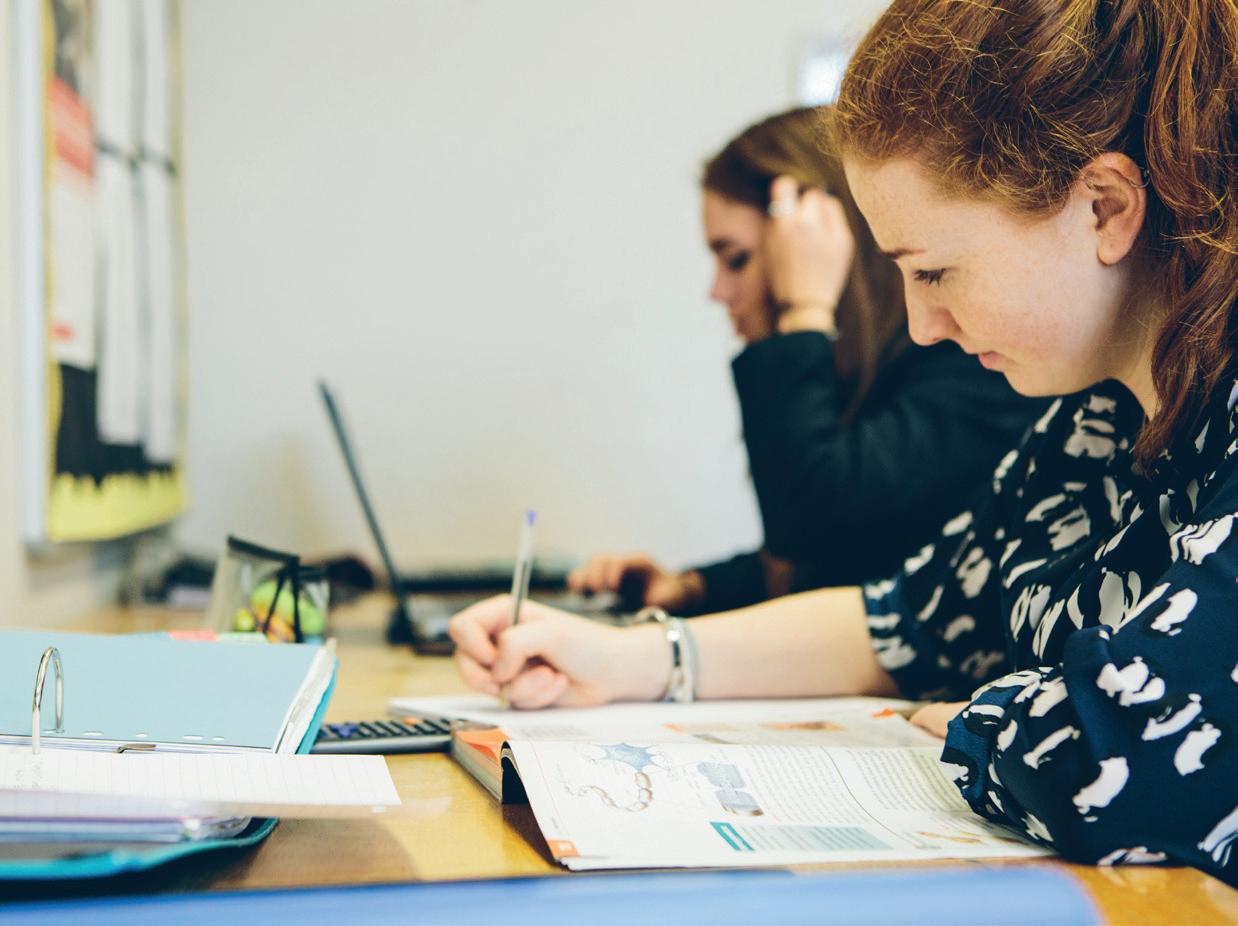
The A level is assessed using three exams:
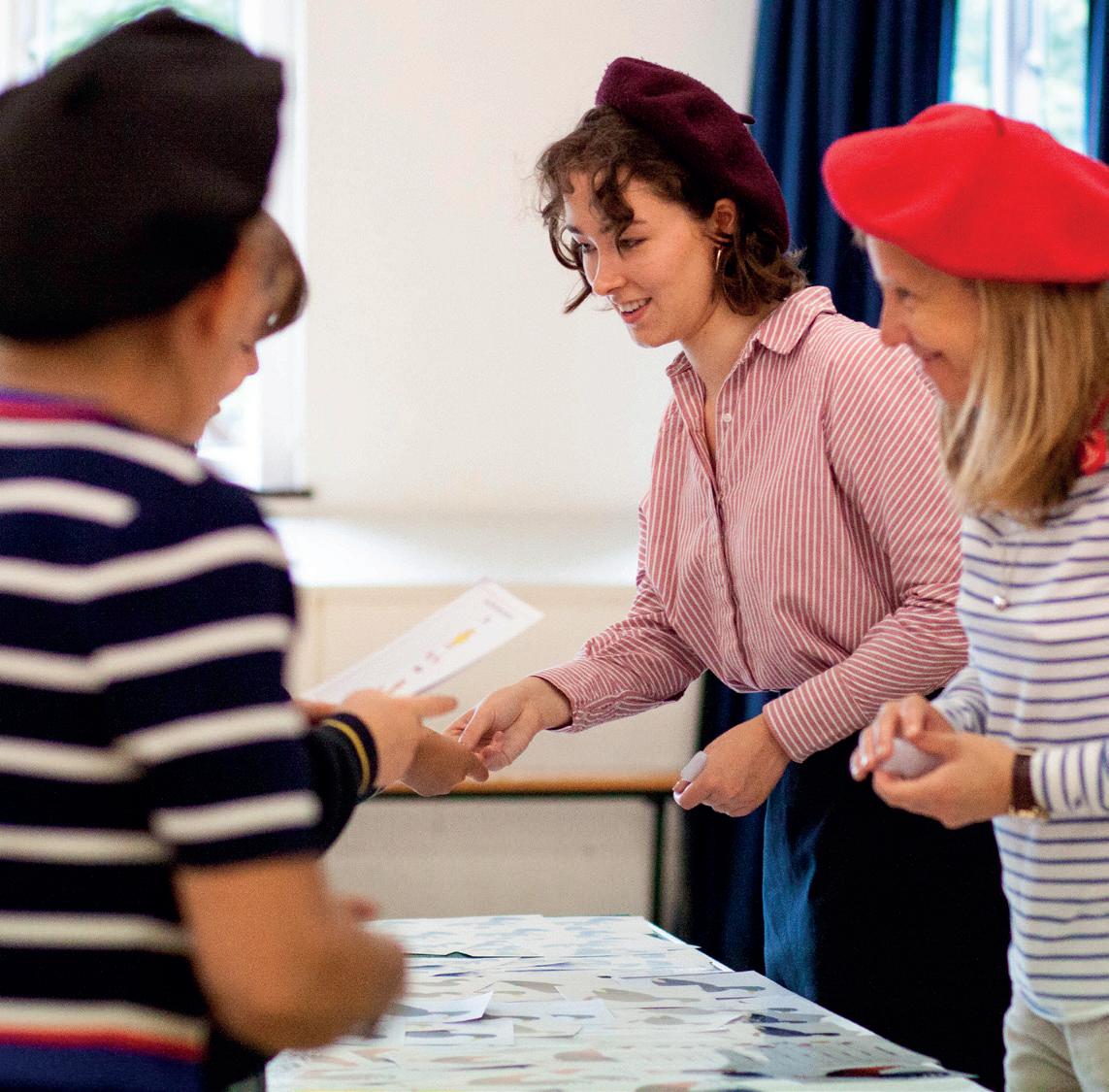
PAPER 1: Listening, Reading and Translation
PAPER 2: Writing in French on two set texts or a text and a film

PAPER 3: Speaking test including an individual research project
AQA A LEVEL FRENCH
(Course code: 7652)
PAPER 1: WRITTEN EXAM
2 HOURS 30 MINUTES
• 100 marks
• 50% of A level
PAPER 2: WRITTEN EXAM
2 HOURS
• 80 marks
• 20% of A level
PAPER 3: SPEAKING EXAM
20-23 MINUTES (INCLUDING 5 MINUTES
PREPARATION TIME)
• 60 marks
• 30% of A level
• Assessed by teacher, marked by AQA

French is a language for the job market as it is an analytical language that structures thought and develops critical thinking. A knowledge of French opens doors to a wide variety of careers, especially those involving translation or communication with people from non-English speaking countries. These can include careers in tourism, government, politics, media, publishing, marketing, banking, law, and journalism.
Geography allows students to study the world and our place in it. It bridges the study of the natural world with that of human behaviour, and investigates both in depth, as well as the relationship between them. For students who wish to comprehend the world better through first-hand field work, or study up close the effects of population growth and pollution, or comprehend fully how the earth itself was formed and continues to change, Geography is the right choice.
In physical geography, students examine why our physical environments and landscapes appear as they are, how they form and operate, and how they inter-relate at various scales. Despite living in an increasingly modern and seemingly manufactured world, mankind will forever rely on the environment. Whether it is the ability to grow crops, the capability to stock-pile water or the power to pre-empt natural disasters, the study of our environment and the geography of the planet plays a vital role. Changes and stability in human and physical worlds, including the causes, rates and patterns of change and the prediction of change to the foreseeable future. Topics covered within the A level include water and carbon cycles, coastal systems and landscapes, and natural hazards.
Geography also involves the study of human behaviour, and the extent to which this behaviour differs in regards to the environment. By studying the geography of a country, we can start to understand why certain cultures farm certain crops, or why a particular set of people design their houses in a particular way. By being exposed to a world of drastically different people, a budding geographer studies the rich tapestry of human life. Topics covered within the A level include global systems and global governance, changing places, and contemporary urban environments.
Geographers also benefit from the powerful skills they develop through studying the A level. Students learn how to observe, describe, analyse, represent, interpret and report information about the world, and build valuable intellectual skills, such as critically evaluating theories and judging evidence in order to make informed decisions and to develop reasoned arguments. On top of this, students test their research skills, using a range of technical methods for the collection and analysis of spatial and environmental data, and undertaking fieldwork. For the A level’s non-examined assessment element, students carry out a geographical investigation which must include data collected in the field. The individual investigation is based on a question or issue defined and developed by the student relating to any part of the specification content, and involves a field trip to the Isle of Wight for data collection.
For students who are already thinking ahead to potential university and career choices, it is worth bearing in mind that Geography is a broad based subject that develops the knowledge, skills and enthusiasm sought by higher education and employers. For example, for careers in sustainability and green issues, urban regeneration, energy supply, retail location, managing the effects of hazards and climate change, A level Geography is an obvious choice.
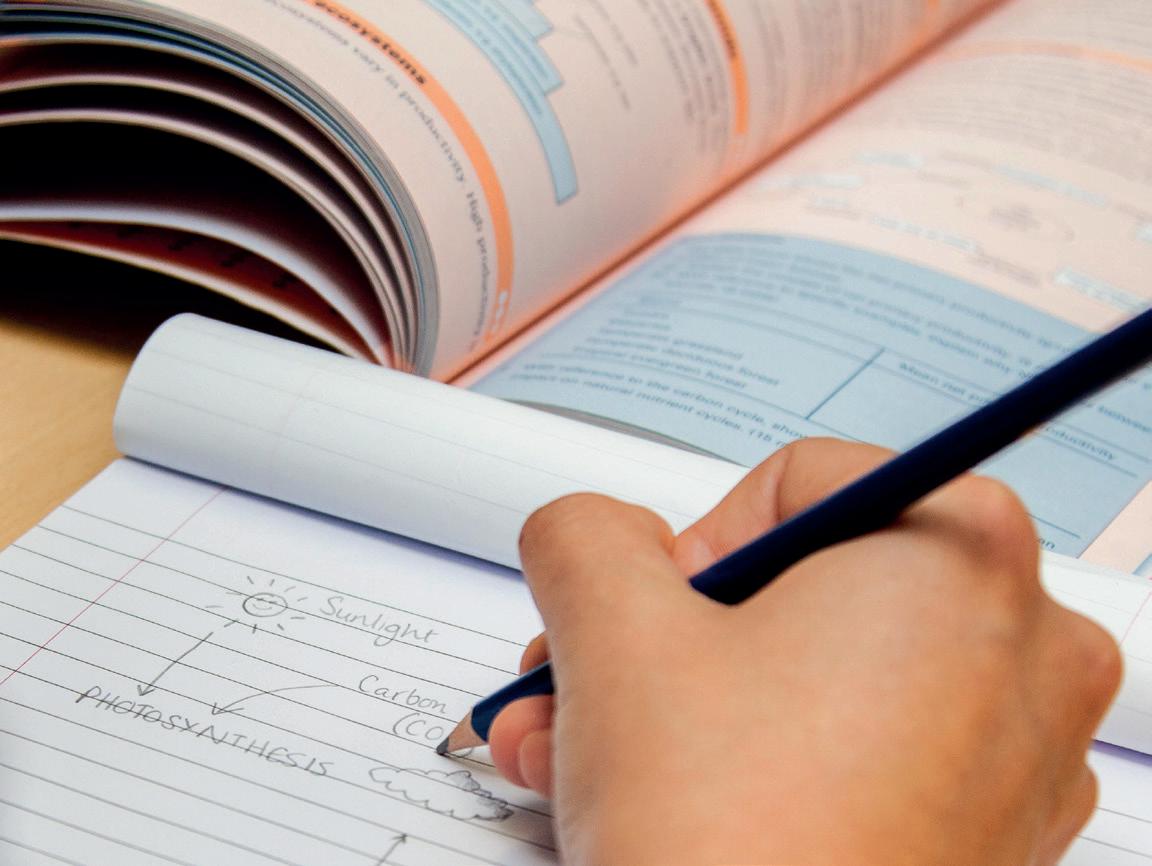
SCHEME OF ASSESSMENT
PHYSICAL GEOGRAPHY TOPICS:
• Water and carbon cycles
• Coastal systems and landscapes
• Hazards
HUMAN GEOGRAPHY TOPICS:
• Global systems and global governance
• Changing places
• Contemporary urban environments
AQA A LEVEL GEOGRAPHY
(Course code: 7037)

PAPER 1: WRITTEN EXAM
2 HOURS 30 MINUTES
• 120 marks
• 40% of A level
PAPER 2: WRITTEN EXAM
2 HOURS 30 MINUTES
• 120 marks
• 40% of A level
NEA (NON-EXAM ASSESSMENT)

• 60 marks
• 20% of A level
• Assessed by teachers
• Moderated by AQA
Geography graduates are taking up roles that may appear more loosely related to the subject, but nonetheless draw on the wide ranging skills and knowledge the subject develops. Nearly one-fifth find work in business, finance and human resources, and more than 10 per cent go into marketing, public relations and sales.

Lectures by the Royal Geographical Society
Local and Internatioal Field Trips
Germany is one of the world’s biggest industrial countries and economic powerhouses. Germany is also currently the United Kingdom’s biggest trading partner in Europe. More people speak German as their native language than any other language in Europe. It’s no wonder, since Germany’s 83 million inhabitants make it the most populous European nation. But not only the residents of Germany speak German. It is also an official language of Austria, Switzerland, Luxembourg, and Liechtenstein. It is the native language of a significant proportion of the population in northern Italy, eastern Belgium, the Netherlands, Denmark, eastern France, parts of Poland, the Czech Republic, Russia, and Romania, as well as in other parts of Europe. Despite Germany having the largest number of native speakers in Europe, few people outside the country actually speak the language, which means that the ability to communicate in German is of considerable economic and commercial value. It also allows access to a wealth of intellectual, philosophical, scientific and musical creativity.
Studying an A level in German readily complements an interest in history and culture, in current affairs and politics, international relations and law, in travel or tourism, in literature, or in journalism and the media, not to mention the opportunities it allows for studying the primary sources of many of the most significant and influential scientific and philosophical works. It enables students to develop interpersonal and study skills and learn much more about aspects of the societies in which German is spoken. They gain a profound insight into the rich variety of literary and artistic culture and may choose to take advantage of the popular option to study and write about a prize winning film.
The learning experience is varied, involving use of the state-of-the-art language laboratory facilities, a regular appointment with a highly experienced German native speaker, discussion of German news broadcasts, and immersion in the rich library of extension materials, DVDs, books and magazines that can take students far beyond the demands of the examination specification. As part of the course’s speaking test, an independent personal research project gives students the freedom to individually investigate, in considerable depth, an area of particular interest related to the German speaking world. Discussion of the findings forms the basis of much of the test and the project hones research and discursive skills.
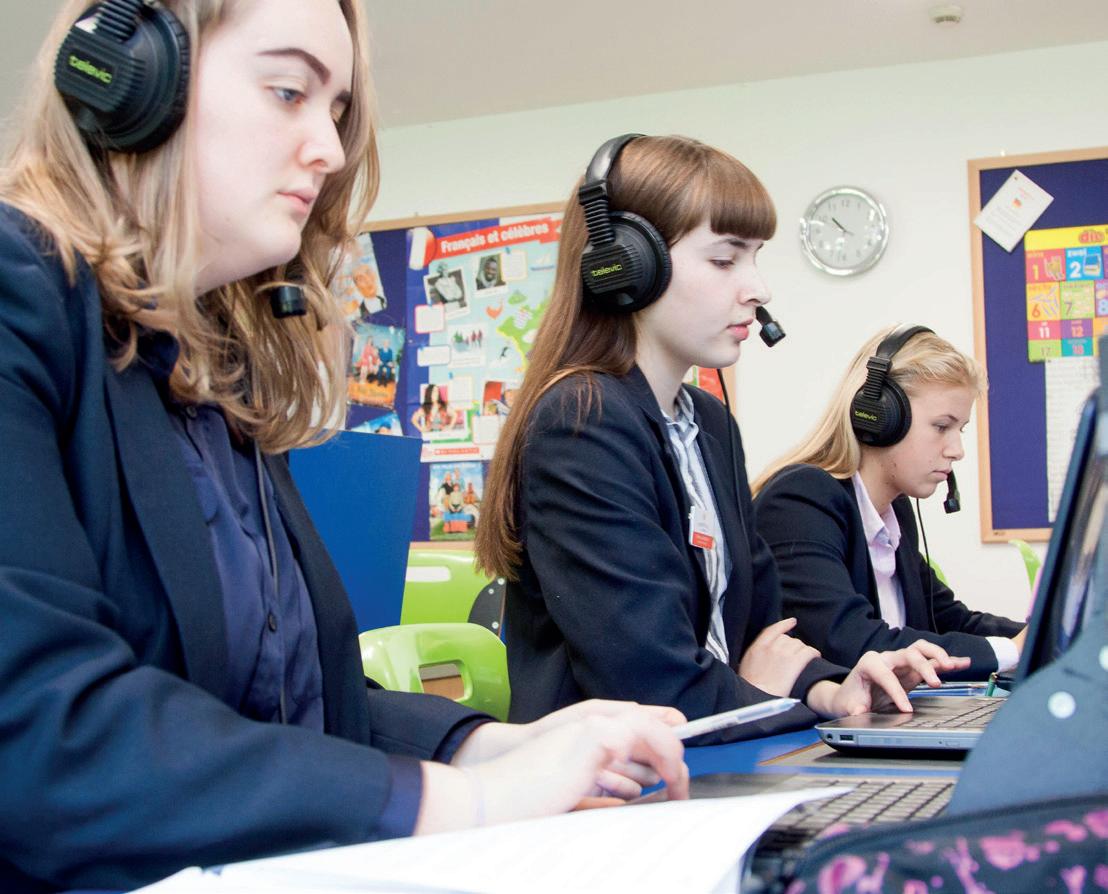
(Course code: 7662)


PAPER 1: LISTENING, READING AND WRITING 2
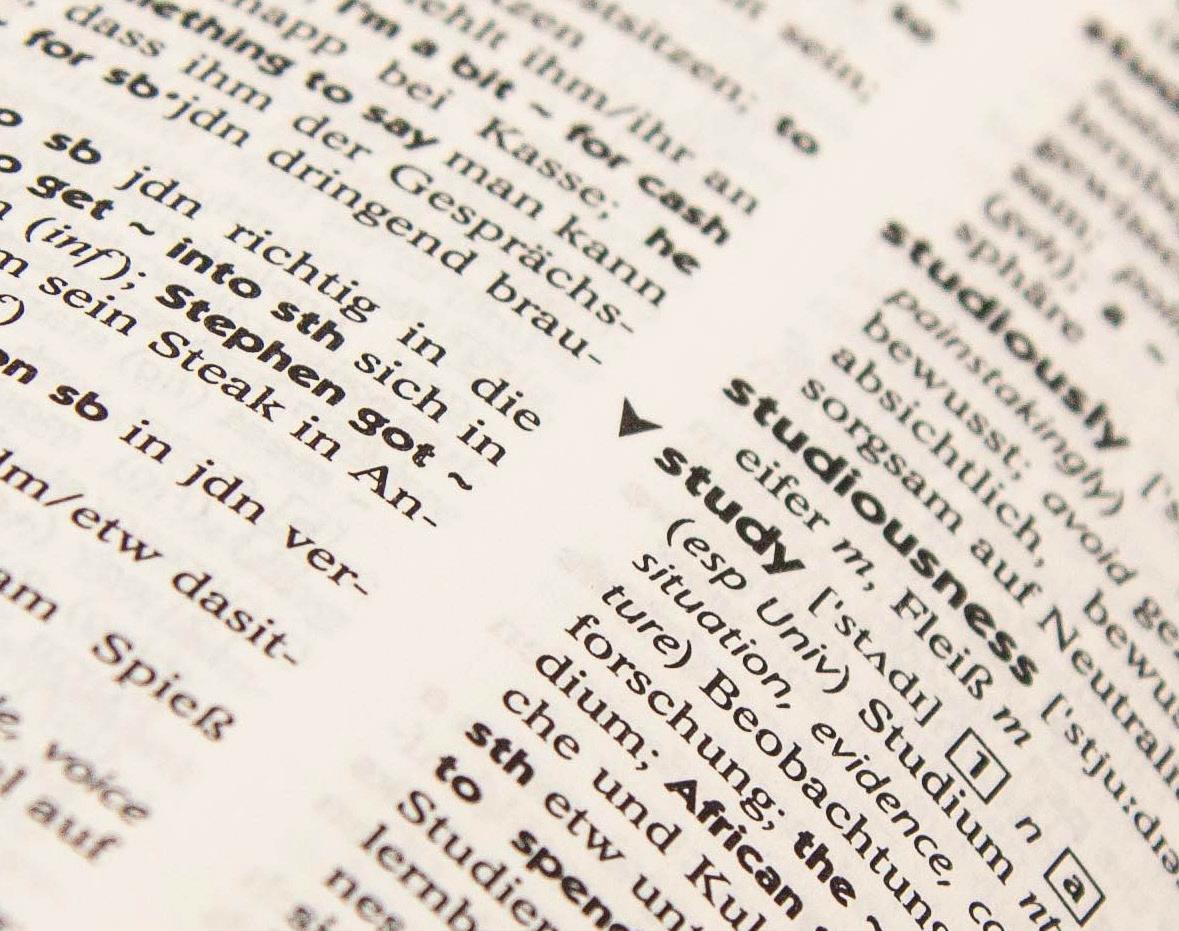
HOURS 30 MINUTES
• 100 marks
• 50% of A level
PAPER 2: WRITING
2 HOURS
• 80 marks
• 20% of A level
PAPER 3: SPEAKING
21-23 MINUTES INCLUDING 5 MINUTES
PREPARATION TIME
• 60 marks
• 30% of A level
Many of our students go on to study degree courses in languages, and others choose to pursue a higher education course in another subject, but choose a language option alongside it. Having a language at A level will improve employability, in particular with companies which have international branches. There is also much personal pleasure to be gained through travel, understanding of other cultures and places.
“In German we enjoy learning more than just the language. We learn about literature, culture and history. I am delighted that I will continue to study German as part of my degree.”
Stefani
History A level provides the two fundamental attributes required of a historian: a deep and enduring understanding of the past, and the capacity to identify bias and prejudice in sources. Today, with events that seemingly parallel some of the most challenging moments in our past, and a widespread perception that the information we can access is potentially tainted or ‘fake’, the skills and understanding given by History A level are essential. There is no greater means to understand the present, and to offer meaningful input into solving some of today’s challenges, then through learning about human history.
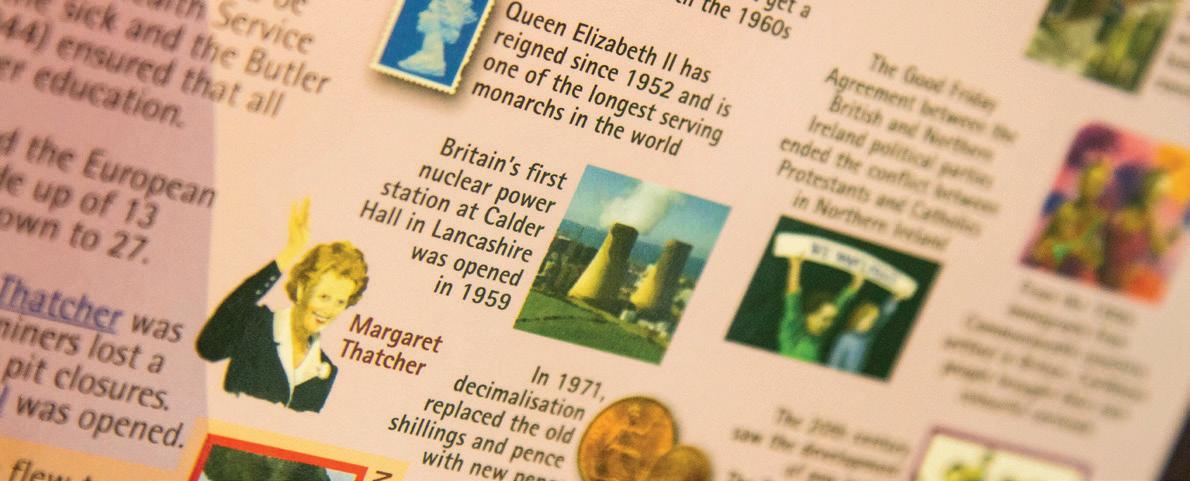
There is no other subject that deals so well with identifying what is useful and reliable evidence and what must be sifted out, discerning what is credible and compelling from the myriad influences and voices around us. Historians are capable of evaluating the reliability and usefulness of material in order to better understand the contemporary world. Successful history students can write and sustain an argument, develop excellent research skills and can access a lot of learned content under pressure. They can reject unreliable sources and analyse reliable ones, often taking pleasure in independently reading around the subject in order to learn more.
The History A level at Burgess Hill Girls covers a rich variety of fascinating subjects which equip our students with the tools of a historian, and a greater understanding of their place in history. The first year course covers post-war Britain as it changes from the ‘affluent society’ of the 1950s – when Britain apparently “never had it so good” – through the ‘Swinging Sixities’ and the “White Heat of the technological revolution”, to the social upheaval of the ‘Winter of Discontent’ that ushered in a new political dawn. The second year looks at what drove the actions of key political figures, including the ideas that defined the agendas of Thatcher and Blair, and the relative benefits and demerits of their policies. This was a time of race riots, miners’ strikes, the Falkland’s War, the creation of New Labour and endless arguments over Britain’s relationship with Europe.
Our students end the course with a full understanding of how our contemporary social and political environment developed.
The second half of the course covers the turbulent history of Russia from the collapse of the Tsarist regime to the brinkmanship of the Cold War. The events covered in this course had immense repercussions for world history, from almost giving Germany victory in the First World War, through launching the world’s first functioning Communist state, the horrors of Stalin’s Terror, victory in the Second World War, to becoming one of only two Superpowers in a new global order, confronting the US in a dichotomous struggle throughout the world, tinged with the threat of nuclear annihilation.
History is one of the most flexible A level subjects available, complementing many others, especially English, Classics and modern foreign languages. As well as providing the essential training for anyone seeking to become a historian, it is widely recognised as one of the most intellectually rigorous A levels, teaching a variety of skills that are easily transferable into many other subjects.
Everyone is strongly influenced by their understanding of history. This is one reason why every student should consider studying the past: to comprehend the way it shaped the present, both through what happened and how we interpret it. A deeper knowledge of history will enable students to put contemporary thoughts and actions into contexts which make them more understandable. In short, the study of the past is at the centre of human enquiry.
PAPER 1: Tsarist and Communist Russia 1854 to 1964
PAPER 2: Making of Modern Britain 1951 to 2007
NEA (NON EXAM ASSESSMENT)
3,500 word enquiry.

The enquiry is based the on Tudor Rebellions and is completed in the Upper Sixth year.
PAPER 1: WRITTEN EXAM
2 HOURS 30 MINUTES
• 80 marks
• 40% of A level
PAPER 2: WRITTEN EXAM
2 HOURS 30 MINUTES
• 80 marks
• 40% of A level
NEA (NON EXAM ASSESSMENT)

• 50 marks
• 20% of A level
• Assessed by teachers
• Moderated by AQA
There are numerous careers and university pathways that require the skills that are honed in the study of History at A level: law, medicine, media, business, finance, accountancy, tourism, town planning, politics and journalism.
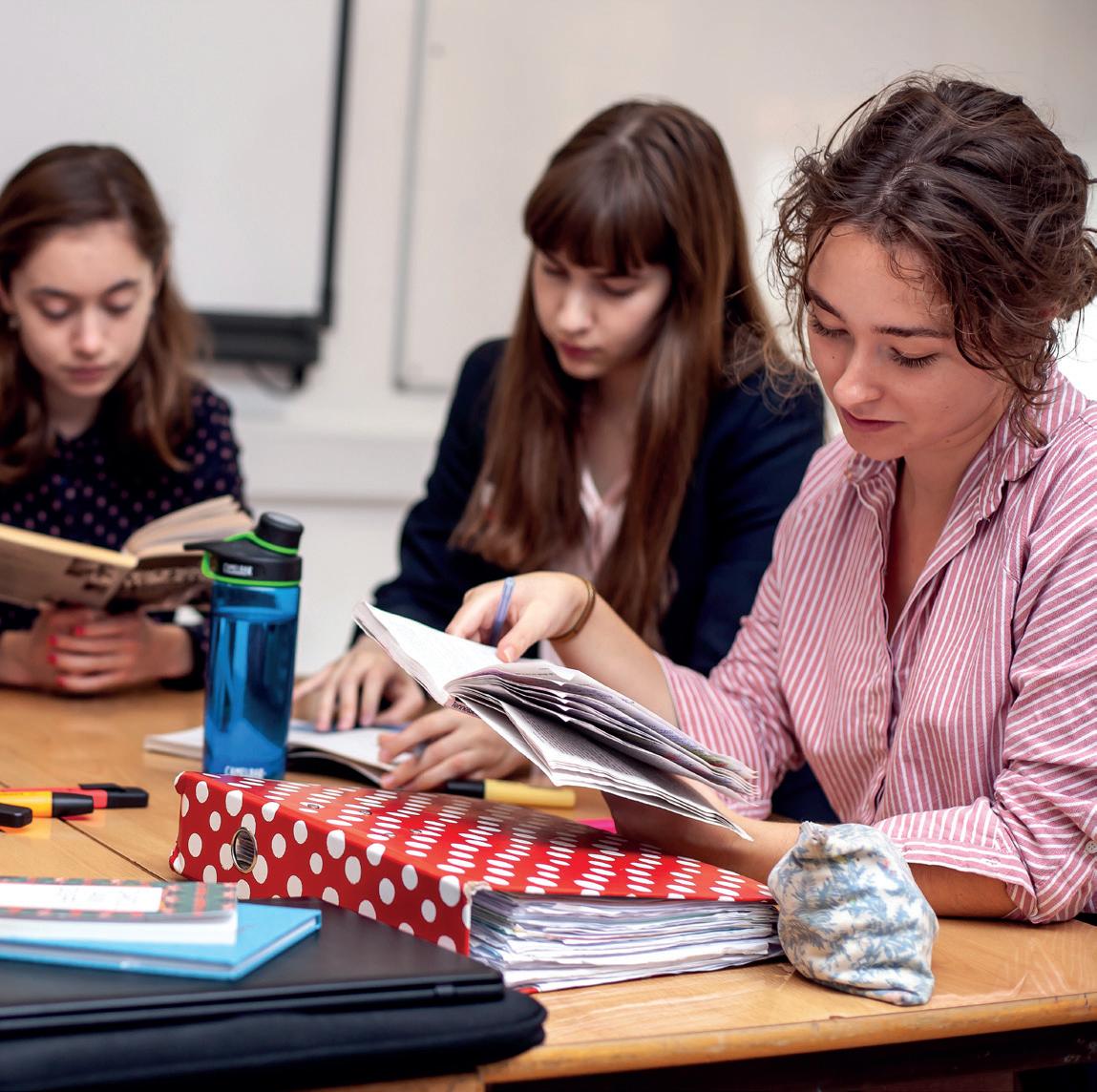
Attend Student Seminars
Subject trips
Latin A level is so much more than a language, although the language is in itself a true delight. A love of Latin GCSE is the best prerequisite for the course and those who enjoyed at GCSE, will revel in it at A level. The A level course content is a further compelling reason to select it. The set texts below give a flavour of the course content:
A level Latinists will study a subject that is universally recognised for its academic rigour. They will gain superior skills of synthesis, analysis and evaluation and will have a meticulous eye for detail. The grasp of grammar and skills of literary criticism supports other linguistic pathways. When faced with difficulties, a Latinist will resort to logic and will be adept at asking questions and considering hypotheses to solve a puzzle. As part of a small, vibrant department with plenty of opportunities for leadership and new experiences, life is rarely dull. Some choose to learn Greek in addition, watch Greek Tragedy and attend symposia. The very popular Classics trip is a further wonderful opportunity.
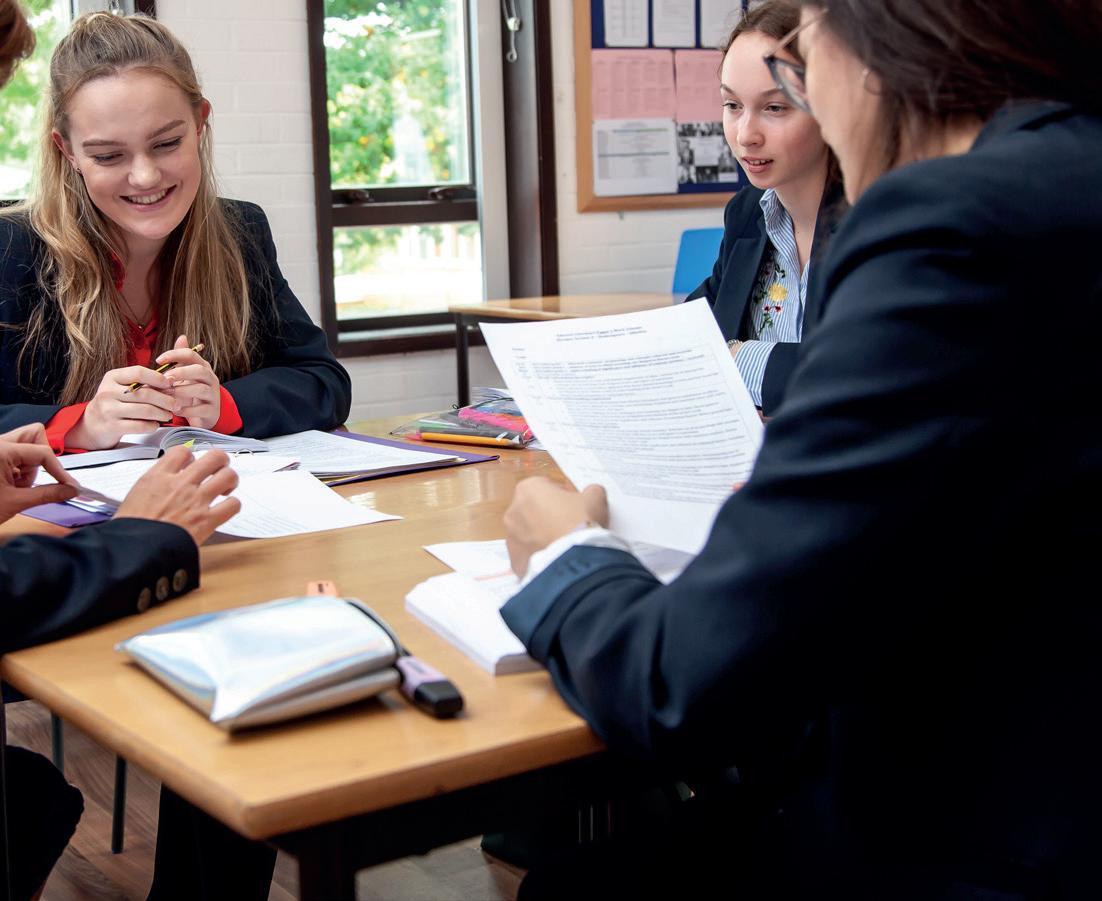
This selection from Tacitus’ famous historical work is set in the reign of Rome’s second emperor, Tiberius and follows the rise of Sejanus, the Praetorian Prefect. As Tiberius comes to rely on Sejanus in his running of Rome, Sejanus’ taste for power increases. Expect betrayal and treason!
Catullus’ poems recreate what life was like for a young poet in ancient Rome. Some of the most-known poems of Latin literature are included in this selection, which deals with love, death and happiness. These poems will get all your emotions going!
‘Blazing with rage, he plunged the steel full into his enemy’s breast.’ (Virgil) The final denouement in this twelve-book epic by Virgil sees the hero Aeneas meet his foe Turnus in battle. Probably the biggest cliff hanger since Avengers: Infinity Wars, this selection will have you on the edge of your seat.
If the Aeneid is the prequel, then this selection from Livy is the original saga, making up some of the most well-known stories of Roman history. From the foundation myth of Romulus and Remus, to the rape of Lucretia, to the expulsion of the kings from Rome, this selection has it all. One for true Roman fans.
Students will also gain a wider understanding of Roman Love Elegy, mythology, historiography and Roman history whilst preparing for the unseen translation. Our authors will be Ovid and Livy.
SCHEME OF ASSESSMENT
UNSEEN TRANSLATION
COMPREHENSION OPTION
(Not writing Latin)
PROSE LITERATURE
OCR A LEVEL LATIN
(Course code: H443)

PAPER 1: WRITTEN PAPER
1 HOUR 45 MINUTES
PAPER 2: PROSE COMPOSITION OR COMPREHENSION
1 HOUR 15 MINUTES
PAPER 3: WRITTEN PAPER
2 HOURS
PAPER 4: WRITTEN PAPER
2 HOURS
“Latin is my favourite A level because it is such a diverse subject. I love the literature the most, but the language work is really useful for all my other subjects.”


VERSE LITERATURE Cathryn
A level proficiency in Latin can provide a skill set of intellectual precision, analysis and cultural awareness which can be used directly or generally to enhance higher education and employment prospects.
Learn Ancient Greek Theatre Visits
Overseas Trips
Mathematics is a fascinating, challenging and stimulating subject with the capacity to push intellectual boundaries. It can be used to make sense of an increasingly complex world and provides the problem-solving tools essential to virtually all fields of endeavour.
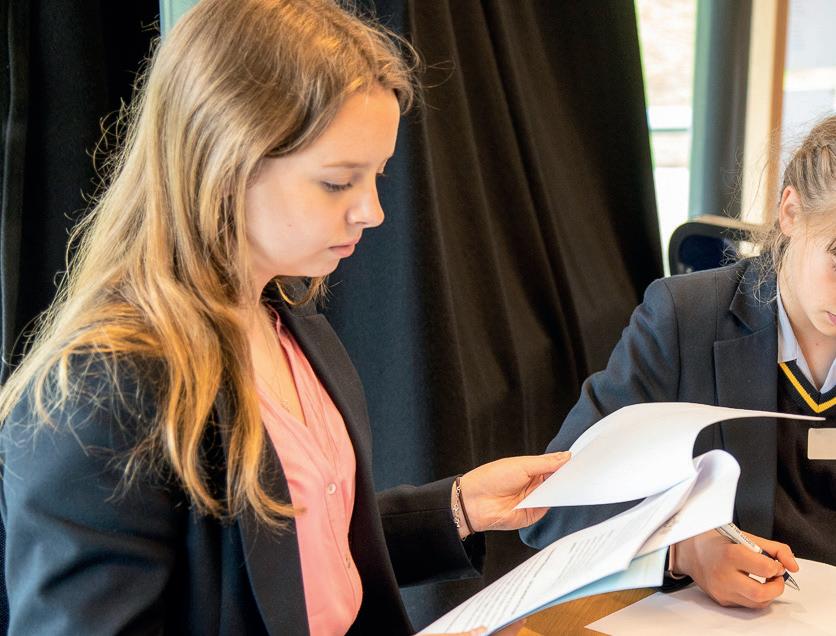
Mathematics underpins most of science, technology and engineering and is also important in areas as diverse as business, law, nutrition, sport science and psychology. It supports a wide range of other A level subjects; Economics, Psychology, the sciences, Computer Science and Geography all benefit from students having fluent and confident numerical, algebraic, graphical and statistical skills. The skills developed through the study of Mathematics at A level are in high demand from employers. In addition to developing the ability to solve problems and think logically, the study of Mathematics provides opportunities to develop team-working skills, resilience, effective communication of complex ideas and the ability to use your own initiative; the breadth of application is immense.
A level Mathematics extends techniques covered at GCSE and introduces new methods and concepts, providing a mix of pure and applied Mathematics. Pure elements include familiar topics such as Algebra, Functions and Coordinate Geometry, as well as new topics such as Sequences and Series, a wider view of Trigonometry, Calculus, Numerical methods and Vectors. Applied topics cover key areas of mechanics and statistics.
Mechanics aims to model the physical world by developing concepts to apply to the understanding of motion and forces acting on objects. Techniques can be used to explain
how forces are combined to cause movement and the impact of forces such as weight and friction.
Statistics explores the complex field of probability and explores how an understanding of chance can predict future events and inform important decision making. Combined with this is the understanding of data, including the larger sets of data used by modern technology. Statistical techniques, such as sampling and hypothesis testing, are used to analyse and present data in a rigorous and meaningful way.
Further Mathematics is a second qualification that can be taken in addition to A level Mathematics. This aims to provide an opportunity for enthusiastic mathematicians to broaden and deepen their subject knowledge. It is most suitable for students who are thinking of studying for a Mathematics, Engineering, Physics or similar degree. It is also suitable for those students who simply love Mathematics and want to devote more time to studying wider aspects of the subject.
At Burgess Hill Girls, A level courses in Mathematics and Further Mathematics are a popular choice. Our experienced teachers recognise the need to support the individual needs of every girl, regardless of her reasons for choosing to study these subjects. Support for girls aiming to study Mathematics at Oxbridge and other universities is offered, as well as competitions, trips and other events that aim to develop the mathematical curiosity and enthusiasm of our students.
SCHEME OF ASSESSMENT
MATHEMATICS:
PAPER 1: Pure Mathematics and Mechanics
PAPER 2: Pure Mathematics and Statistics
PAPER 3: Pure Mathematics and Comprehension
FURTHER MATHEMATICS:
PAPER 1: Pure (Core) Mathematics
PAPER 2: Minor Option (Numerical Methods)
PAPER 3: Minor Option (Statistics)
PAPER 4: Minor Option (Mechanics)
“Maths is an essential skill for making sense of the world. Its capacity to bring order to our ideas and rigour to our understanding is beyond measure.”
OCR (MEI) MATHEMATICS
(Course code H640)

PAPER 1: WRITTEN EXAM
• 36.4% of A level
PAPER 2: WRITTEN EXAM
• 36.4% of A level
PAPER 3: WRITTEN EXAM
• 27.3% of A level
OCR (MEI) FURTHER MATHEMATICS

(Course code H645)
PAPER 1: WRITTEN EXAM
• 50% of A level
PAPER 2: WRITTEN EXAM
• 16.6% of A level
PAPER 3: WRITTEN EXAM
• 16.6% of A level
PAPER 4: WRITTEN EXAM
• 16.6% of A level
ENRICHMENT
UKMT Maths Challenges
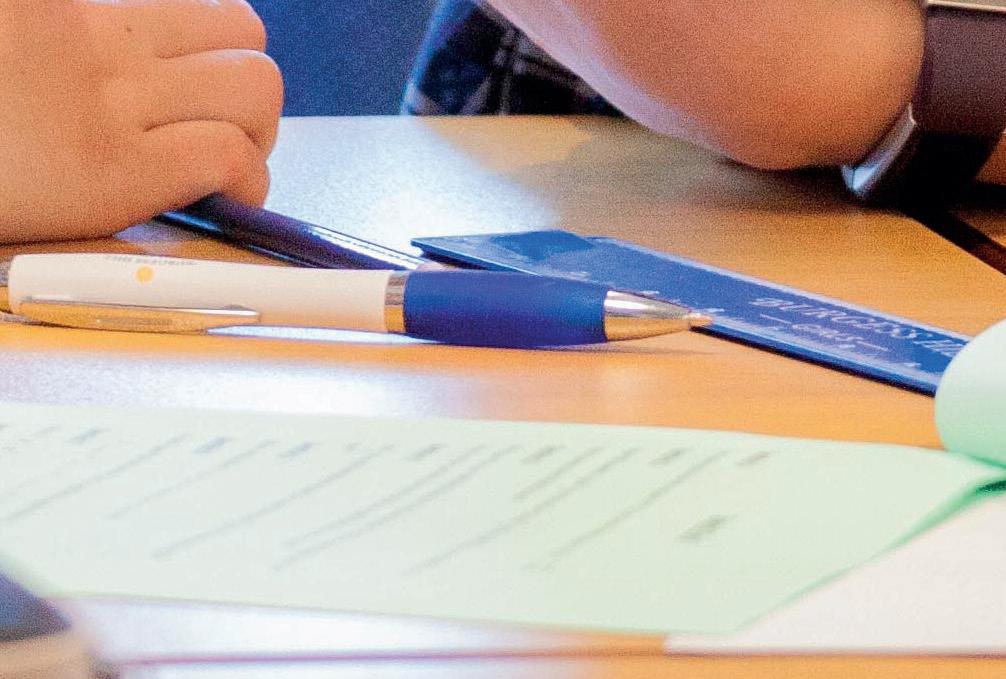
Trips to mathematical talks and conferences
Preperation for Oxbridge applications
Music is a vital part of the way we communicate and interact with the world around us. A level Music develops both a deeper understanding of the nature and language of music, a broader awareness of its cultural and historical contexts and enhances a student’s listening, performing and compositional skills.
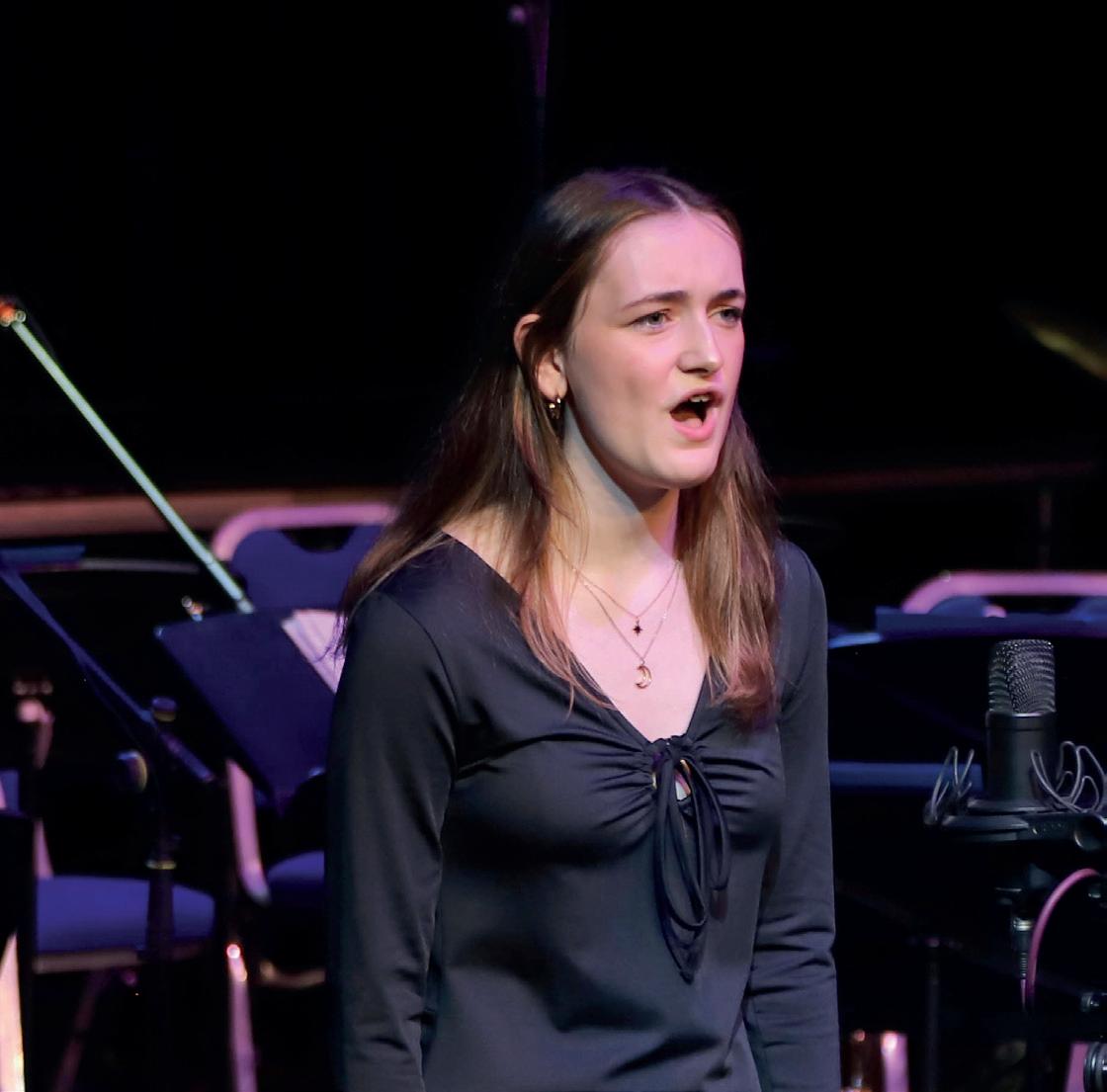
Studying Music helps to develop problem solving skills, independent research tasks, planning, analytical and critical thinking skills, as well as develop creativity. Other transferrable skills include self-discipline, composure under pressure, time management, communication, team and individual working ability – all gained from practice and performing. Students also learn technical skills through using computers, recording equipment and software to create and record music.
We follow the AQA syllabus and on this course students will develop performance skills, compose music and learn about harmony. Students will build up aural and analytical skills by studying a selection of set works. They are encouraged to engage critically and creatively with a wide range of music and musical contexts, develop an understanding of the place of music in different cultures and contexts, and reflect on how music is used in the expression of personal and collective identities.
“This is a fantastic subject to take at A-level, combining creativity with academic rigour. You will discover and study a really broad range of exciting music; learning about significant stylistic features and how it was written. You will develop compositional technique through the study of Bach Chorale writing and take your own personal style to a more advanced level.”
COMPONENT 1:
• Section A - Listening
• Section B - Analysis
• Section C - Essay
COMPONENT 2:

• Solo and/or ensemble performing as an instrumentalist, or vocalist and/or music production (via technology)
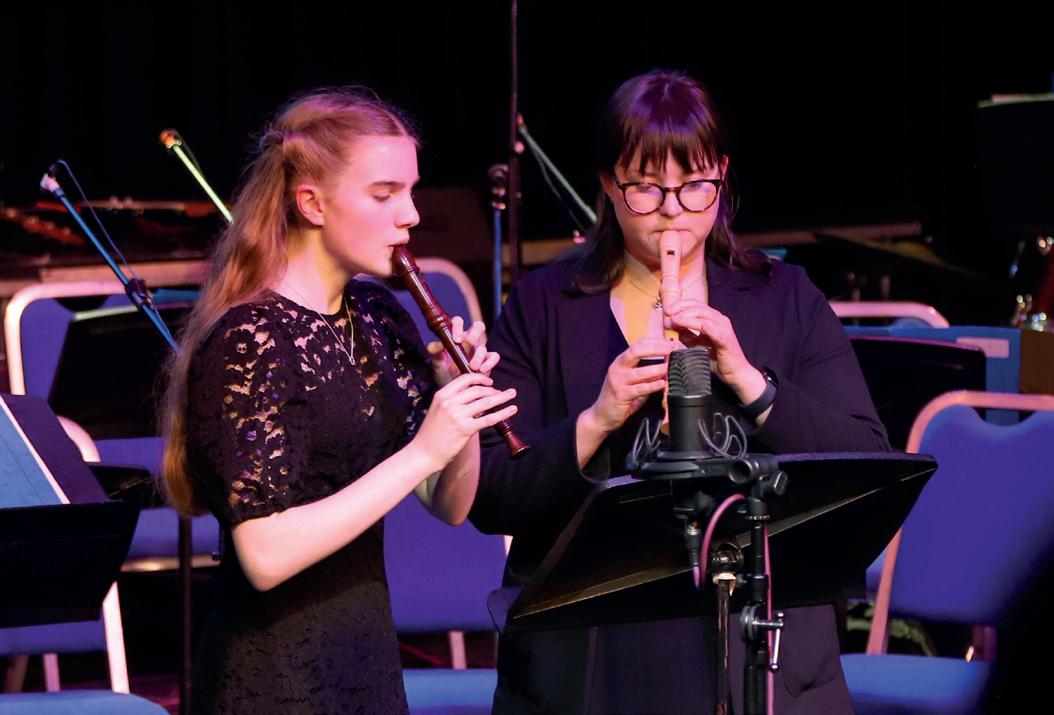
• Students must perform a recital for a minimum of ten minutes
COMPONENT 3: • Composition to a brief

Free composition • Programme Notes (150 words per composition) • A minimum of 4½ minutes of music is required in total
AQA A LEVEL MUSIC, SPECIFICATION A
(Course code: 7272)
COMPONENT 1: WRITTEN EXAM
2 HOURS 30 MINUTES
• 120 marks
• 40% of A level
COMPONENT 2: PERFORMANCE
• 50 marks
• 35% of A level
COMPONENT 3: COMPOSITION
• 50 marks
• 25% of A level
Senior Orchestra, Senior Choir, Jazz Band Ensembles
Direct and help run ensembles
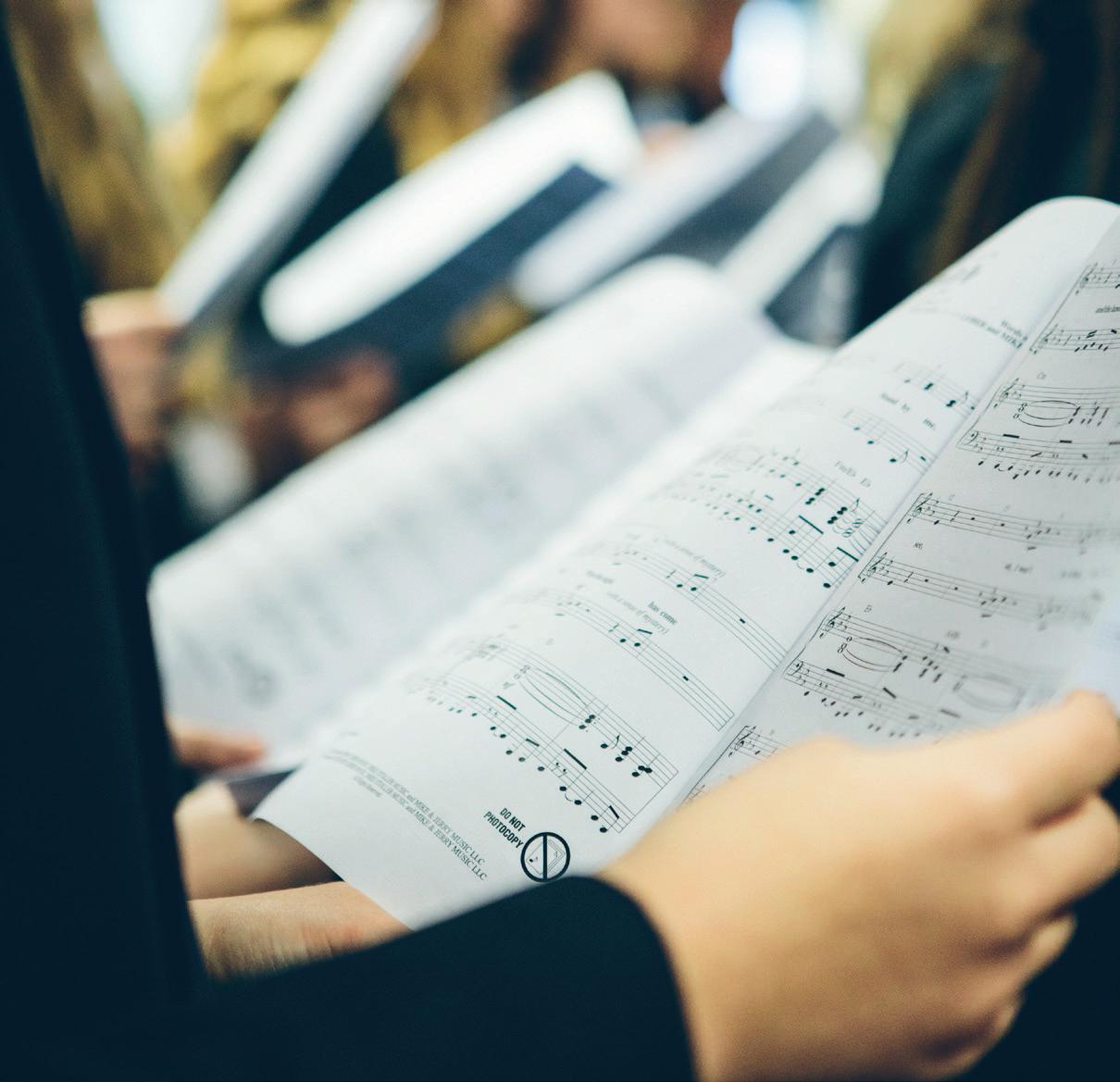
A level Physical Education has been designed to allow students to play to their strengths and gain dynamic theoretical and practical skills for further education or work. Those that have enjoyed the GCSE course will most definitely enjoy building on their existing knowledge. The scientific areas of the course provide students with the opportunity to develop their knowledge and understanding of the changes that take place within the body’s systems during exercise, as well as interpreting data and graphs relating to factors that affect the body during different types of exercise and recovery. In addition, students will enhance their knowledge of training principles and the different methods used to improve performance. They will also study the basics of motion and forces, and their relevance to different physical activities. Using biomechanical definitions, equations, formulae and units of measurement, they will analyse data and performance.
‘Skill Acquisition and Sports Psychology’ focuses on the impact of psychological factors on participation, as well as developing an understanding of how psychology can be used to help optimise performance. Topic areas include personality types and traits, types of motivation, and the psychology of teamwork.
In ‘Sport and Society’, students learn about the development of sport as early as pre-industrialisation through rationalisation and to the emergence of modern sport and its globalisation in the 21st century. Students will study the social factors that have influenced the development of football, tennis and athletics. The module also looks at the interrelationship between Sport England, local and national partners who work hard to try and increase participation at grass roots level, as well as encouraging under-represented groups in sport, and understanding how individuals can benefit from engaging in a healthy, balanced lifestyle.
In the practical element of the course, students are asked to perform (or coach) in one physical activity. They have to participate in a ‘full-sided’ version of the game and undertake a written and verbal analysis of someone participating in that sport. This takes place over a two-year period, allowing plenty of time for students to develop their practical and analytical skills, as well as time to gain video evidence of practices and competition to ensure they maximise their marks.
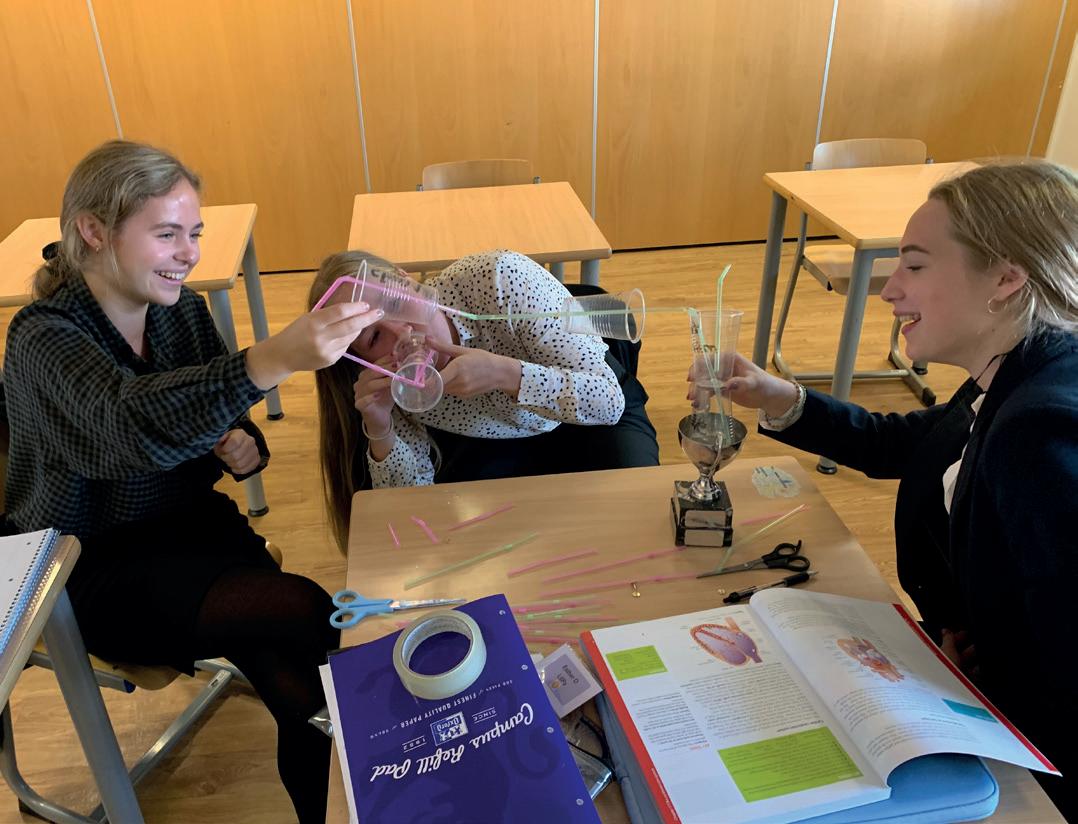
The course is a nice balance of theory and practice with practical examples being used where possible. Girls have experienced ice baths, completing their own taping methods, making their own sports fuel food and undertaken sports psychology experiments. It is rewarding and exciting and in a world where sport is a multibillion-pound business, there are numerous opportunities to be involved in it.
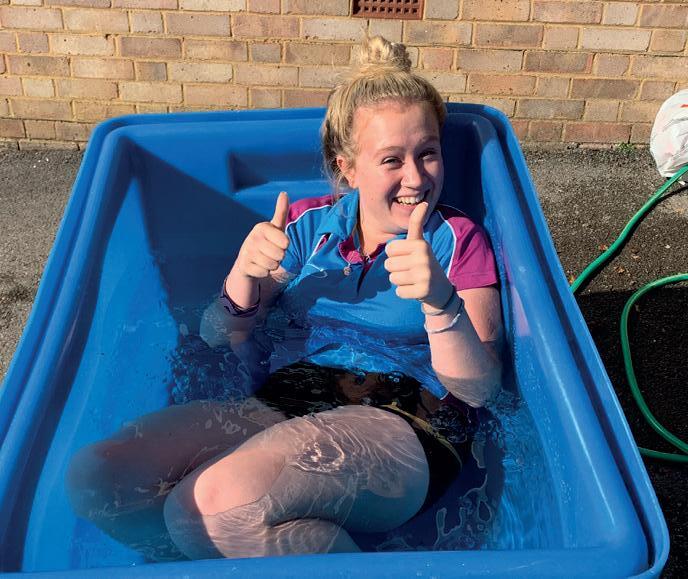
PAPER 1: Factors affecting participation in physical activity and sport
PAPER 2: Factors affecting optimal performance in physical activity and sport
Practical performance in physical activity and sport plus written analysis of strengths and weaknesses in sport.
AQA A LEVEL PE
(Course Code: 7582)

PAPER 1: WRITTEN EXAM
2 HOURS
• 35% of A level
PAPER 2: WRITTEN EXAM
2 HOURS
• 35% of A level
NEA (NON-EXAM ASSESSMENT)

• Internal assessment by teachers
• Externally moderated by AQA
• 30% of A level
A level PE is a great course to study for those wishing to pursue a higher education in sports psychology, physiotherapy, primary and secondary education, marketing, events and travel and tourism. This is not to discourage those that want to take it for enjoyment, as today it is recognised as a very academic course with transferable skills to most university degrees.
“I chose PE because having studied at GCSE it made me realise how interesting the subject is. Th e environment in the classroom is always fun and exciting and throughout my years at Burgess Hill the teachers have made me love the subject even more. Th e practicals in PE have always been the highlight of my week.”
Megan
Physics helps us to understand fully the very nature of the world around us, from the smallest scale deep inside the atom to the largest conceivable distance, stretching across the entire universe. It can allow us to comprehend how the universe came to be, how it operates, and how it might one day end. Physics is a very creative subject that calls for imagination and inventiveness. Einstein developed a reputation for asking awkward questions, and this attribute helped him to become a world-changing physicist.
The study of physics is about making predictions, testing them through observations and measurements and devising theories and laws to make more predictions. Physics students learn the skills of making observations and measurements, and how to use mathematical skills to make sense of experiments. Physicists also learn to communicate knowledge and understanding of the subject effectively, showing a grasp of the subject through effective written and spoken responses.
The A level course contains nine main topics: particles; radiation; materials; waves; mechanics; electricity; thermal physics; fields and nuclear physics. Students start by learning about measurements and the potential for error. They also gain an awareness of the on-going development of new ideas in the subject through the application of indepth knowledge.
Particle physics introduces students to the fundamental properties and nature of matter, radiation and quantum phenomena. Materials are studied in terms of their bulk properties and tensile strength whilst wave characteristics are studied through the work on refraction, diffraction, superposition and interference as well as progressive and stationary waves. The thermal properties of a material and the properties and nature of a gas are studied in detail. nuclear physics studies the nucleus of an atom and how energy can be obtained from it.
In astrophysics, we study how the principles of physics apply to astronomical objects. Fundamental physical principles are applied to the study and interpretation of the universe. Students gain deeper insight into the behaviour of objects at great distances from Earth and discover the ways in which information from these objects can be gathered.
The underlying physical principles of the devices used are covered and some indication is given of the new information gained by the use of radio astronomy. The discovery of exoplanets is an example of the way in which new information is gained by astronomers. Although there is no coursework, practical skills are assessed throughout the course by the subject teacher.
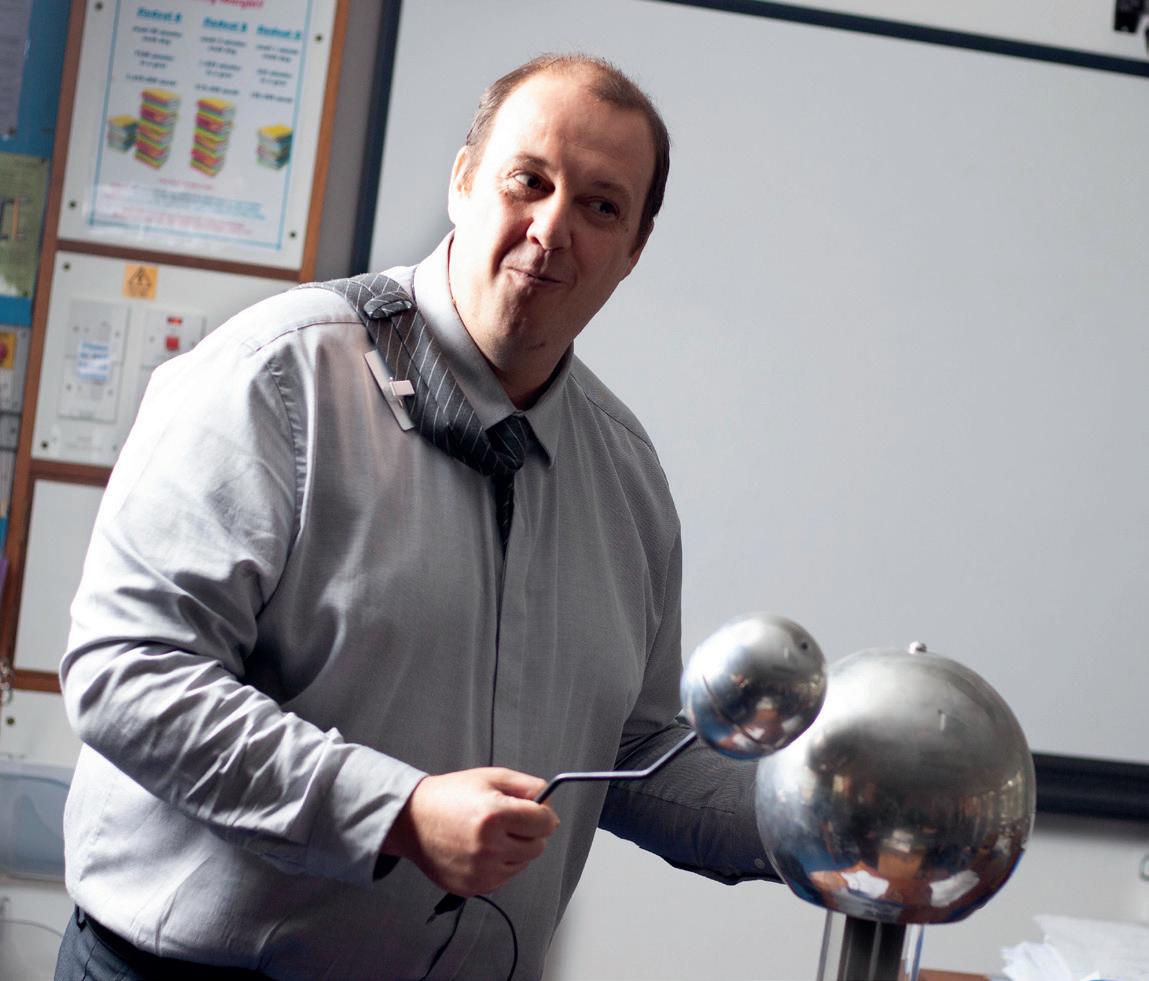
PAPER 1: Sections 1 to 5 and 6.1 (Periodic Motion)
60 marks of short and long answer questions and 25 multiple choice questions on content.
PAPER 2: Sections 6.2 (Thermal Physics), 7 and 8 Assumed knowledge from sections 1 to 6.1
60 marks of short and long answer questions and 25 multiple choice questions on content.
PAPER 3: Section A Compulsory section: Practical skills and data analysis Section B: Students enter for one of sections 9, 10, 11, 12 or 13
45 marks of short and long answer questions on practical experiments and data analysis.
35 marks of short and long answer questions on optional topic.
(Course code: 7408)
PAPER 1: WRITTEN EXAM
2 HOURS
• 85 marks
• 34% of A level
PAPER 2: WRITTEN EXAM
2 HOURS
• 85 marks
• 34% of A level
PAPER 3: WRITTEN EXAM
2 HOURS
• 80 marks
• 32% of A level
This course offers a pathway to many university courses, from broad-based physics courses to more targeted courses which specialise in a particular area of science, for example quantum mechanics or astrophysics. In addition, students who study Physics go on to study engineering or mathematics.
“Physics, as well as being deeply fascinating, also links in well with Mathematics and other science subjects. It opens many doors when applying to university courses, and lessons themselves never fail to entertain.” Mr
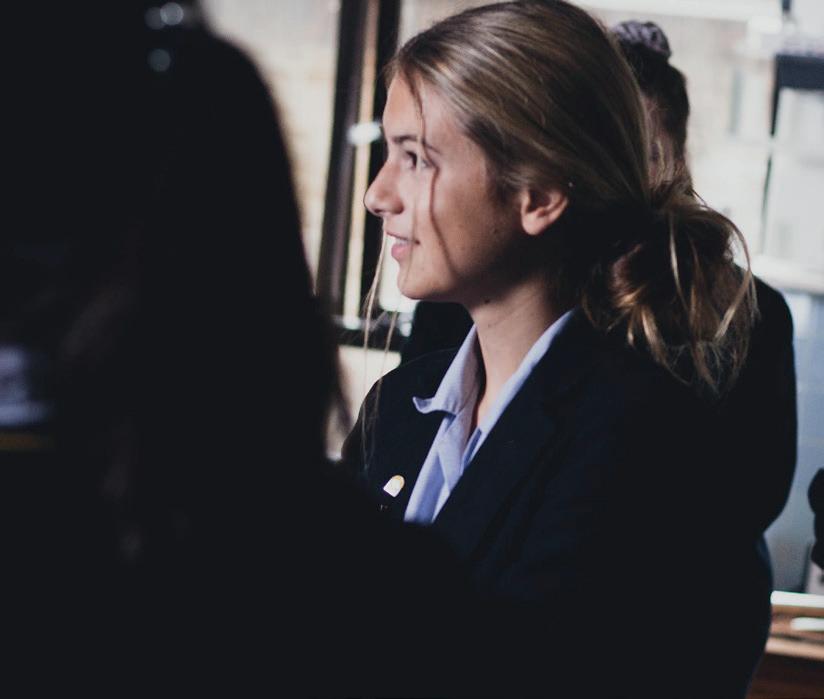
The joy of Politics A level is that it is not a static subject; some ideas and concepts will remain largely the same, but the way in which they are applied to the real world is ever-changing. The course helps students understand and critique UK and world events and provides them with a strong contextual understanding of the world in which they live, preparing them to be truly informed global citizens.
Politics involves studying how we order our society, how we distribute power amongst ourselves, and how we administer order and allow for social change. Politics is not remote from everyday life; it is relevant to almost every aspect of the world around us. It is an excellent choice for anyone who wants to understand how the world works, and how they can change it.
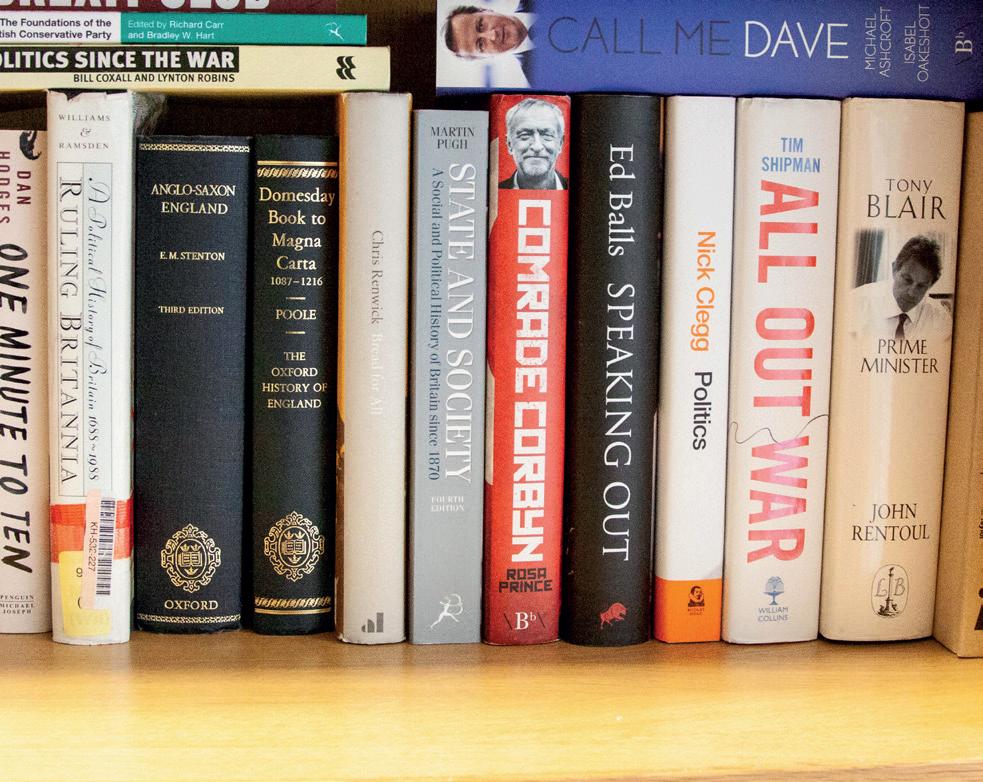
Politics students learn about the processes and institutions at the heart of government and how democratic systems operate. We study electoral systems, political parties, pressure groups and the influence of the media. We look in detail at the relationship between Parliament, the Prime Minister, and the legal system, and study where power effectively lies in the UK. This knowledge provides a springboard for considering key issues such as whether we should change how we run elections in the UK and how well human rights are protected in our constitution.
We also examine the ideologies that define modern political thinking. Through liberalism we study the development of the concept of liberty and how political systems might uphold it. Through conservatism we investigate the relevance of tradition and pragmatism in politics. Through socialism we
consider the capacity of the state to deliver a more equal standard of living for all. Through feminism, we consider the process of female empowerment and how it has been championed and upheld. With each ideology, we study key factions and figures and thus begin to explore the fascinating history of Western political philosophy.
We also study global politics. We investigate where power really lies in global systems and learn about the key institutions of global governance and why states act as they do in the global arena. This provides the knowledge base to consider numerous fascinating areas, including the nature of global order, the effectiveness of the United Nations and NATO, globalisation, global protection of human rights and the effectiveness (or otherwise) of global efforts to combat climate change, to name but a few.
Politics involves many contentious issues, and being able to develop and defend a point of view, while demonstrating understanding of opposing perspectives will be a key skill we develop. Students will learn about, analyse and evaluate different arguments in each of the themes we study as well as presenting their own views and conclusions.
Ms Flatman - Head of Economics, Politics and Business“There is no A level with a greater capacity to provide students with an understanding of the world around them. Students face fundamental questions about identity, conflict, ethics and power every day – with Politics A level, they can answer them.”
How democracy operates in Britain. Core potential ideas: Liberalism, Conservatism and Socialism.

How Britain’s institutions of government function Political Ideas: Feminism and the feminist movement

How politics operates globally. Political Ideas: Realism and Liberalism in the global context.
EDEXCEL
“Th rough Politics I’ve been able to understand my place in the world, how I can have infl uence, and what my values are.” Natasha
There is no limit to where Politics can take you. Students of the subject may find their future in government, law, the civil service, journalism, banking and finance.
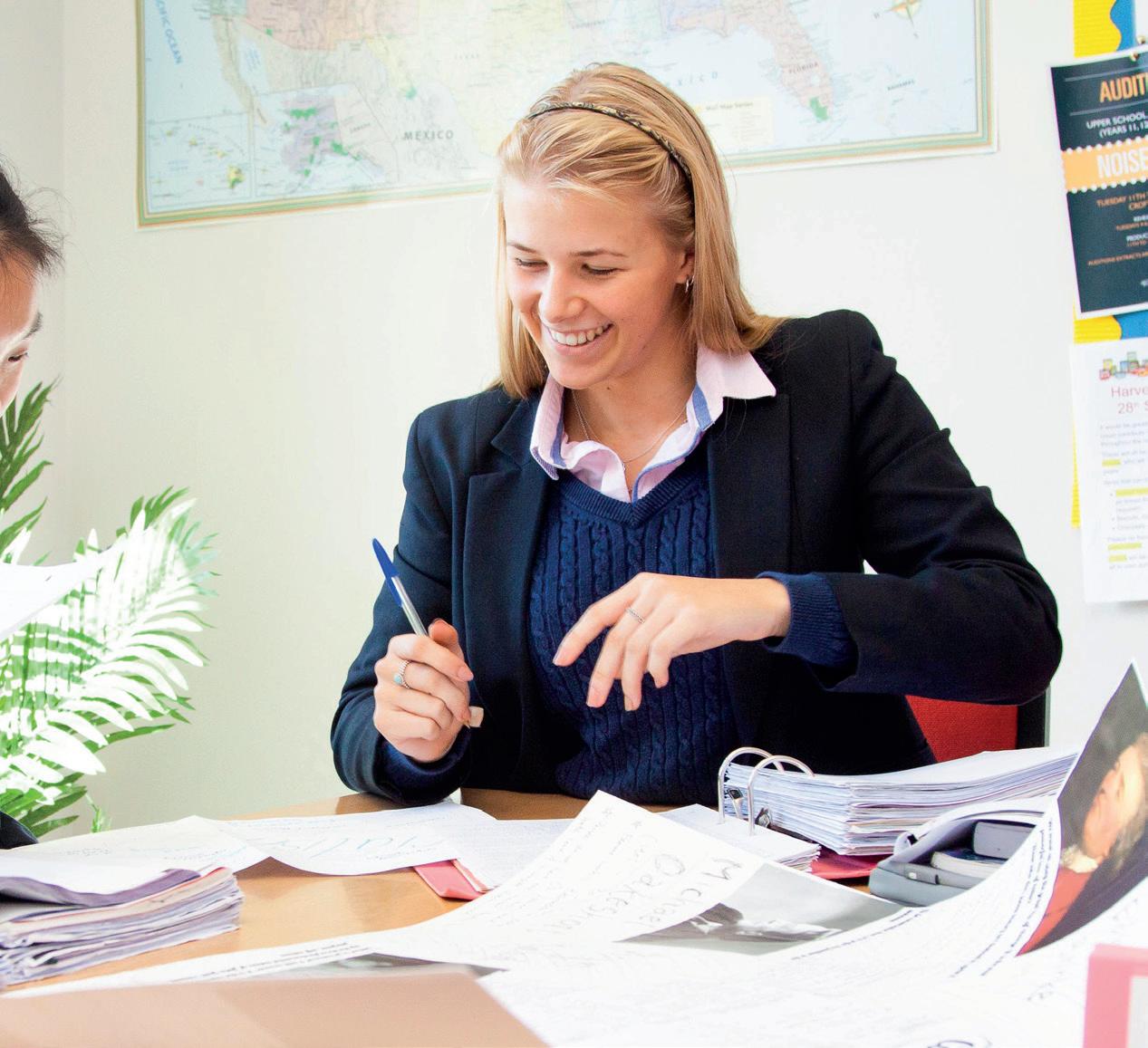
As the study of mind and behaviour, Psychology encompasses everything that is human. Whether it is how faulty neurotransmitter activity might cause schizophrenia or how the individual develops their gender identity, psychologists have attempted to analyse and explain behaviour using a variety of research methods. It is the only subject to study and assess the credibility of a range of research methods and students learn to collect and analyse all types of quantitative and qualitative data. A full understanding of the British Psychological Society ethical guidelines is also covered.
Students develop their thinking skills and learn to ‘analyse like a scientist and argue like a lawyer’. They explore tried and tested theories of behaviour such as the processes of classical and operant conditioning and the ideas of Sigmund Freud right up to current scientific understanding of brain function and neural plasticity using advanced imaging techniques.
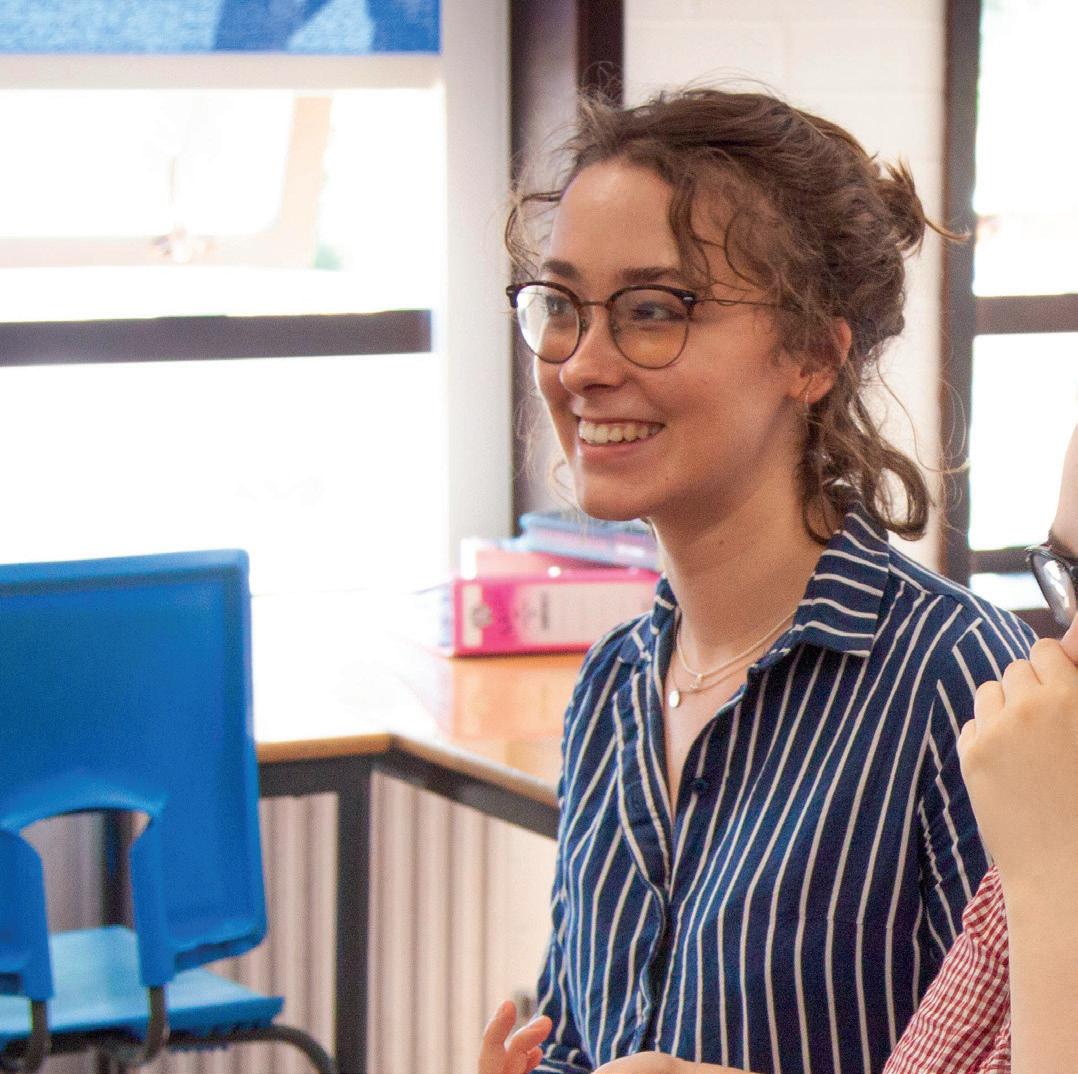
The AQA course followed includes a full range of topics, mirroring first year undergraduate study, including the causes and treatments of mental illness, explanations of memory and forgetting including the fallibility of eyewitness testimony. Why we conform and what makes us capable of resisting social pressure are two particularly popular topics. Whilst this is an A level of academic rigour, its applicability to real life makes every aspect of the course relevant, accessible and useful.
For those who want to understand how humans work, develop their ability to think independently and become adept at analysing any type of data, Psychology is the right choice. Exciting, challenging and fundamentally important, this is a subject worth studying.
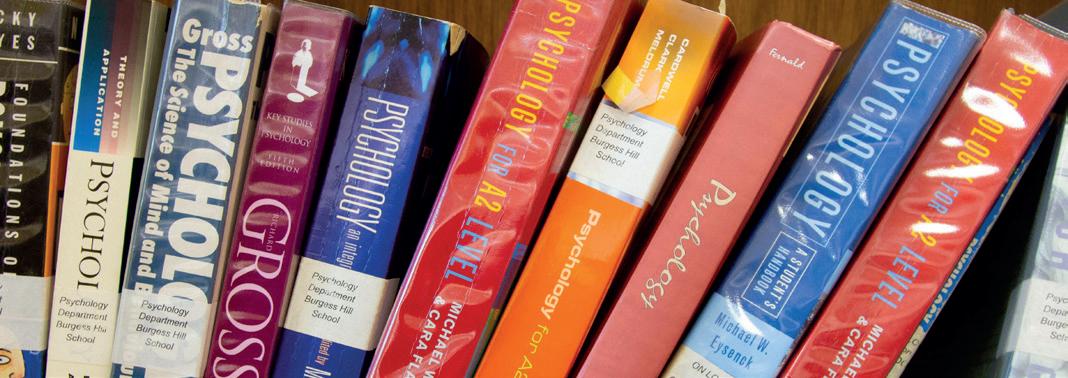
“The variety of interesting topics included in the syllabus makes Psychology stand out as an A level. Everything I learn can be applied to the real world and makes my studies seem valuable beyond gaining a qualification. ”
Georgie
PAPER 1:
‘Introductory topics in Psychology’ covers four of the most intriguing areas of the subject: attachment, social influence, memory and psychopathology.

PAPER 2:
‘Psychology in context’ demonstrates how psychologists hold different views as to how to study behaviour in the ‘Approaches’ section, focuses on the most prominent paradigm in modern psychology - biopsychology - and also introduces students to the range of research methods and techniques psychologists use.
PAPER 3:
‘Issues and options’ is partly synoptic and covers the issues psychologists have to consider when completing research. These include cultural bias and ethics. Students also study three elective units, forensic psychology, gender development and schizophrenia.
(Course code: 7182)

PAPER 1: WRITTEN EXAM
2 HOURS
• Closed book
• 96 marks
• 33% of A level
PAPER 2: WRITTEN EXAM
2 HOURS
• Closed book
• 96 marks
• 33% of A level
PAPER 3: WRITTEN EXAM
2 HOURS
• Closed book
• 96 marks
• 33% of A level
Whether a student is looking for a career in medicine, business or sport, neuroscience or psychology itself, studying Psychology develops a range of skills that are relevant to many degree courses and careers.
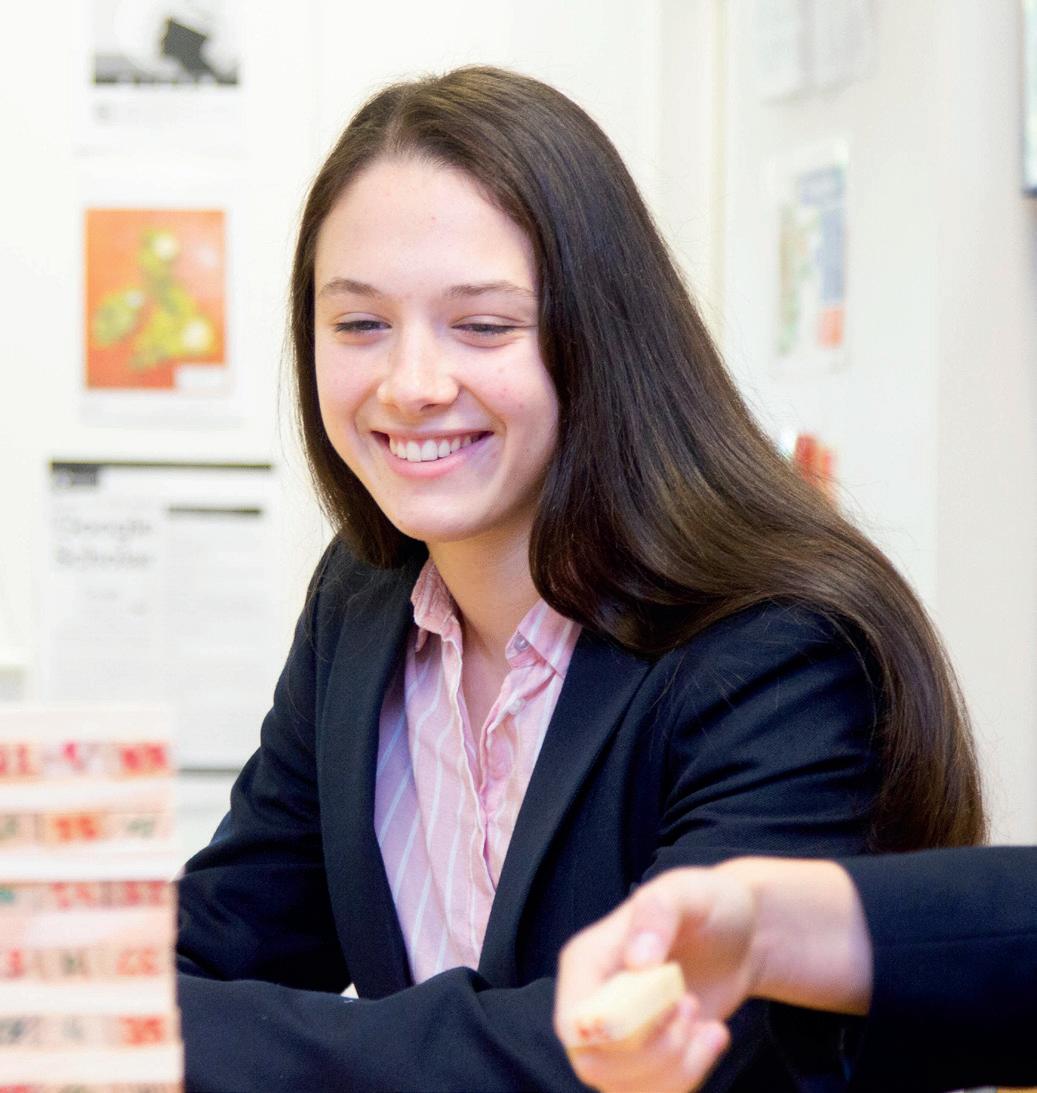
Religious Studies A level is perfect for any student fascinated by big ideas, by the way people’s beliefs influence the way they live, or by sacred texts and their interpretation. Ideas, texts, beliefs and actions are at the heart of Religious Studies. It offers a wide and challenging syllabus that engages both the intellect and the emotions. It allows students to study different religions, and ensures that they have a thorough understanding of diverse philosophical and ethical viewpoints.
The course allows students to investigate ultimate questions such as “why does evil exist?” and “what is the purpose of life?”, and study topics that explain the diversity of life and religion in the modern world. Students will improve their philosophical thinking skills and their capacity to understand and evaluate contemporary ethical and religious issues such as medical ethics and religious fundamentalism. All will develop communication skills and learn to clearly express their views, building their self-confidence.
The course allows students to find answers for themselves, ensuring that they develop critical thinking skills, learn how to debate, assess the reliability of evidence and most importantly develop arguments using well-reasoned explanations. It fascinates and informs in equal measure, and offers exceptional preparation for later life.
The course covers philosophy of religion, ethics and dialogues between Christianity and Philosophy. Students intellectually engage with topics such as proofs for the existence of God, various ethical theories and discussions of modern ethical dilemmas such as embryology, genetic engineering and weapons of mass destruction. In the ‘dialogues with religion’ paper, there are discussions of religious attitudes to gender and sexuality and the impact of the diversity of faiths in Britain.
Through Religious Studies, students will gain the critical and evaluative skills sought by both higher education providers and employers – particularly in areas such as law, education, social work, finance, politics, medicine, administration and the media. Leading universities have made it clear that A level RS provides the necessary skills for preparation for university. Both Oxford and Cambridge University include Religious Studies in the top level list of ‘generally suitable arts A levels.’ For these reasons, it is one of the fastest growing subjects at A level.
Religious Studies provides students with the opportunity to open their mind to new ideas, helping them to see the world in a new and exciting way.
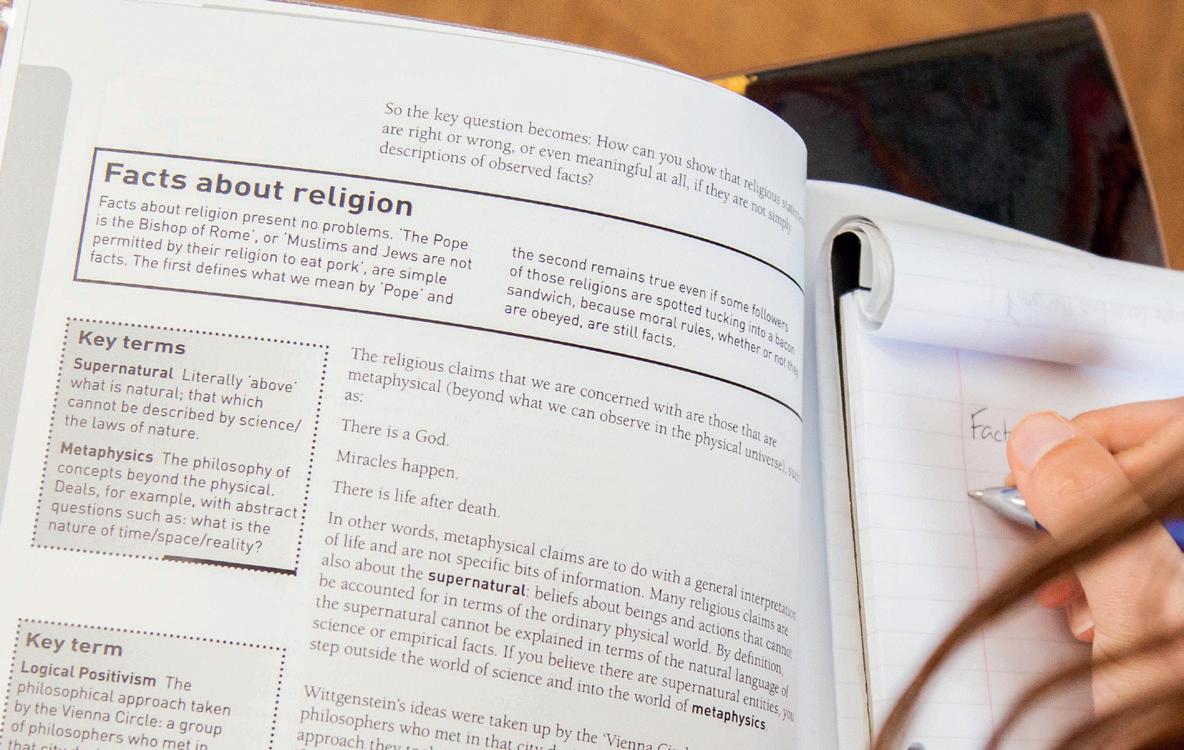
“Through discussion of topical ethical issues and thoughtprovoking religious debates, Religious Studies seeks to inspire to consider the world from new and different perspectives. ”
PAPER 1: Philosophy of Religion and Ethics
Section A: Philosophy of religion
• Arguments for the existence of God
• Evil and suffering
• Religious experience
• Religious language
• Miracles
• Self and life after death
Section B: Ethics and religion
• Ethical theories
• Issues of human life and death
• Issues of animal life and death
• Introduction to meta ethics
• Free will and moral responsibility
• Conscience
• Bentham and Kant
PAPER 2: Study of Religion and Dialogues
Section A: Study of religion (Christianity):
• Sources of wisdom and authority
• God/gods/ultimate reality
• Self, death and the afterlife
• Good conduct and key moral principles
• Expression of religious identity
• Religion, gender and sexuality
• Religion and science
• Religion and secularisation
• Religion and religious pluralism
Section B: The dialogue between philosophy of religion and religion:
How religion is influenced by, and has an influence on philosophy of religion in relation to the issues studied.
Section C: The dialogue between ethical studies and religion:
How religion is influenced by, and has an influence on ethical studies in relation to the issues studied.
AQA A LEVEL RELIGIOUS STUDIES
(Course code: 9PL0)


PAPER 1: WRITTEN EXAM
3 HOURS
• 50% of A level
• 100 marks
PAPER 2: WRITTEN EXAM
3 HOURS
• 50% of A level
• 100 marks
Conference on the topics studied hosted by top Philosophers in the country
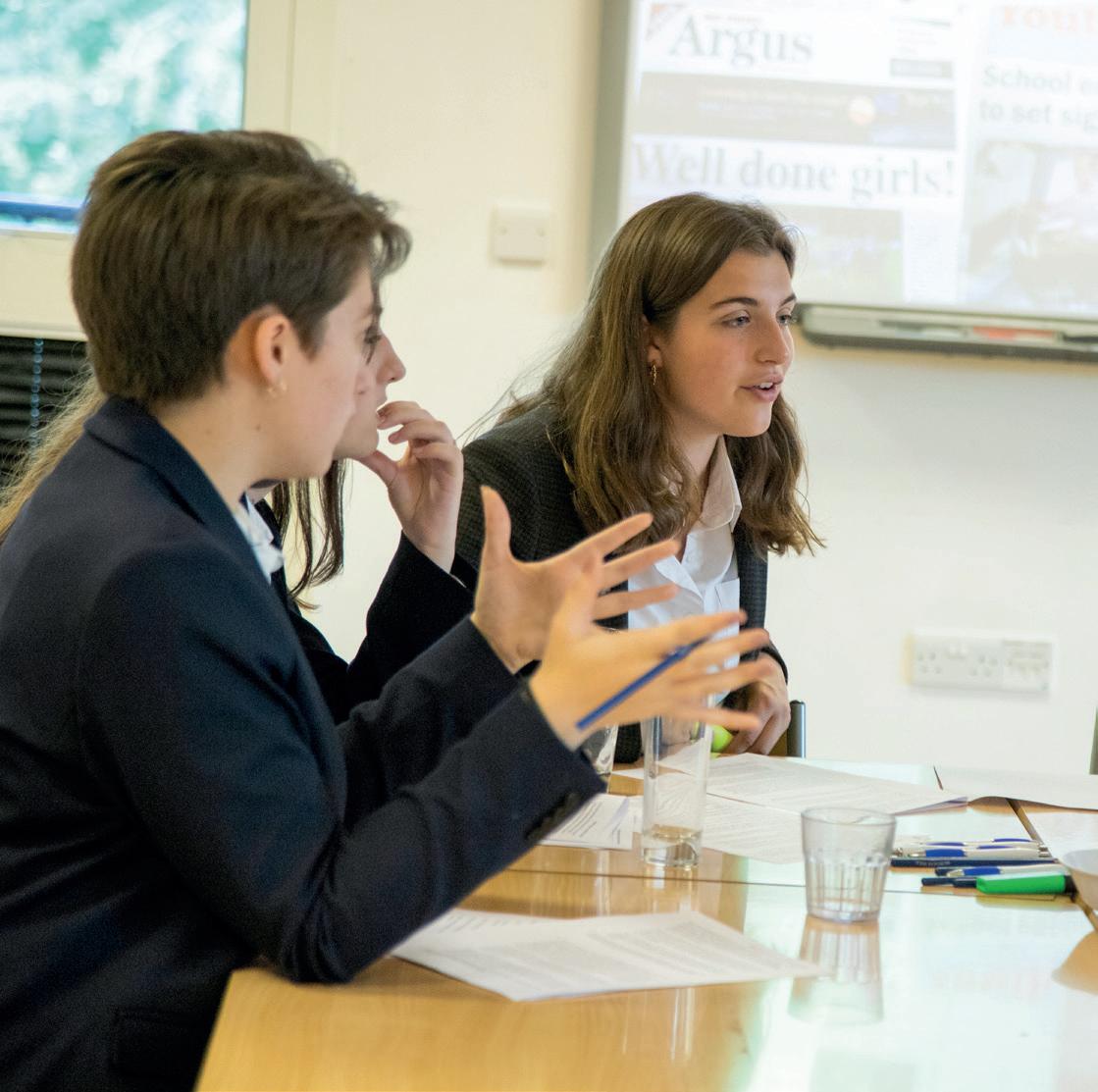
Spanish is the second most spoken language by native speakers in the world, with more than 400 million Spanish speakers in 21 countries, and the British Council has recently ranked Spanish as the most important language British students should learn. With an ever-increasing presence in the global market, emerging economies in the Americas mean that the chance of work and business opportunities from the Spanish-speaking world continue to multiply.
In cultural terms, being able to communicate and understand Spanish opens up a whole world of artistic and literary excellence. Artists such as Salvador Dali, Pablo Picasso, Fernando Botero and Frida Kahlo have produced some of the most famous pieces of artwork in the modern era. Writers from Cervantes to Vargas Llosa and García Márquez have enriched global literature, and a total of 11 Spanishspeaking writers have won the Nobel prize for Literature: five from Spain and six from Latin America. For these reasons, and many others, learning Spanish at A level is an immensely valuable and attractive option.
At Burgess Hill Girls, Spanish is taught by native speakers and by bilingual staff whose knowledge of Spanish far exceeds the level normally required for teaching at A level. The combined experiences give students an exceptional preparation for the varieties of Spanish. The department is familiar not only with Castilian Spanish, but also Latin American varieties: our students know they won’t get red wine when they order ‘tinto’ in Colombia!
In the A level, the study of the language is augmented with a look at Spanish literature, society, and history. Appreciating the forces behind the Spanish Civil War, for instance, gives students wider insights into twentieth century history and political systems, which is key to understand the current trends in the Hispanic world. The A level also provides
excellent essay-writing skills that help students to excel at university across the humanities and social sciences.
A level students benefit from the use of the modern language lab, which allows several students to talk and interact at the same time, with teachers recording all these interventions. Such technology reinforces the school approach to learning, which focuses on the individual needs of each student. A level students take part in regular speaking sessions with our Spanish language assistant, and engage with activities outside of class, such as ‘café español’, where students discuss the issues they are more passionate about, such as independence movements in Catalonia, or economic mismanagement in Madrid.
A level students also take part in a Spanish language immersion trip to Puerto de Santa María on the Bay of Cádiz. During the stay the girls attend Spanish lessons in the morning and take part in excursions and activities in the afternoon, which helps students improve both their language skills and their cultural knowledge of Spain.
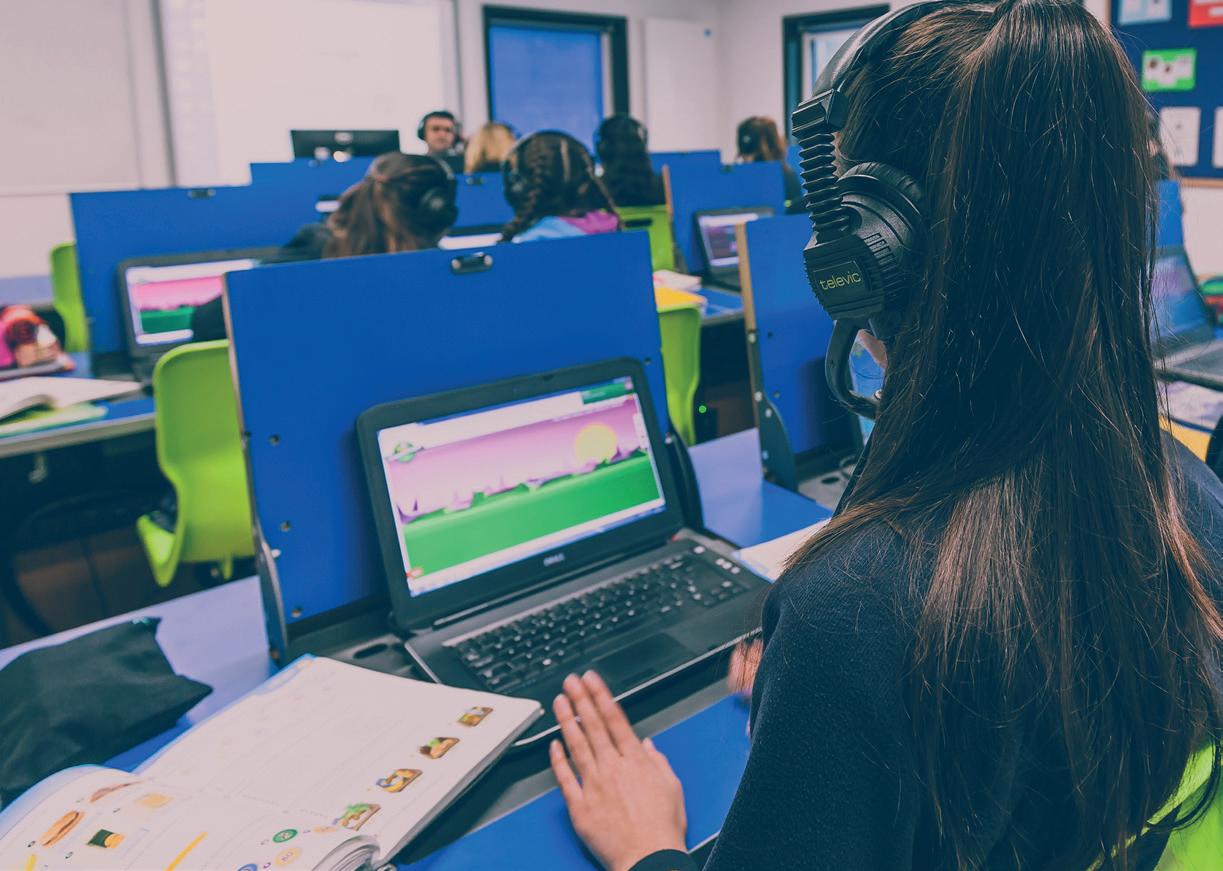
“I never thought of being capable of doing a foreign language at A level. Spanish at Burgess Hill has built my confidence and inspired me to continue to study the language at university. ”
THEME 1: Aspects of Hispanic society: current trends
• Modern and traditional values
• Cyberspace
• Equal rights
THEME 2: Artistic culture in the Hispanic world
• Modern day idols
• Spanish regional identity
• Cultural heritage
THEME 3: Multiculturalism in Hispanic society
• Immigration
• Racism
• Integration
THEME 4: Aspects of political life in the Hispanic world
• Today’s youth, tomorrow’s citizens
• Monarchies and dictatorships
• Popular movements

Literary text: Crónica de una muerte anunciada, by Gabriel García Márquez
Film: Volver, by Pedro Almodóvar
(Course code: 7692)
PAPER 1: LISTENING, READING AND WRITING
2 HOURS 30 MINUTES
• Four themes and grammar
• 100 marks
• 50% of A level
PAPER 2: WRITING
2 HOURS
• One text and one film, and grammar

• 80 marks
• 20% of A level
PAPER 3: SPEAKING
21-23 MINUTES
• Individual research project and one theme
• 60 marks
• 30% of A level
Students of Spanish have the opportunity to expand their knowledge at university in courses that range from language and literature, to international relations and Spanish. Their career paths go beyond becoming language teachers or translators, as Spanish graduates are also in demand in business roles, in areas such as marketing and PR, where communication and language skills are highly valued.
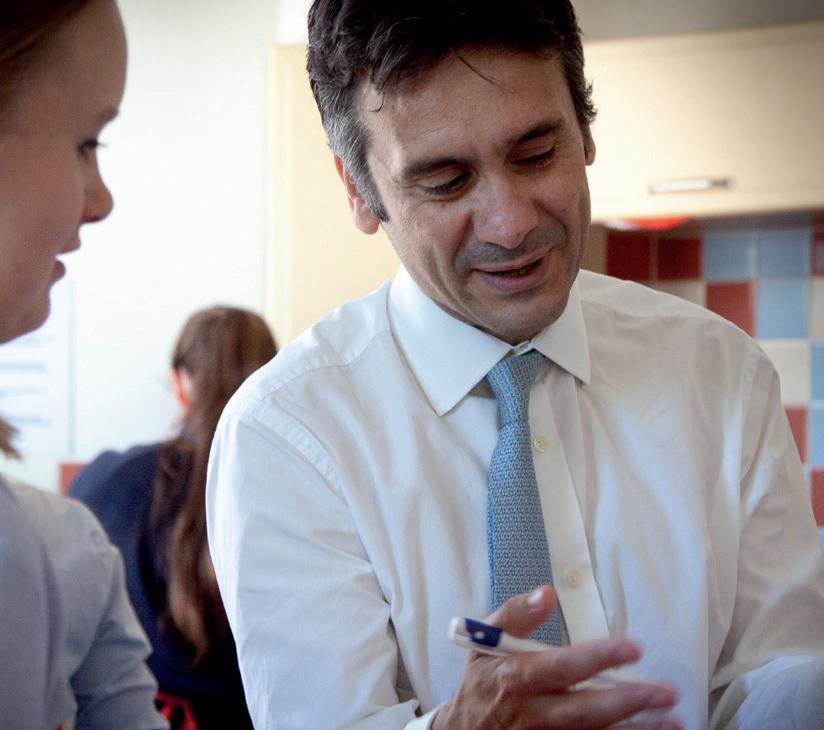
Textile Design at A Level provides an engaging and innovative creative learning experiences, where art, craft and design practice is meaningfully integrated with theoretical knowledge and understanding.
Students engage with traditional practices such as observational drawing, pattern cutting, fabric & garment construction and printing, as well as new methods with Adobe Illustrator and Photoshop for computer-aided design and manufacture.
The work is inspired by contemporary artists and designers, with at least one practitioner visiting the school a year, and enlivened with trips to events such as Graduate Fashion Week. Pupil work is regularly awarded prizes at national art and design competitions. The small group size ensures plenty of individual attention and guidance to help develop personal interests and projects.
Students are given a range of start points throughout Year 12 in order to develop their portfolio skills, which allows them to explore a wide range of different disciplines including, but not exclusive to, drawing, photography, digital design, surface embellishment, fashion drawing and garment construction.
In the second year they will work more independently on two practical projects, one of which includes an essay. Students are encouraged to work independently on self-directed tasks and to encourage flexibility in their approach to Textiles.
Britain’s thriving fashion industry is estimated to support 797,000 employees, is worth an estimated £3.2bn a year and is one of the UK’s most sought-after exports. Creative industries as a whole are reported to be growing at a rate of nearly 9 per cent each year, nearly double that of the UK economy as a whole. A level Fashion and Textiles supports the growth of this industry, with applications to top creative universities supported and encouraged. In short Fashion and Textiles is a hugely exciting A level subject that opens up a variety of different career pathways.
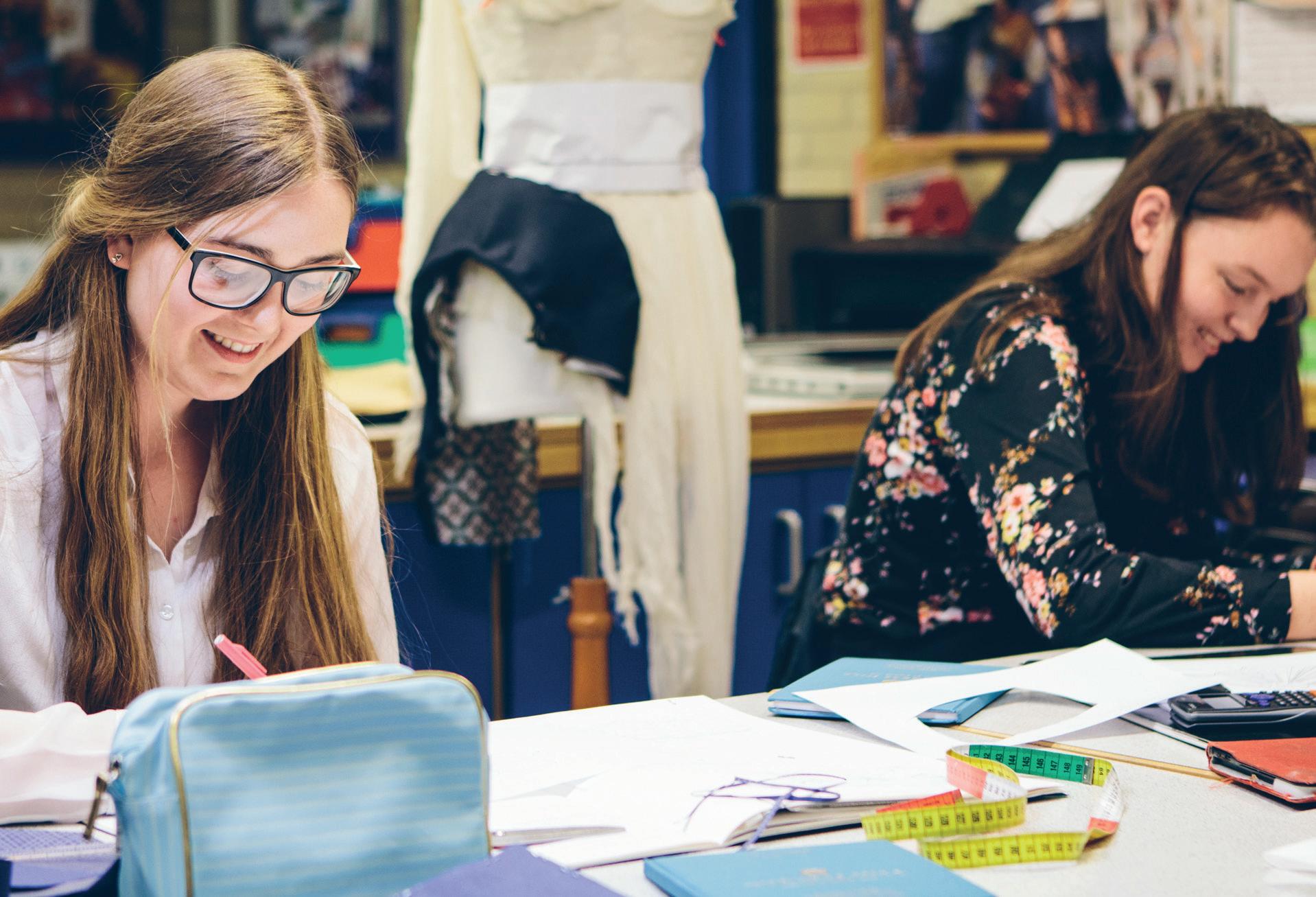
“I can be more independent and develop my own creativity, as well as exploring the practical applications within the fashion industry. We are really encouraged to push our boundaries to the limit.”
Bridget
SCHEME OF ASSESSMENT
COMPONENT 1: PERSONAL INVESTIGATION
Consists of two integrated constituent parts:
1. Investigative project and portfolio
2. An extended written element of 1000 words minimum
Component 1 gives opportunities for students to explore and cultivate fundamental skills, knowledge and understanding through a variety of experiences. These may include using sources, such as the local environment, gallery visits, workshops or other resources, to gather visually rich research which supports in-depth investigations.
COMPONENT 2: EXTERNALLY SET ASSIGNMENT
Consists of two parts:

• Part 1: Preparatory study period
• Part 2: 15-hour period of sustained focus work
This component represents the culmination of students’ A level study and provides a substantial challenge. Students develop a personal response to one of a varied range of stimuli within specified time constraints.
EDUQAS A LEVEL ART AND DESIGN:
TEXTILE DESIGN
(Course code: A653QS)
COMPONENT 1: PERSONAL INVESTIGATION
• 60% of A level
• Internally assessed
• Externally moderated
COMPONENT 2: EXTERNALLY SET ASSIGNMENT
15 HOURS
• 40% of A level
• Internally assessed
• Externally moderated
NEA (NON-EXAM ASSESSMENT)
• 100 marks
• 50% of A level
• Evidence required: written or digital design portfolio and photographic evidence of final prototype.

• Assessed by teachers
• Moderated by AQA
Students go on to take up places on a variety of creative courses at London College of Fashion, Art Foundation, Central Saint Martins and Falmouth University.
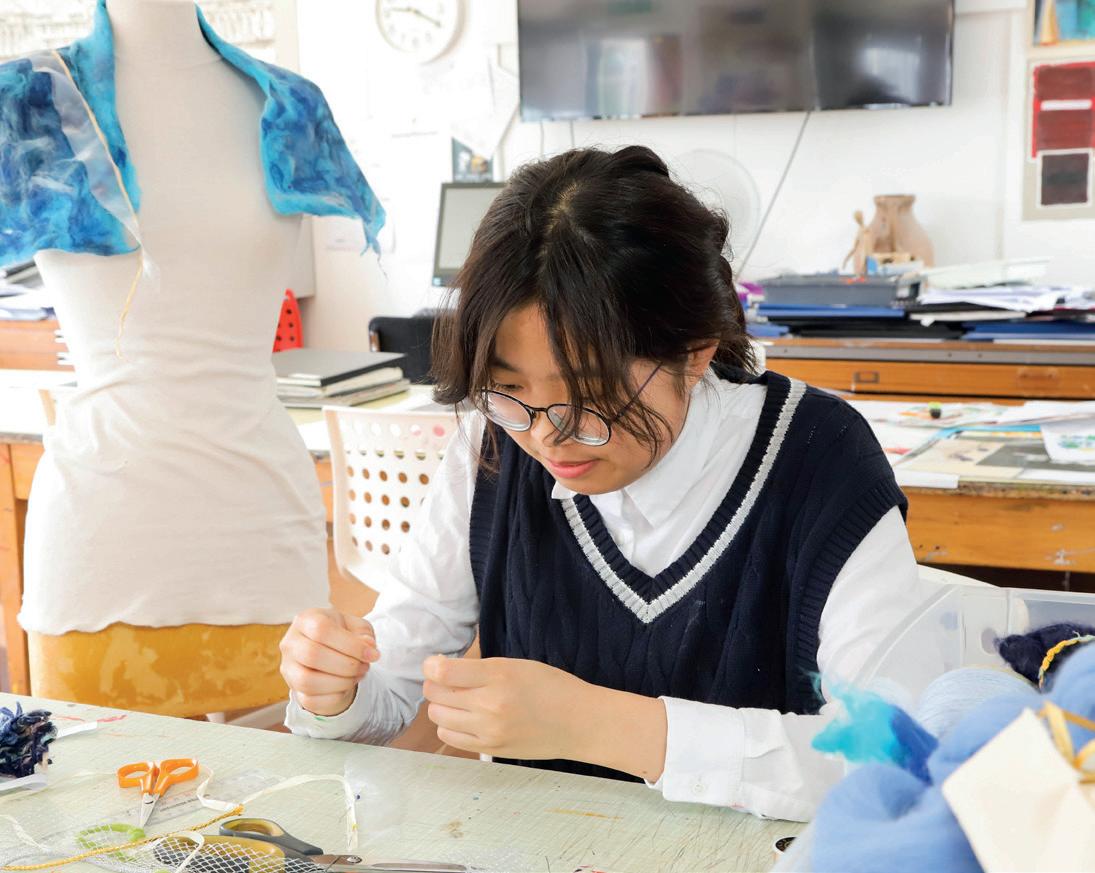
Wool4School and Young Craftsman of the Year competions
Mentoring younger students
